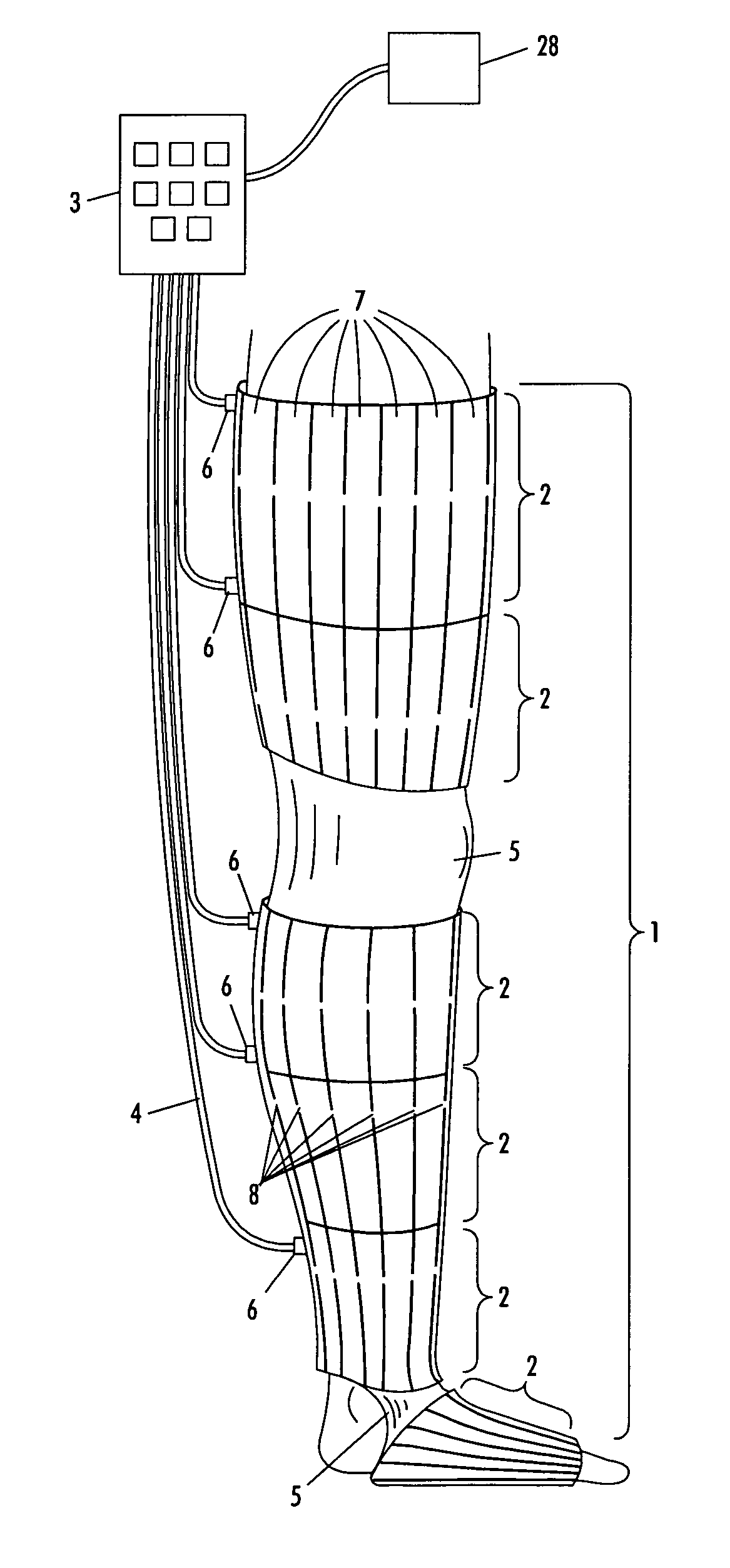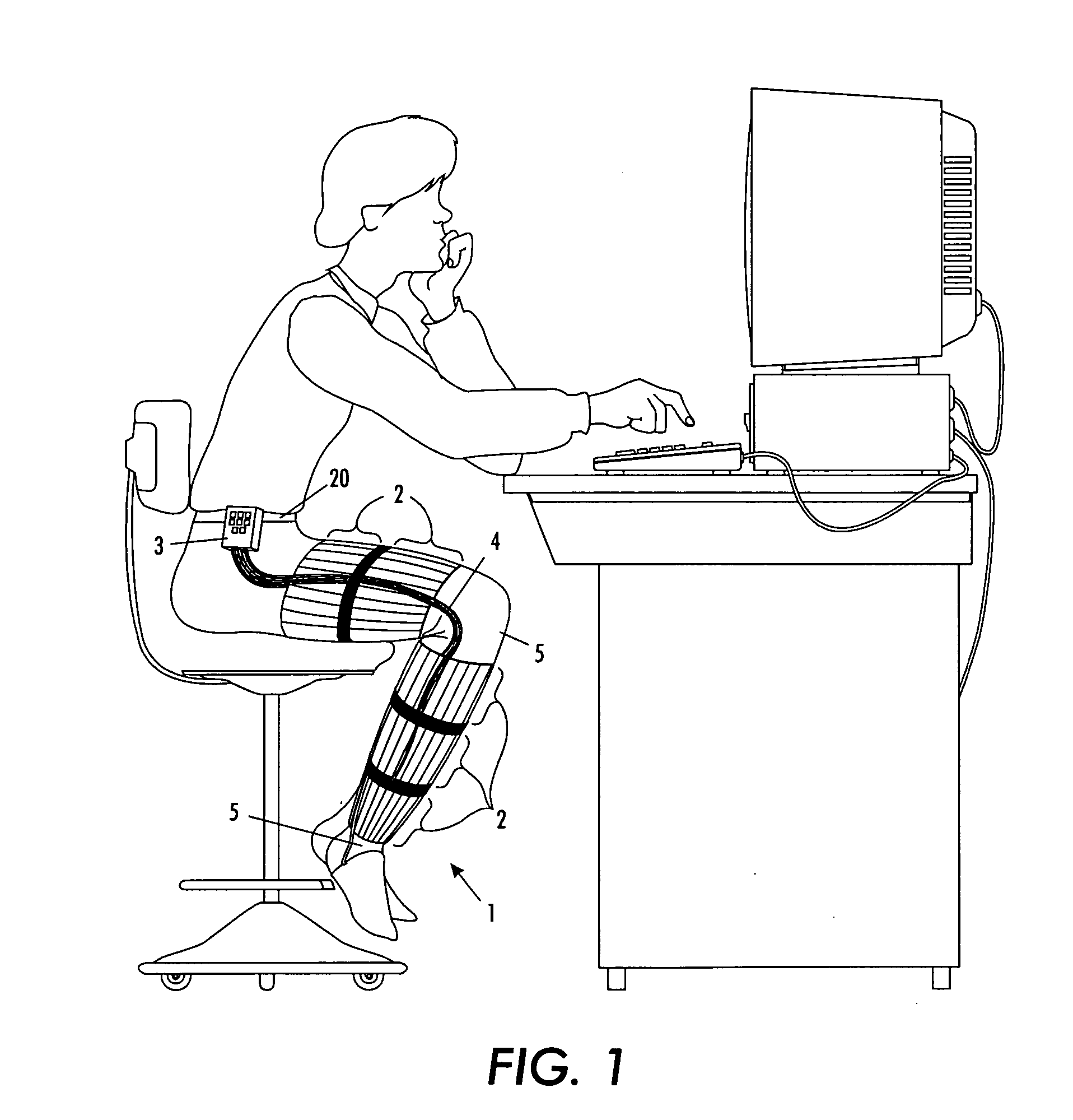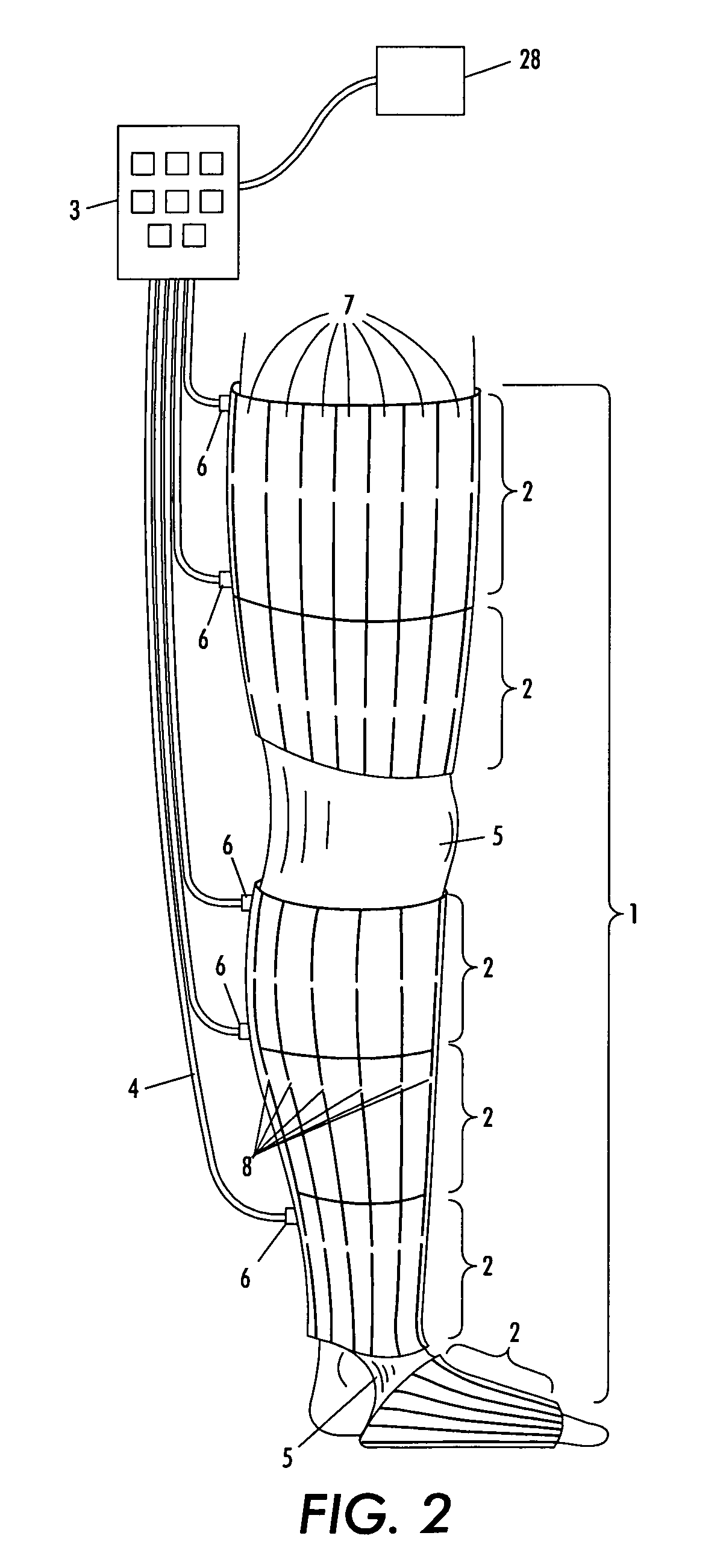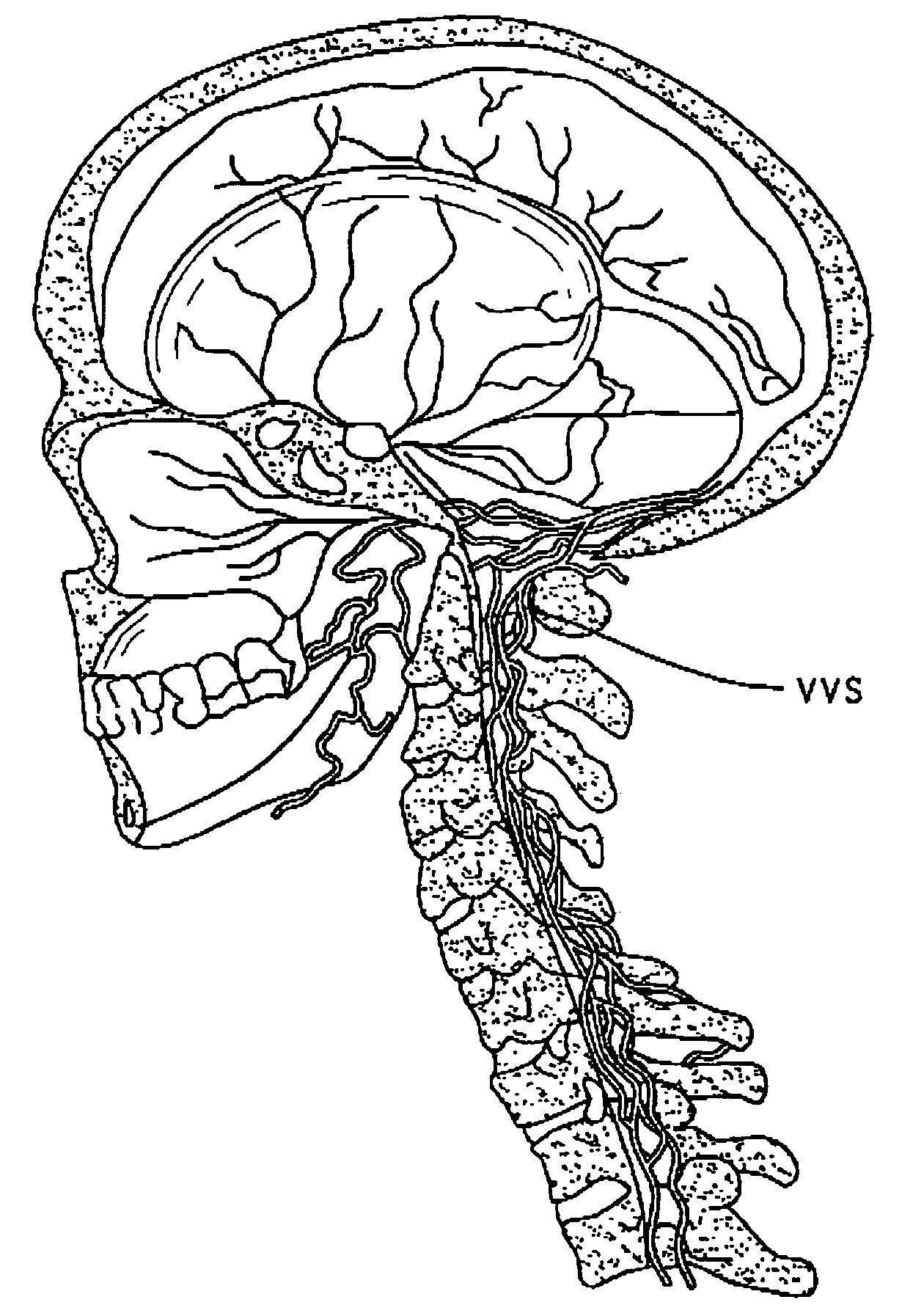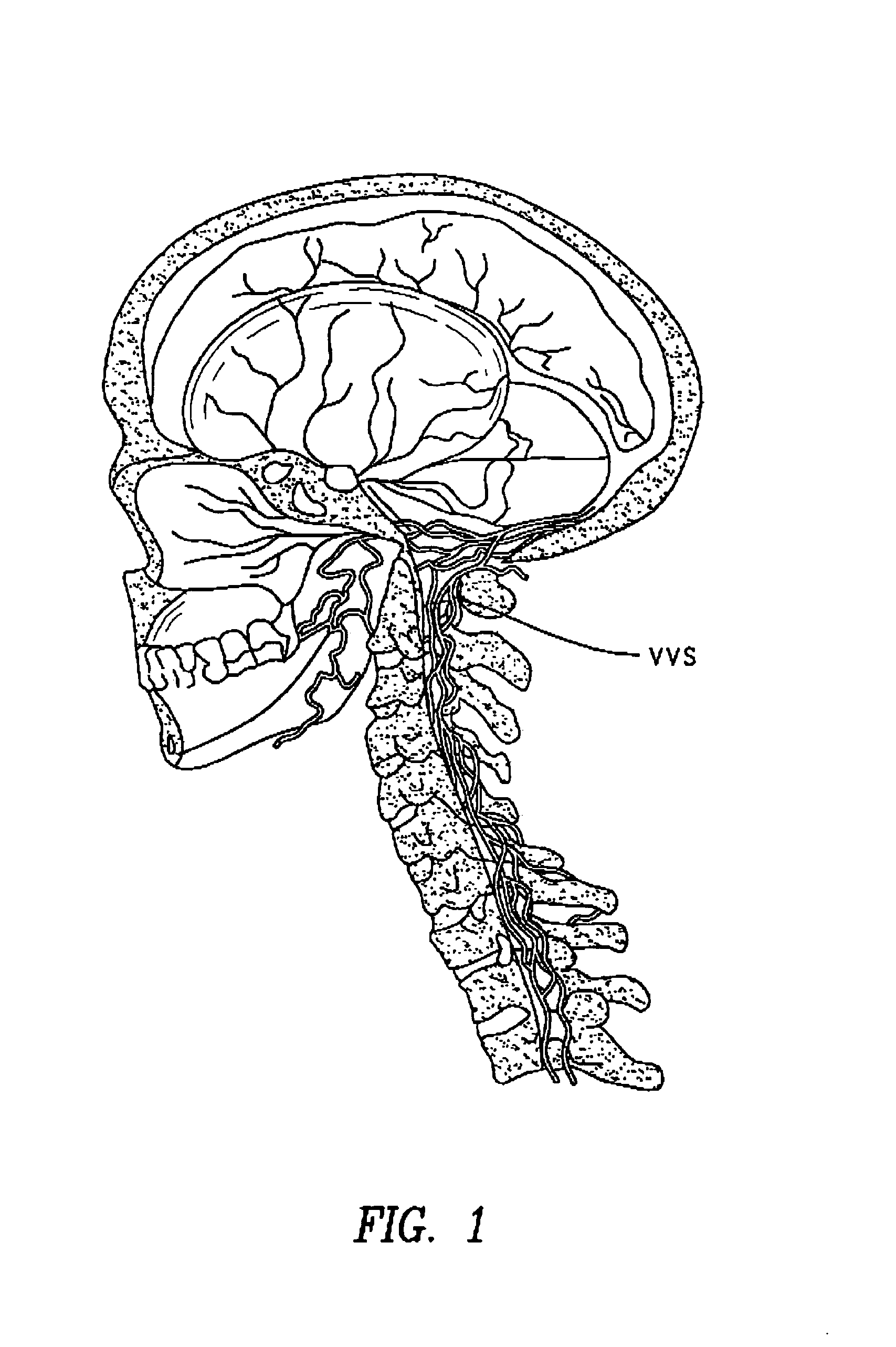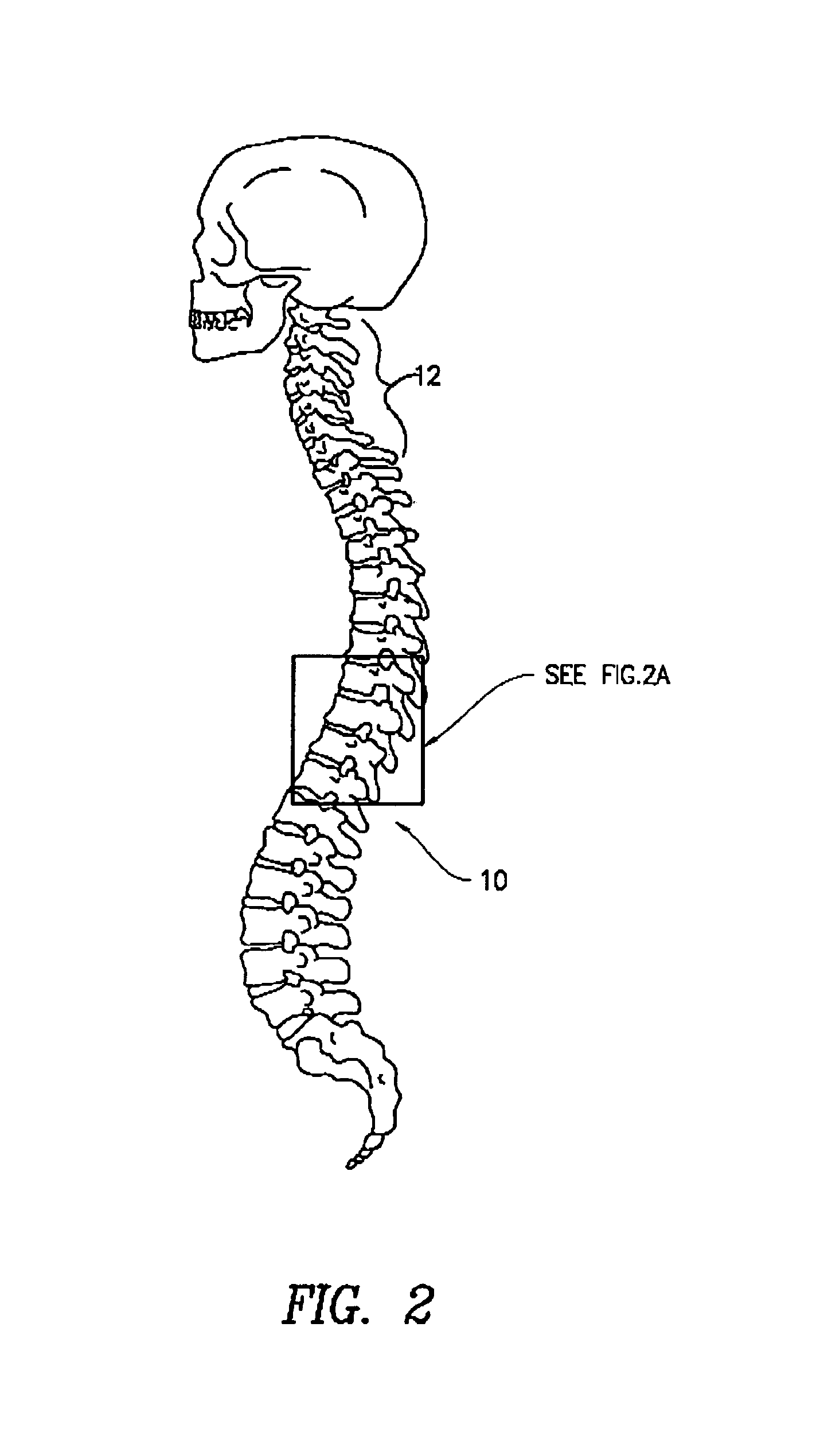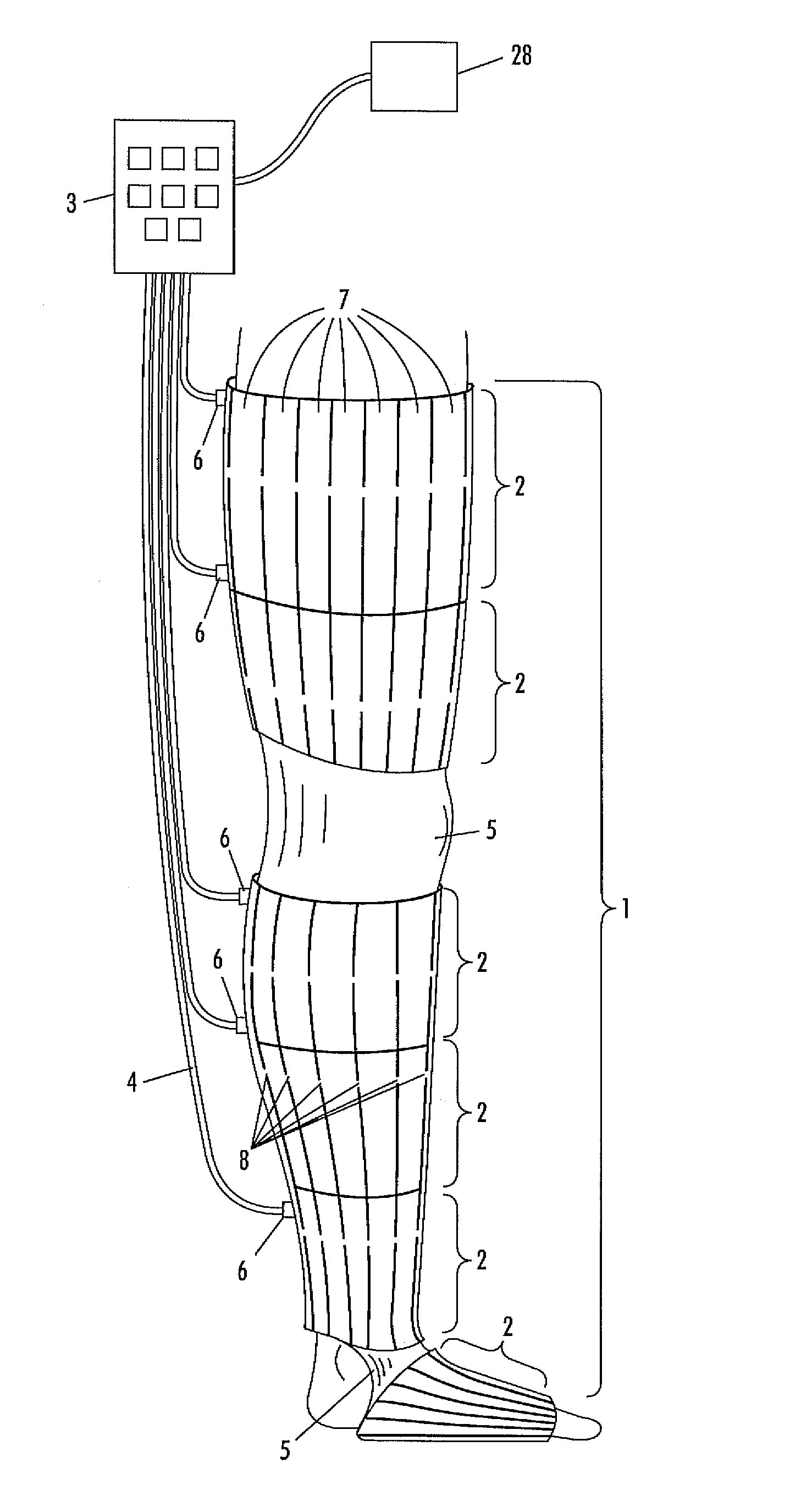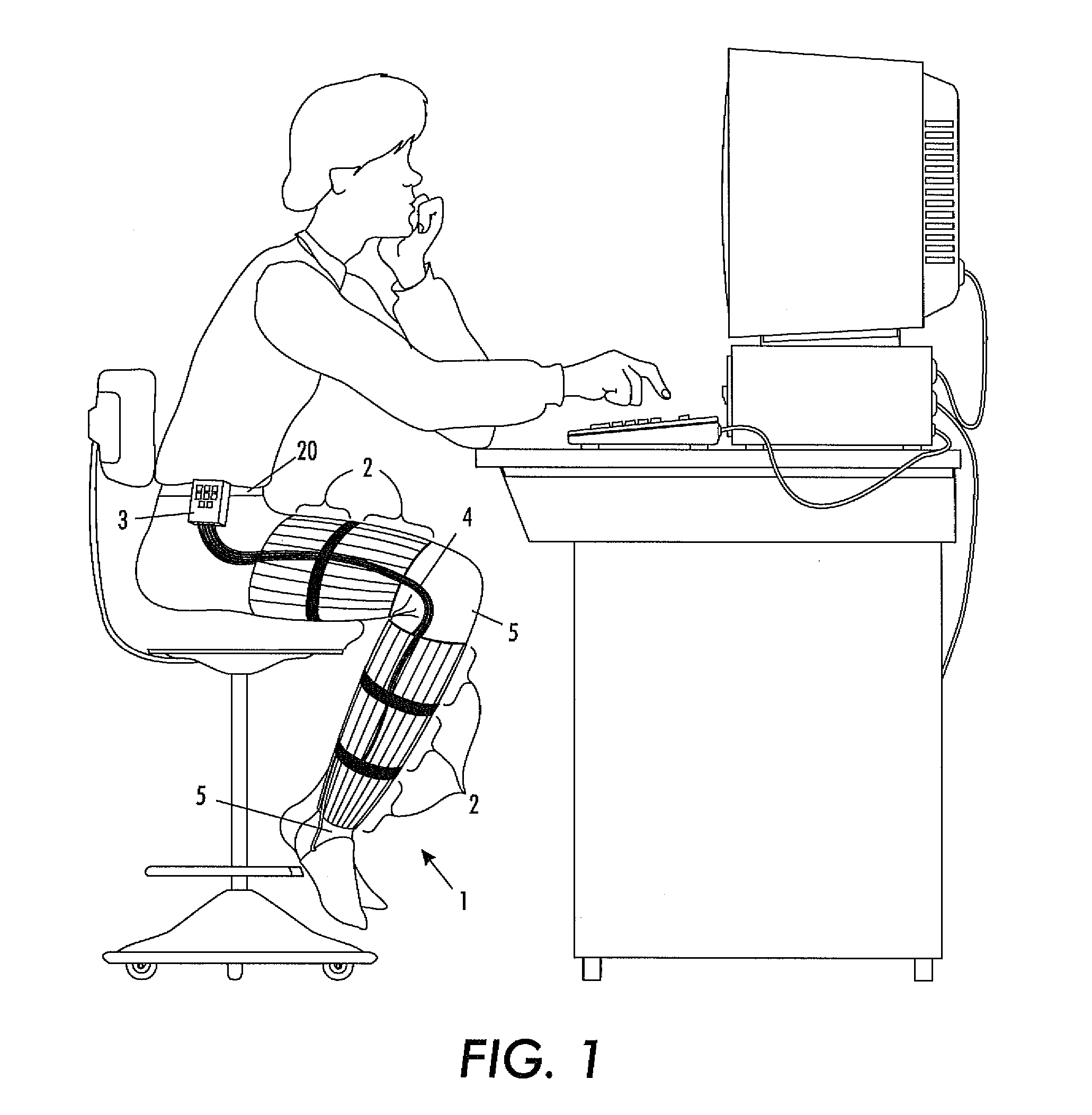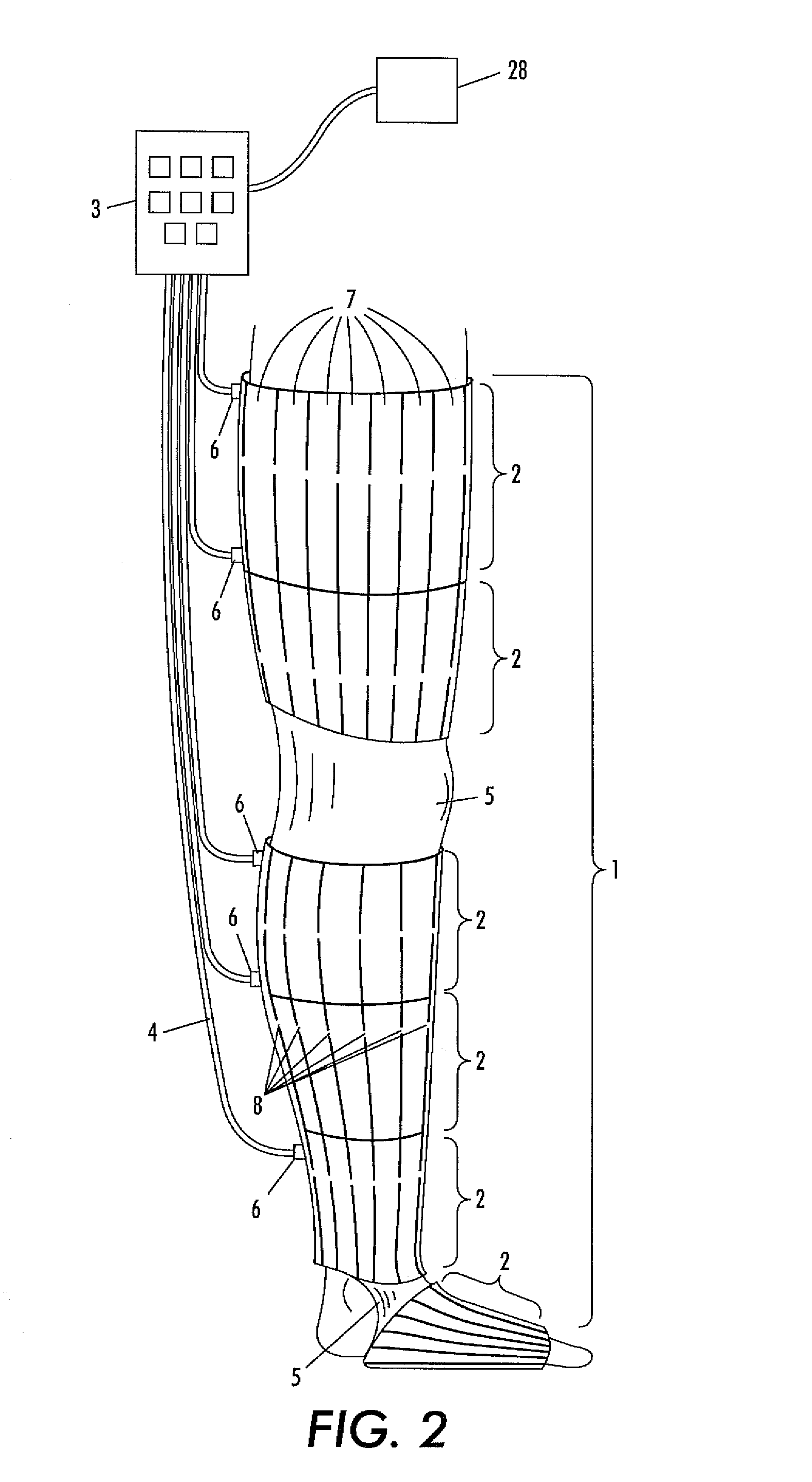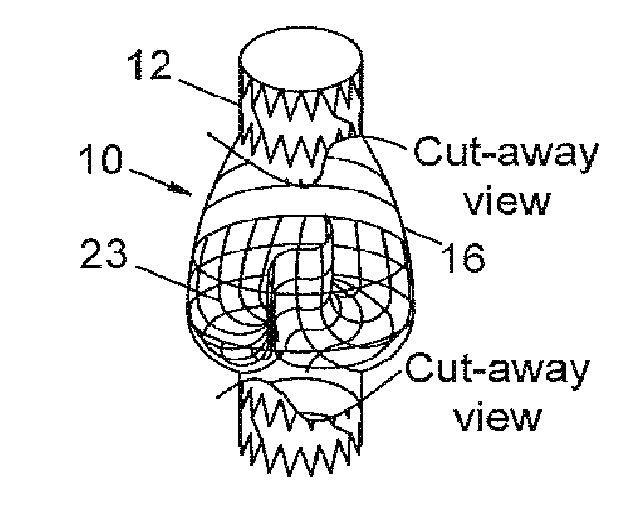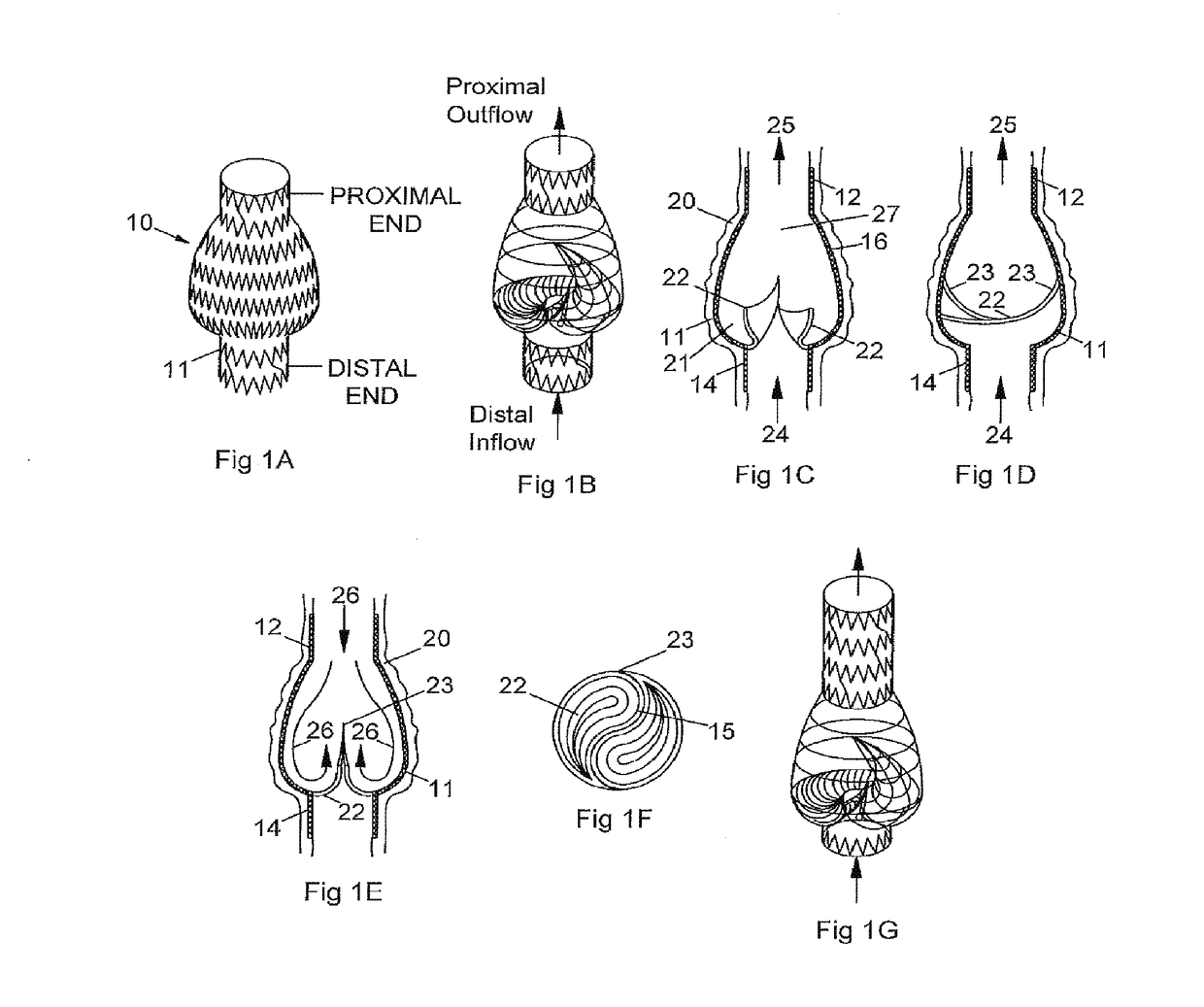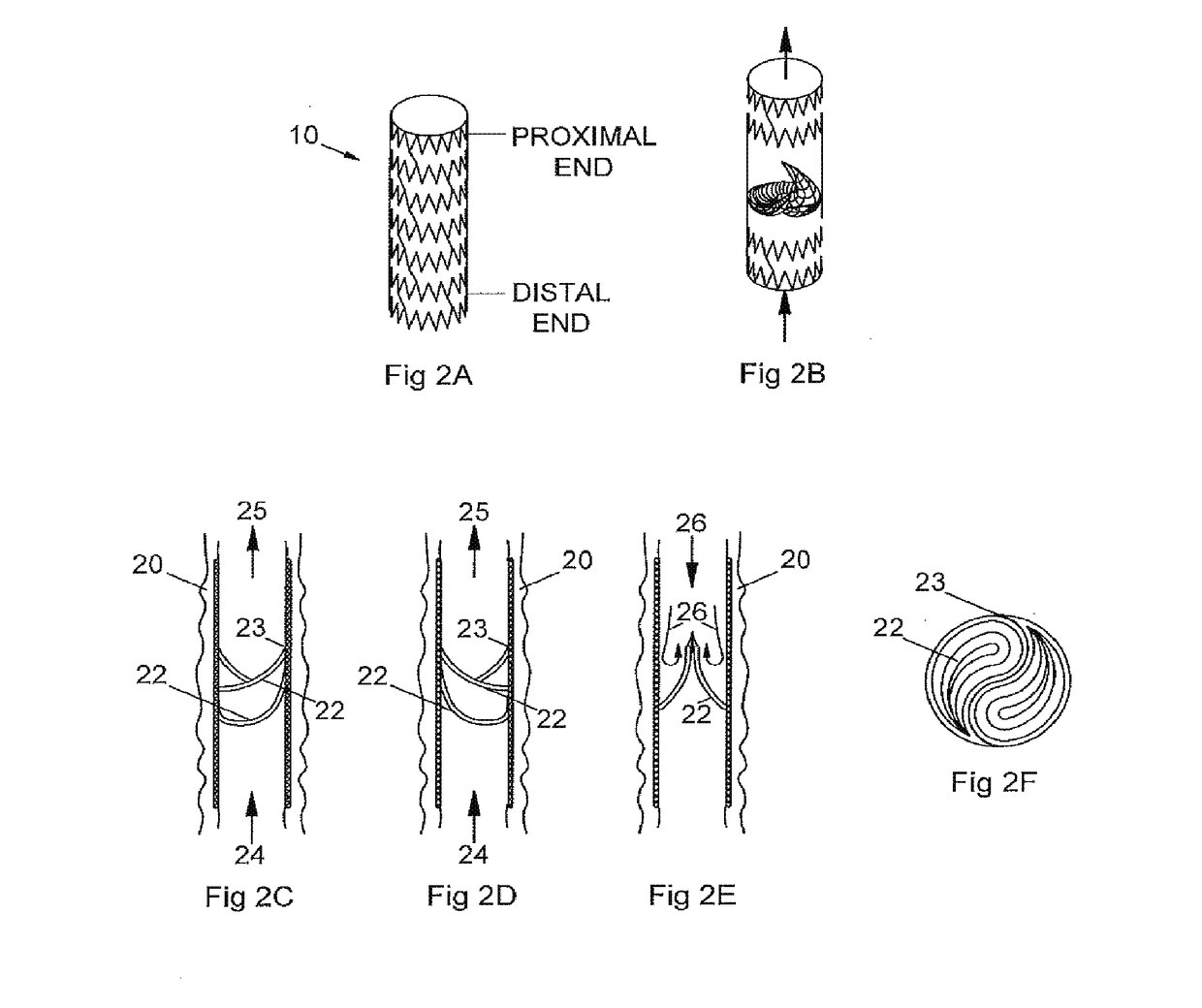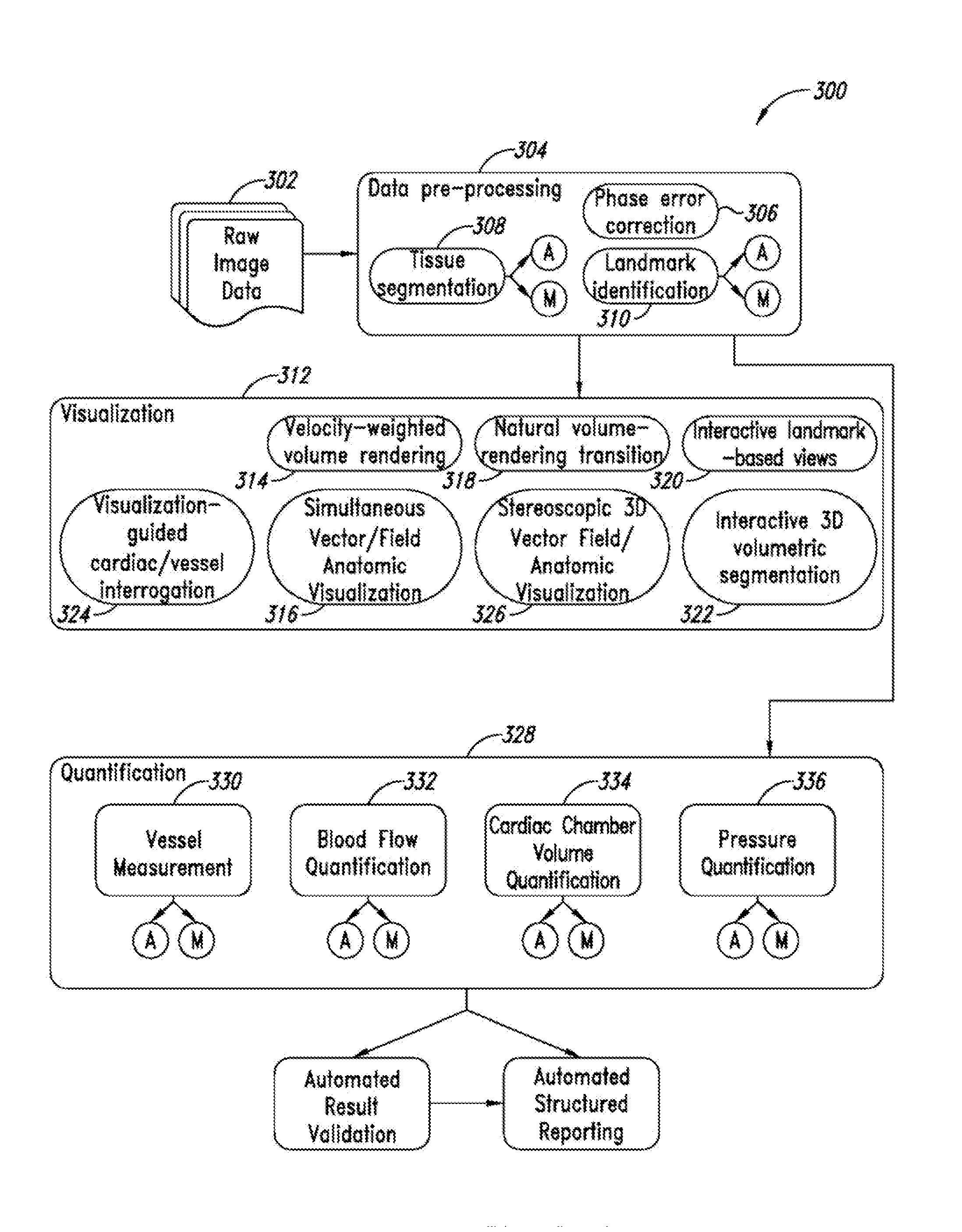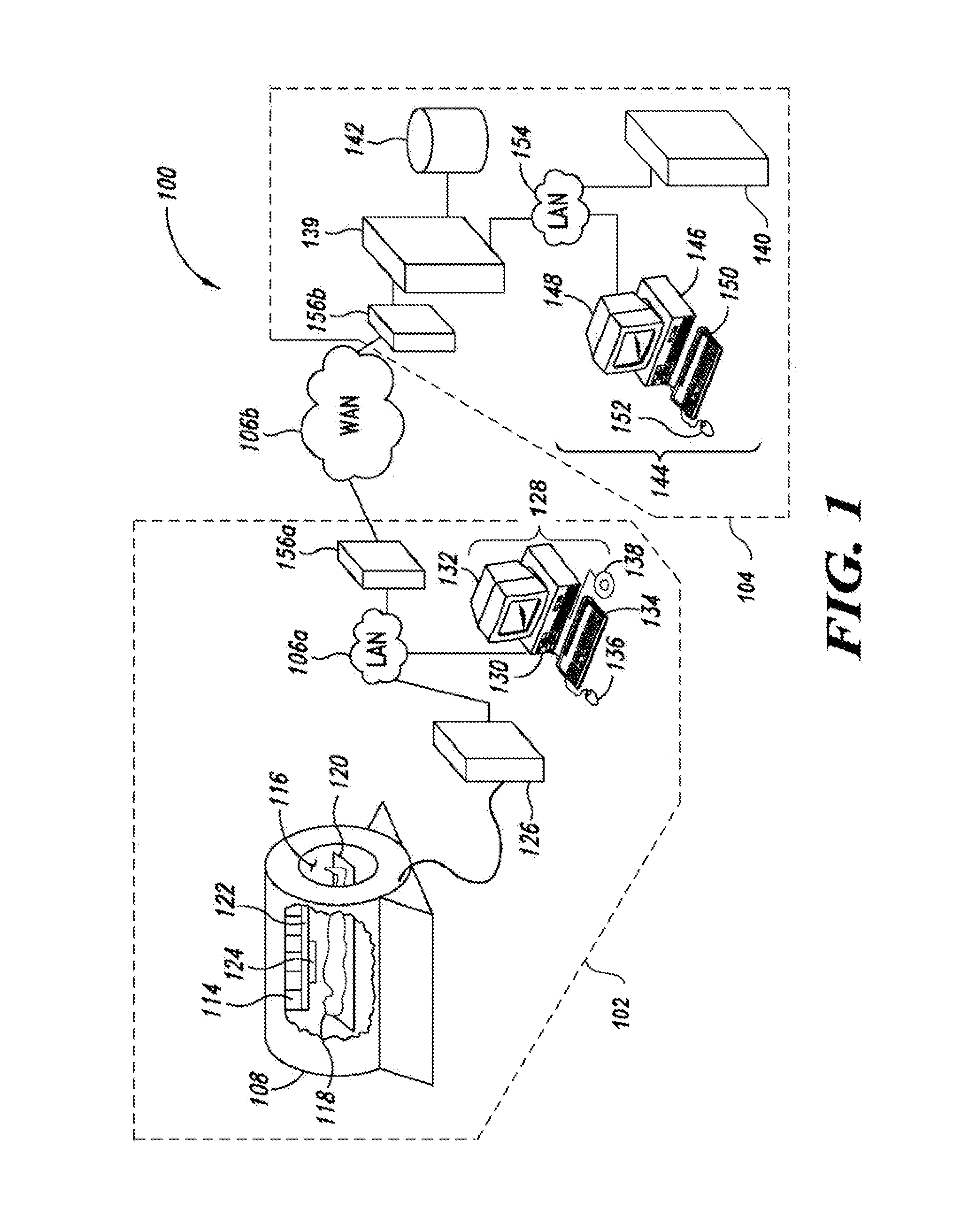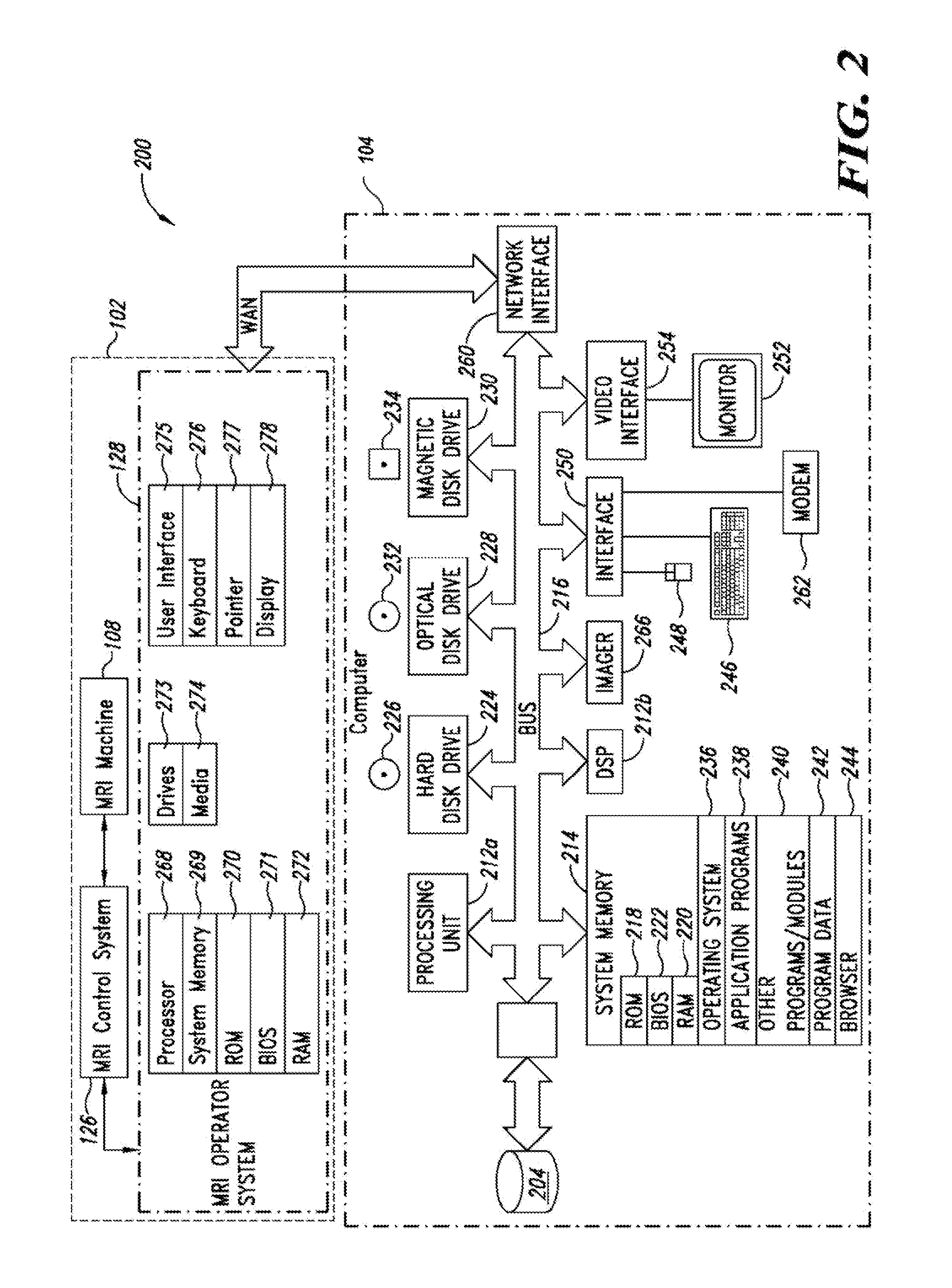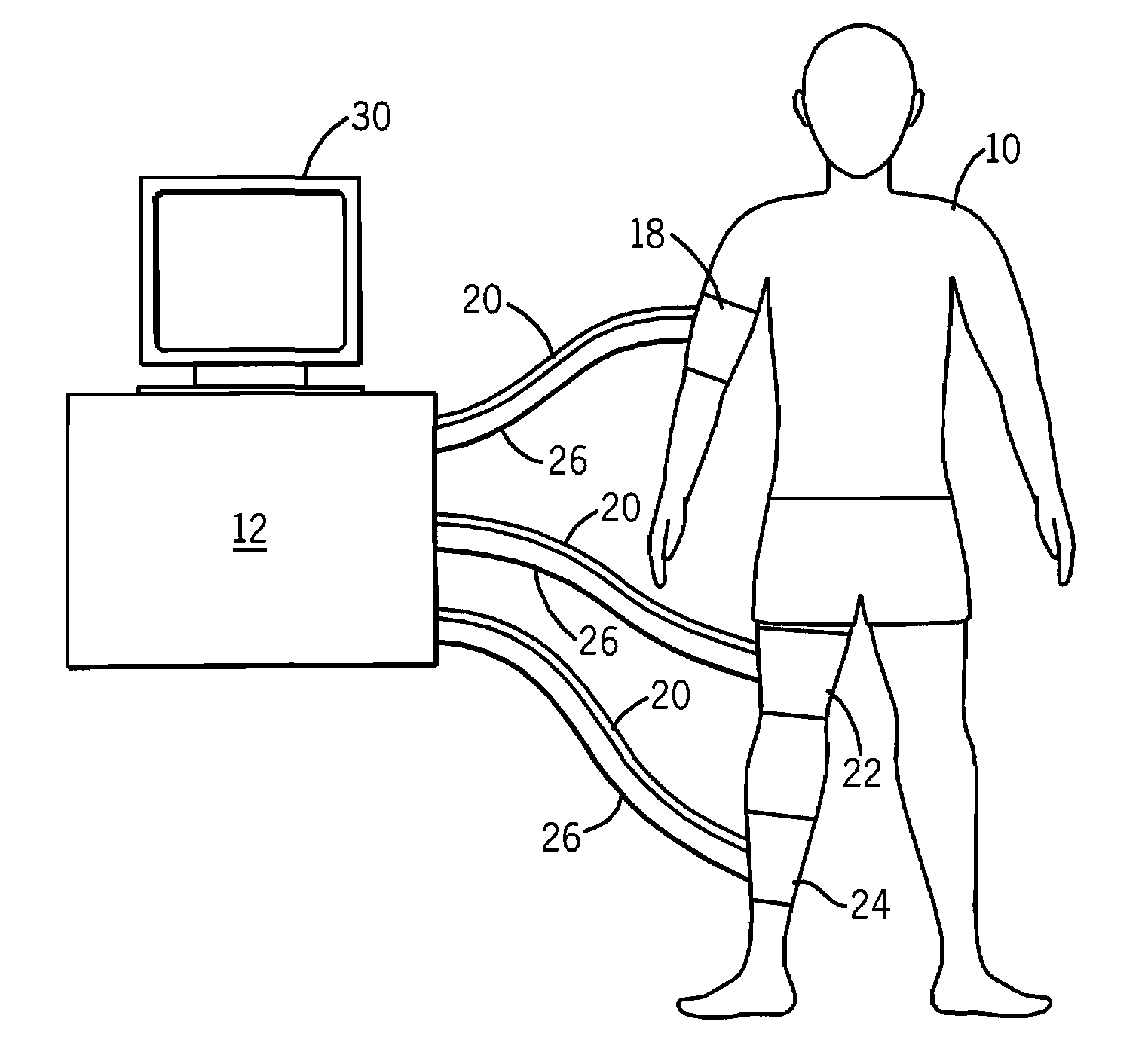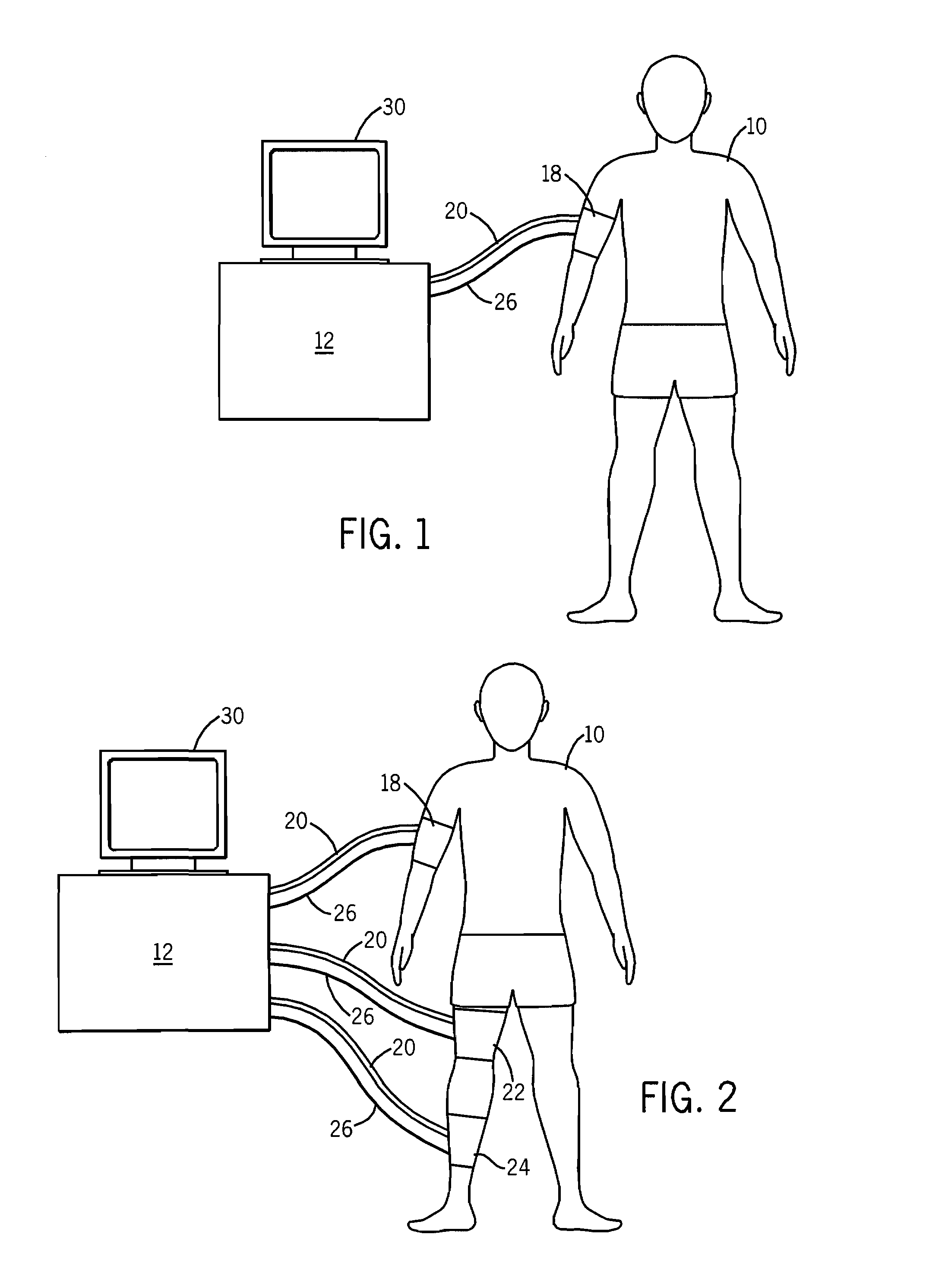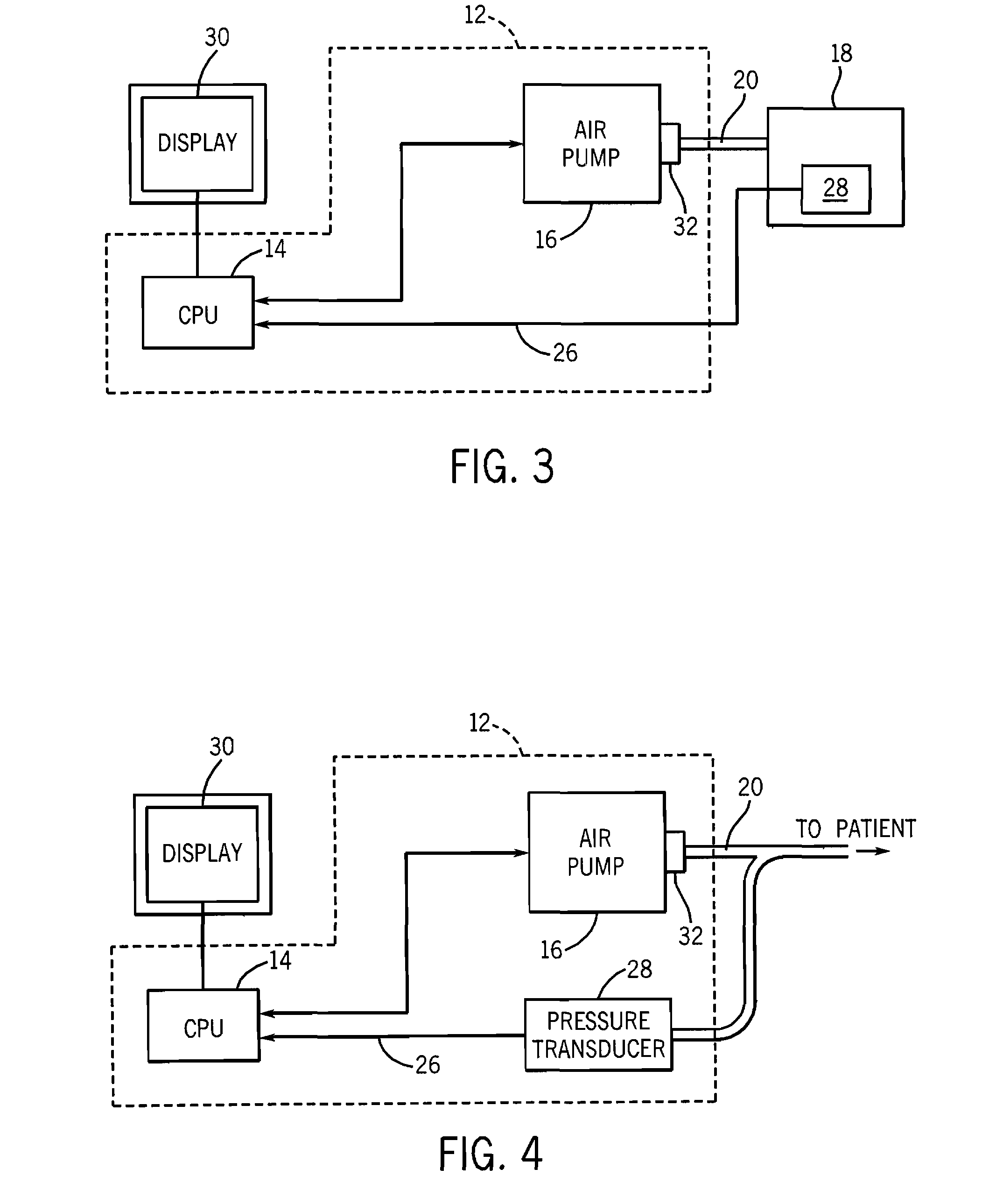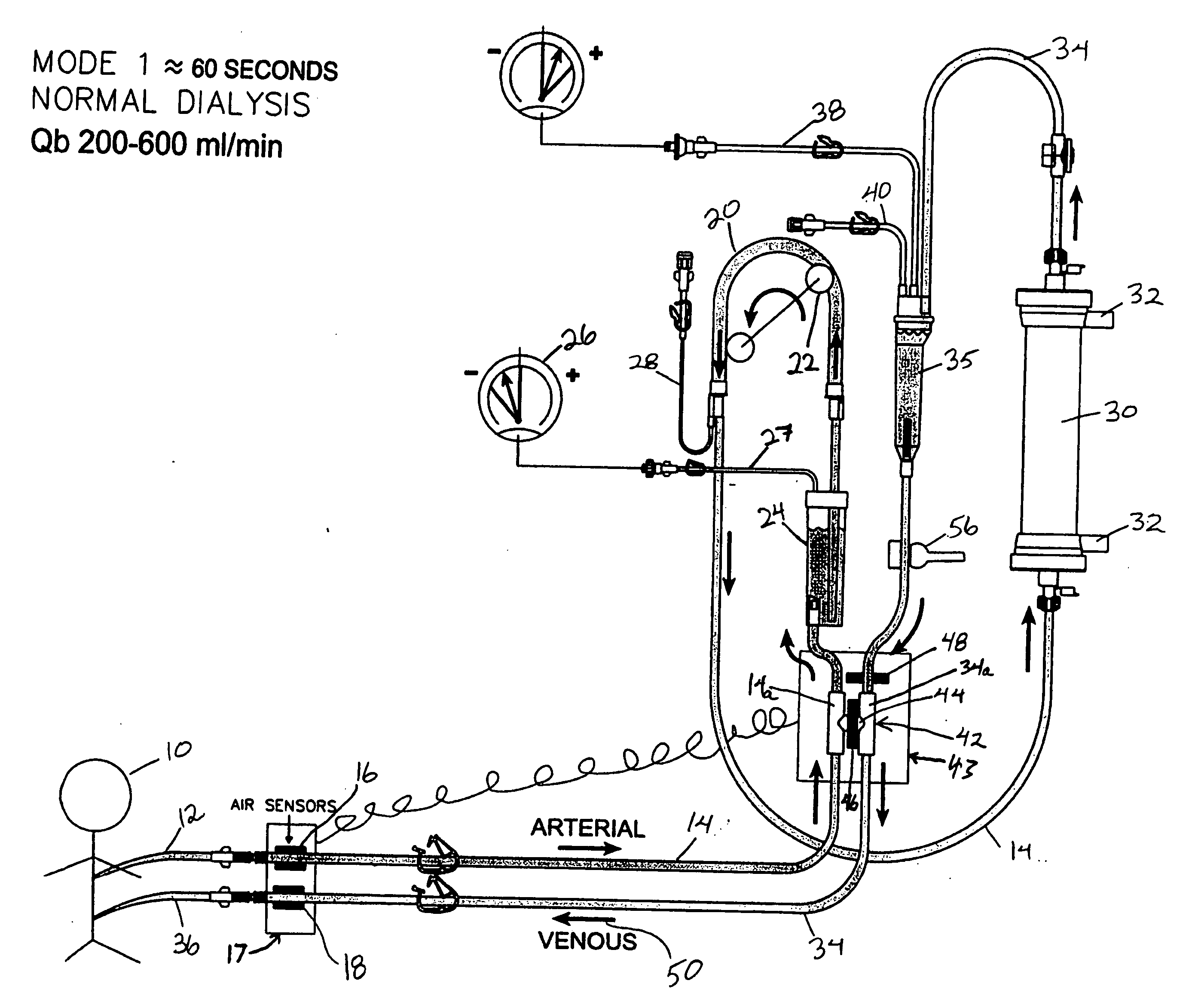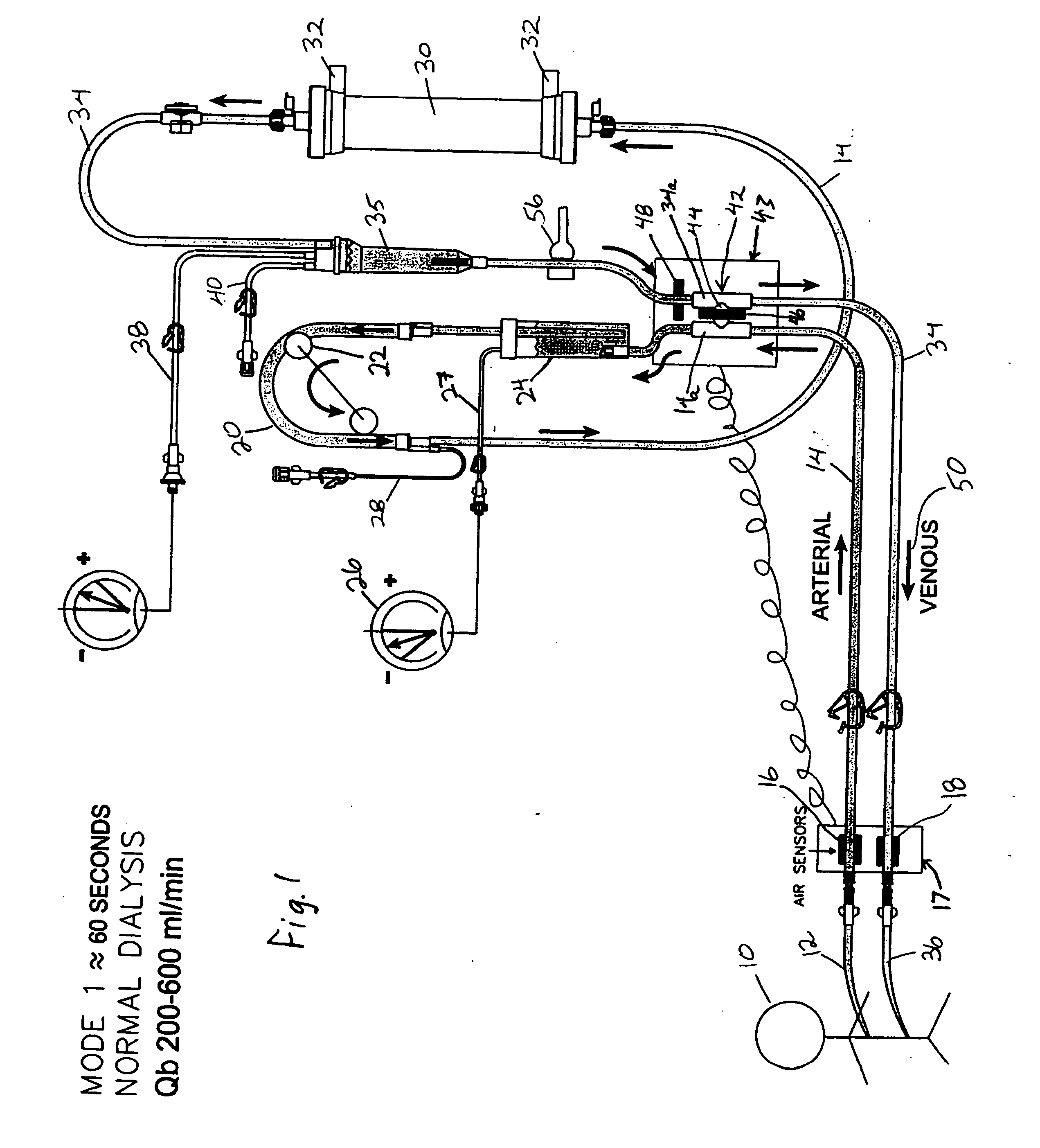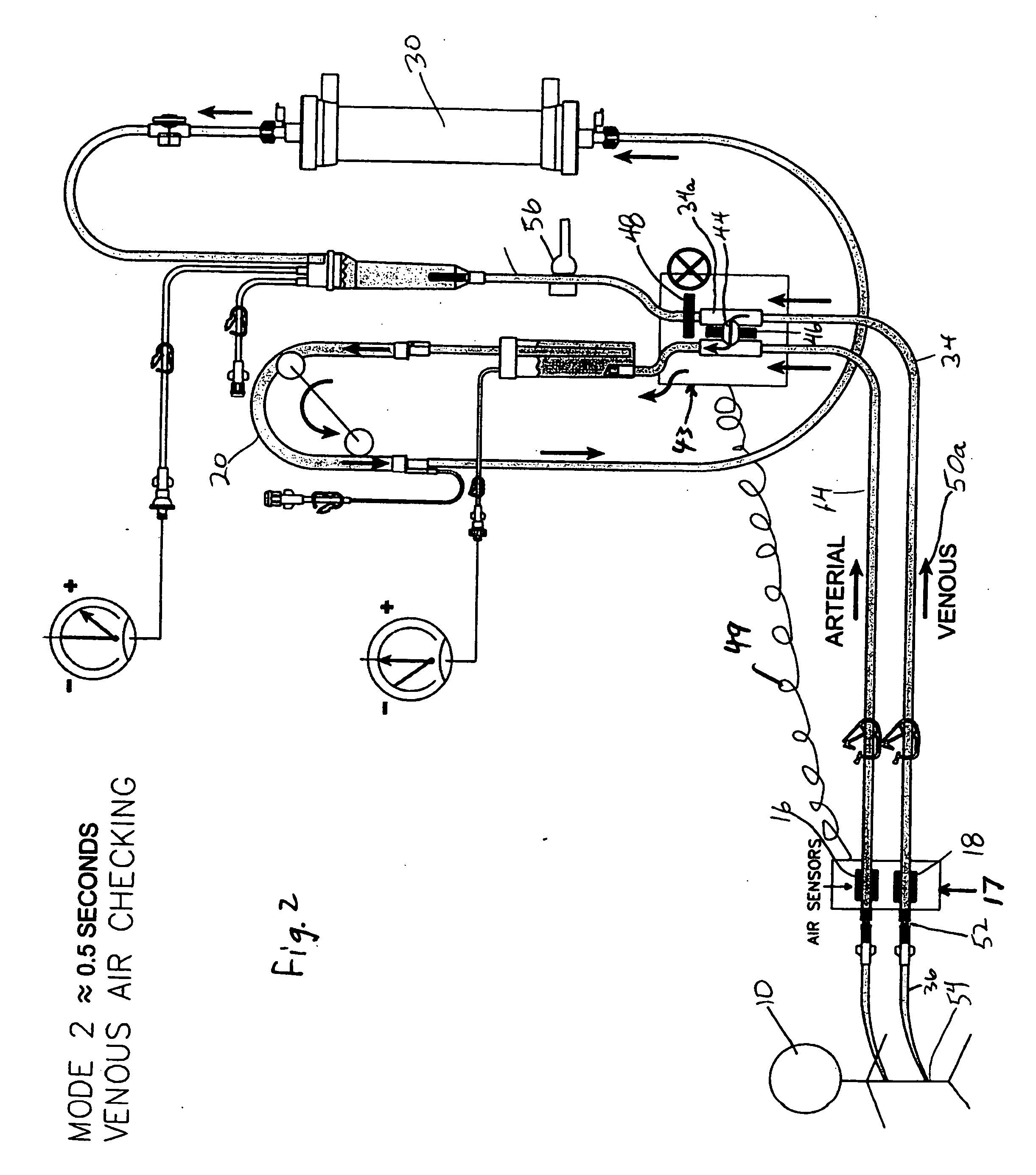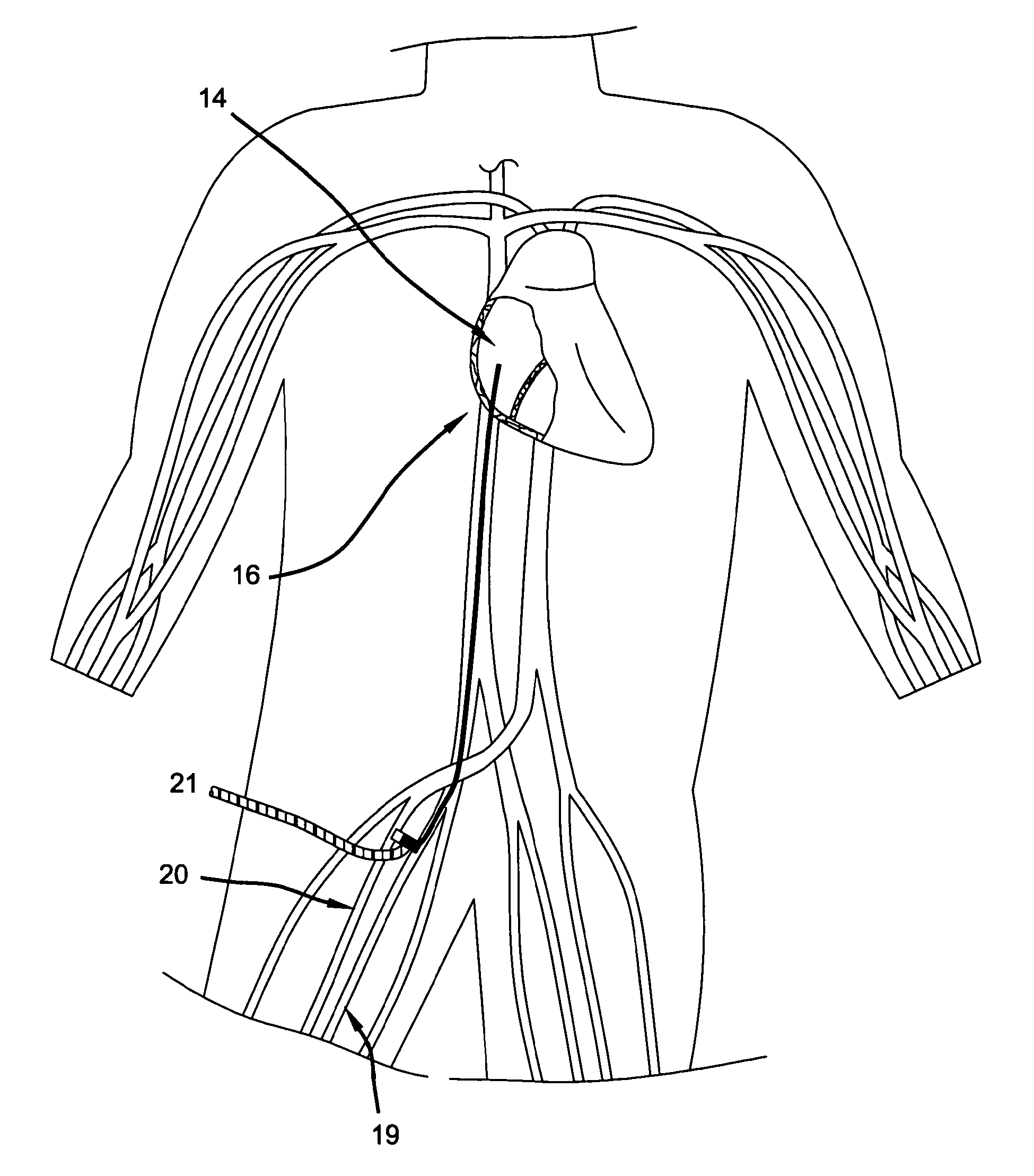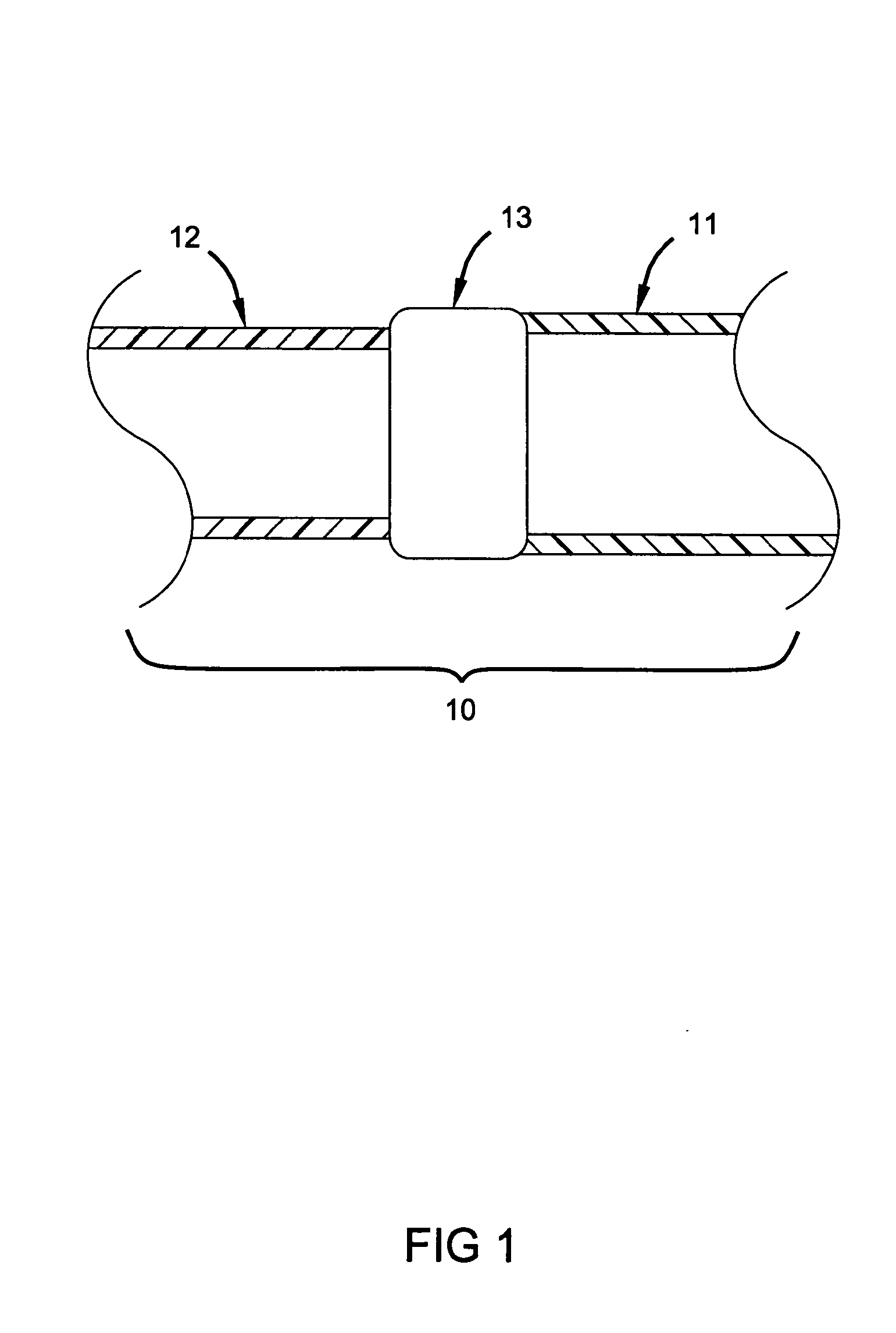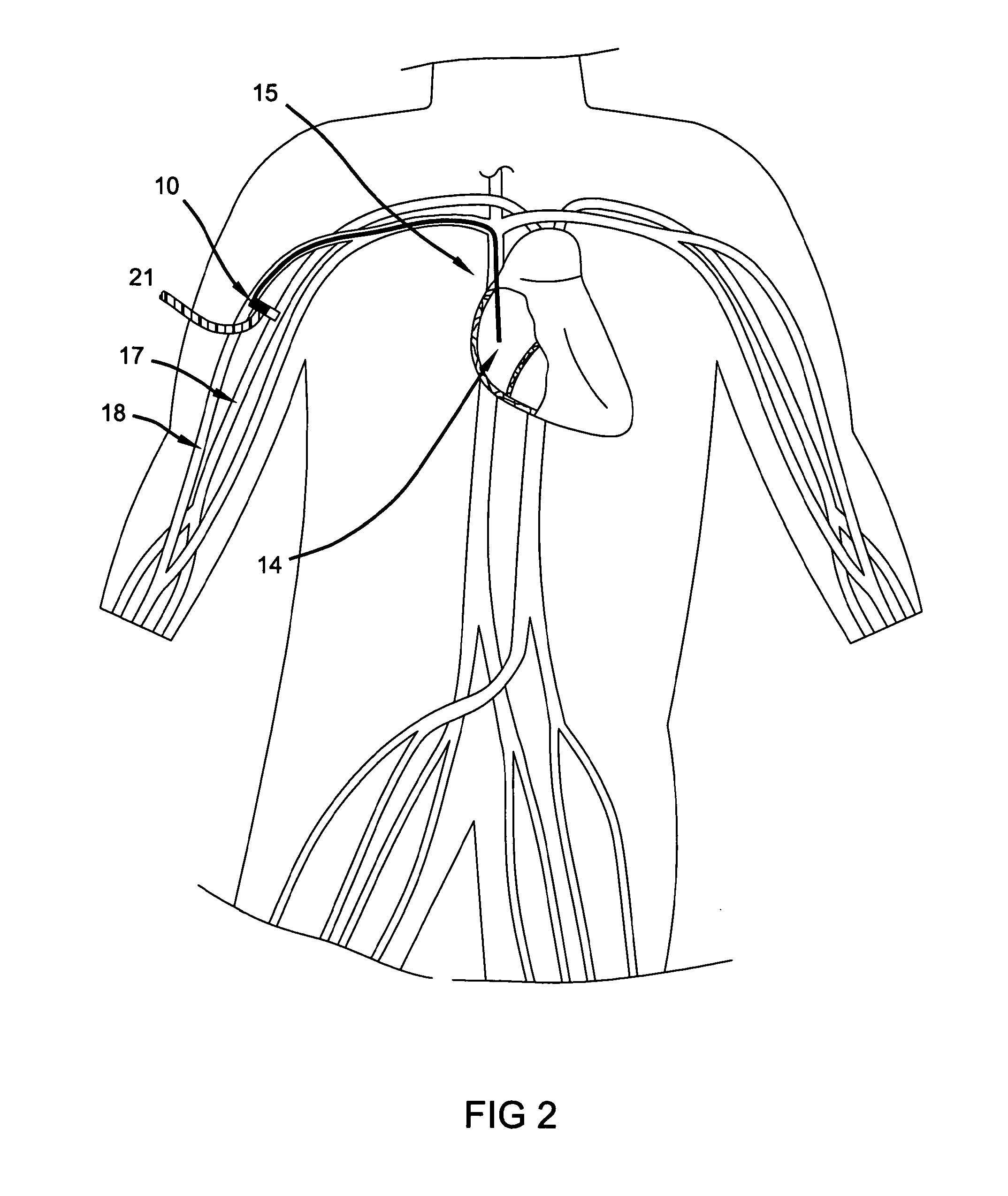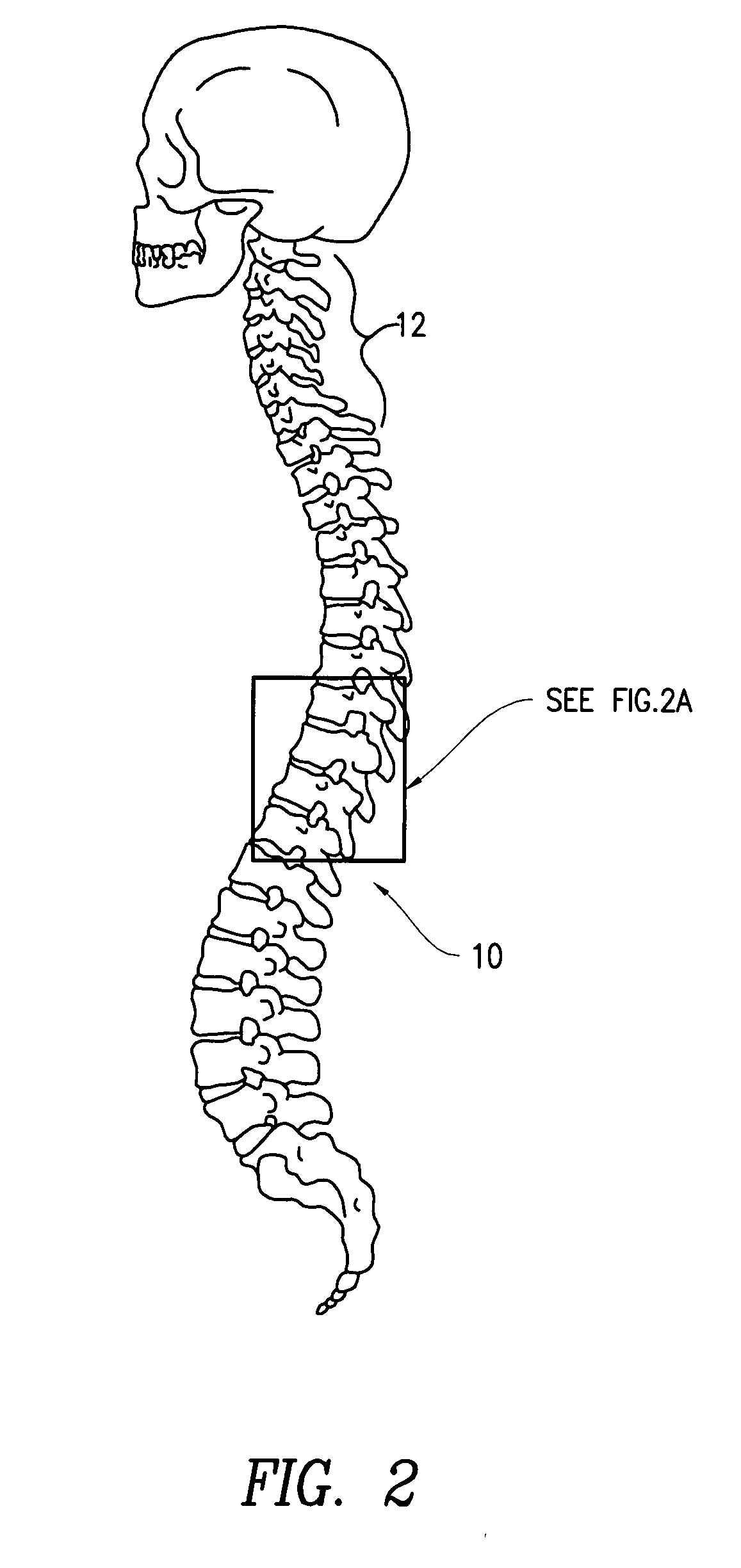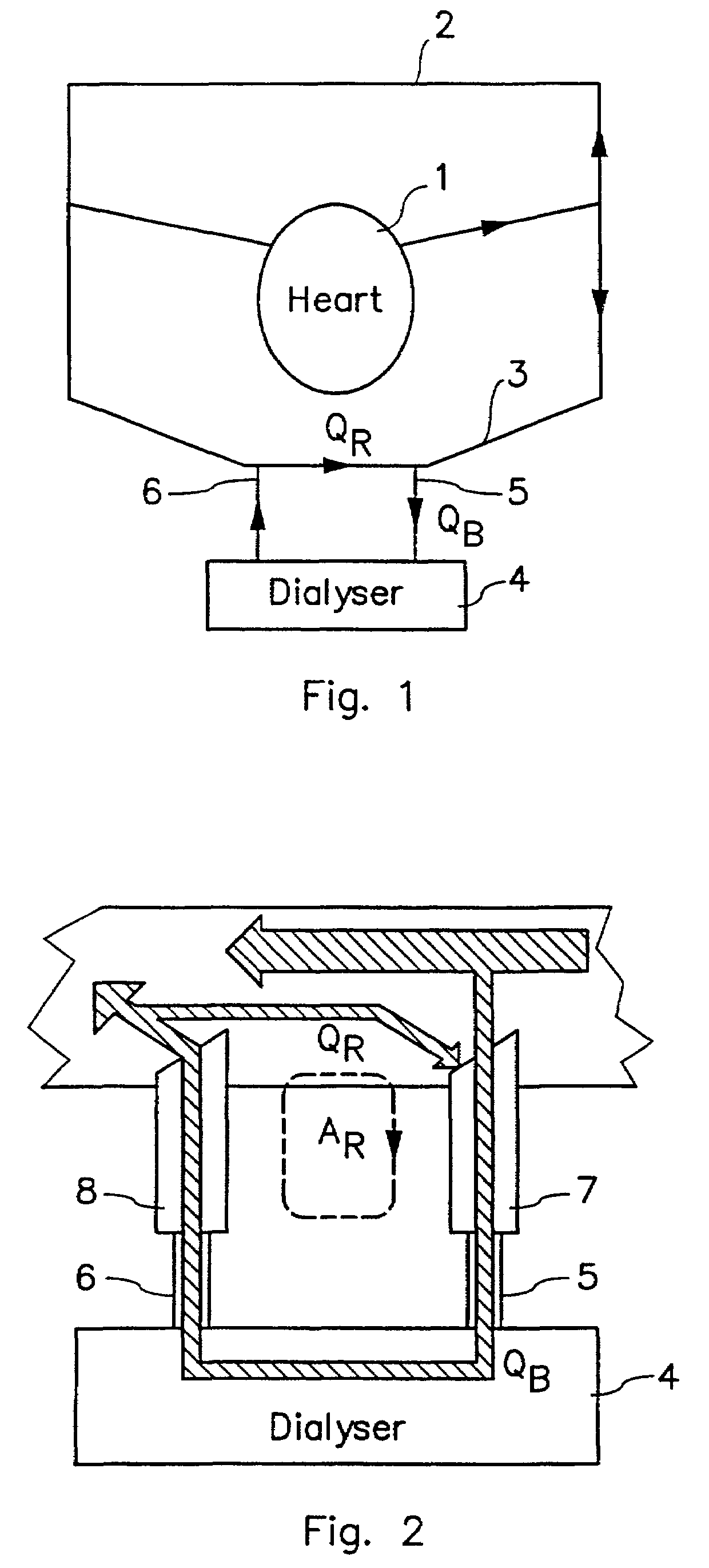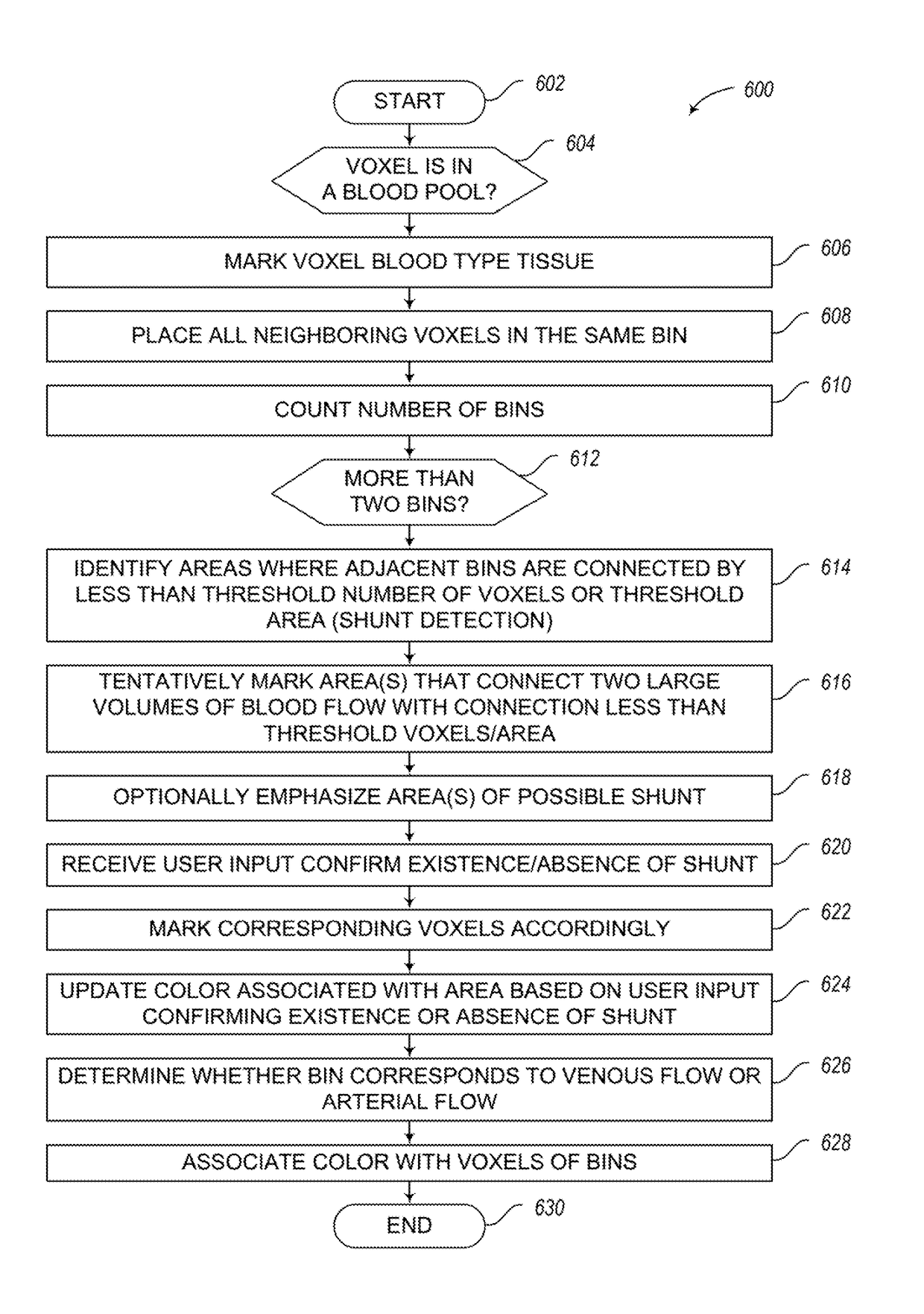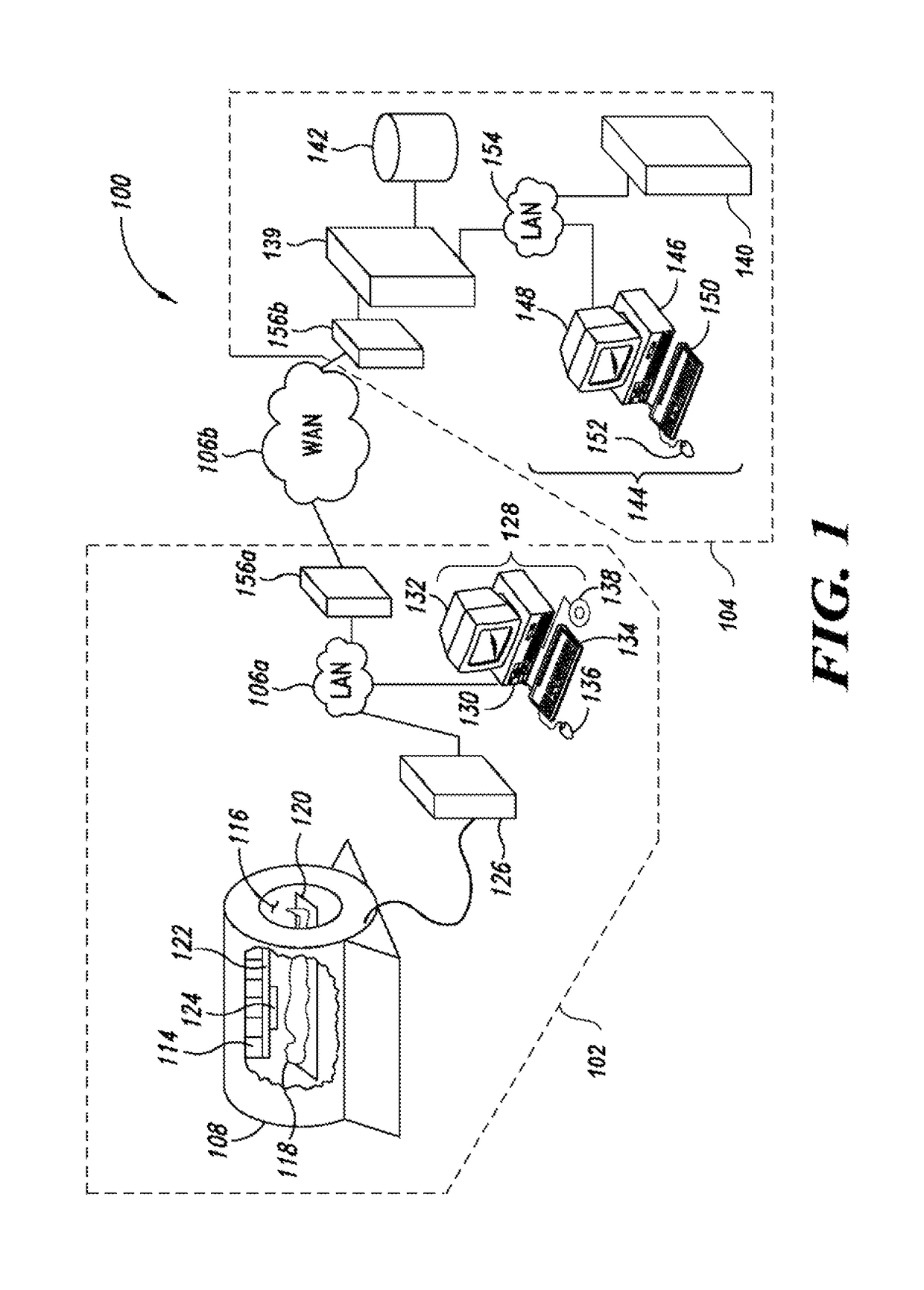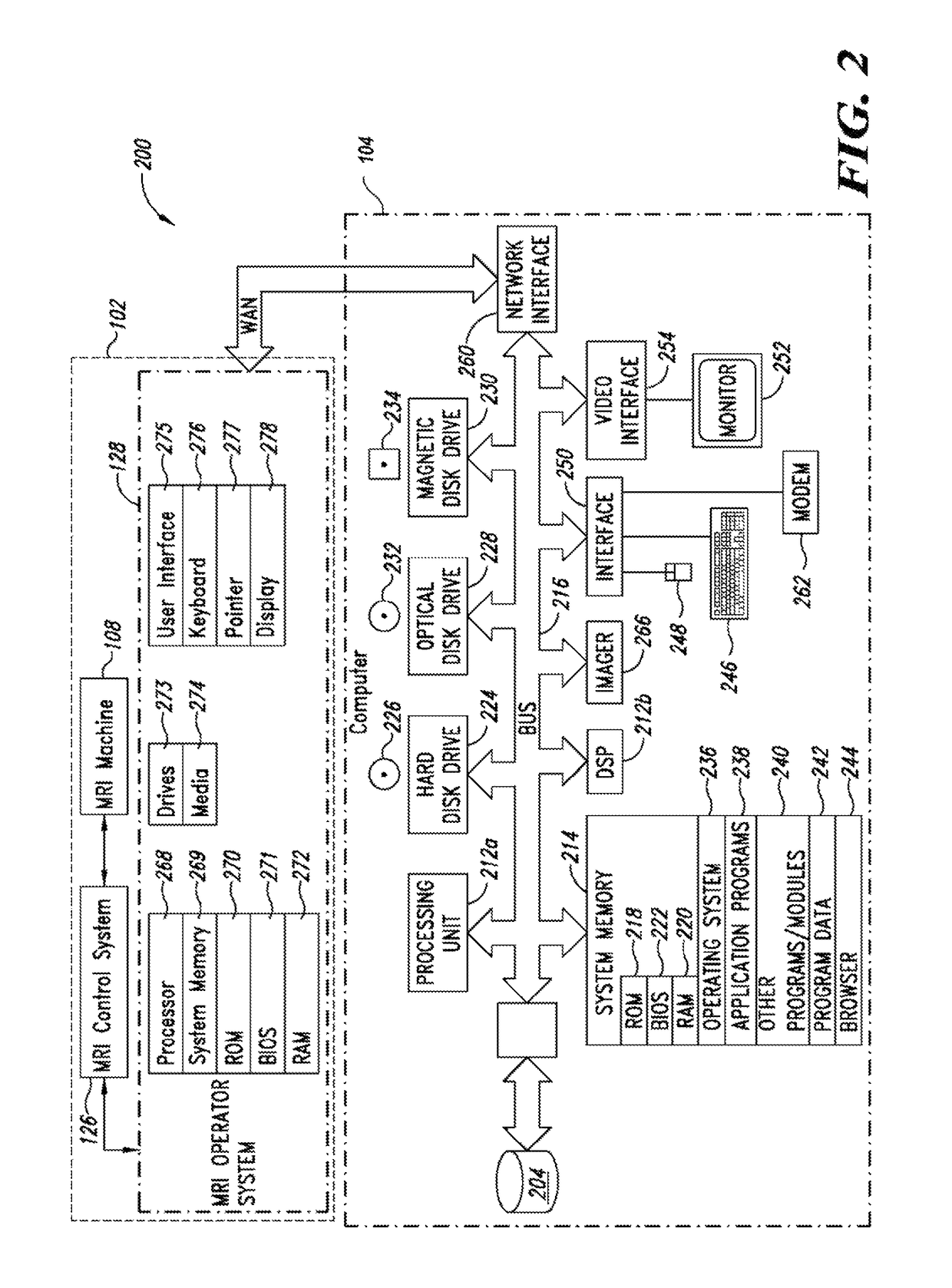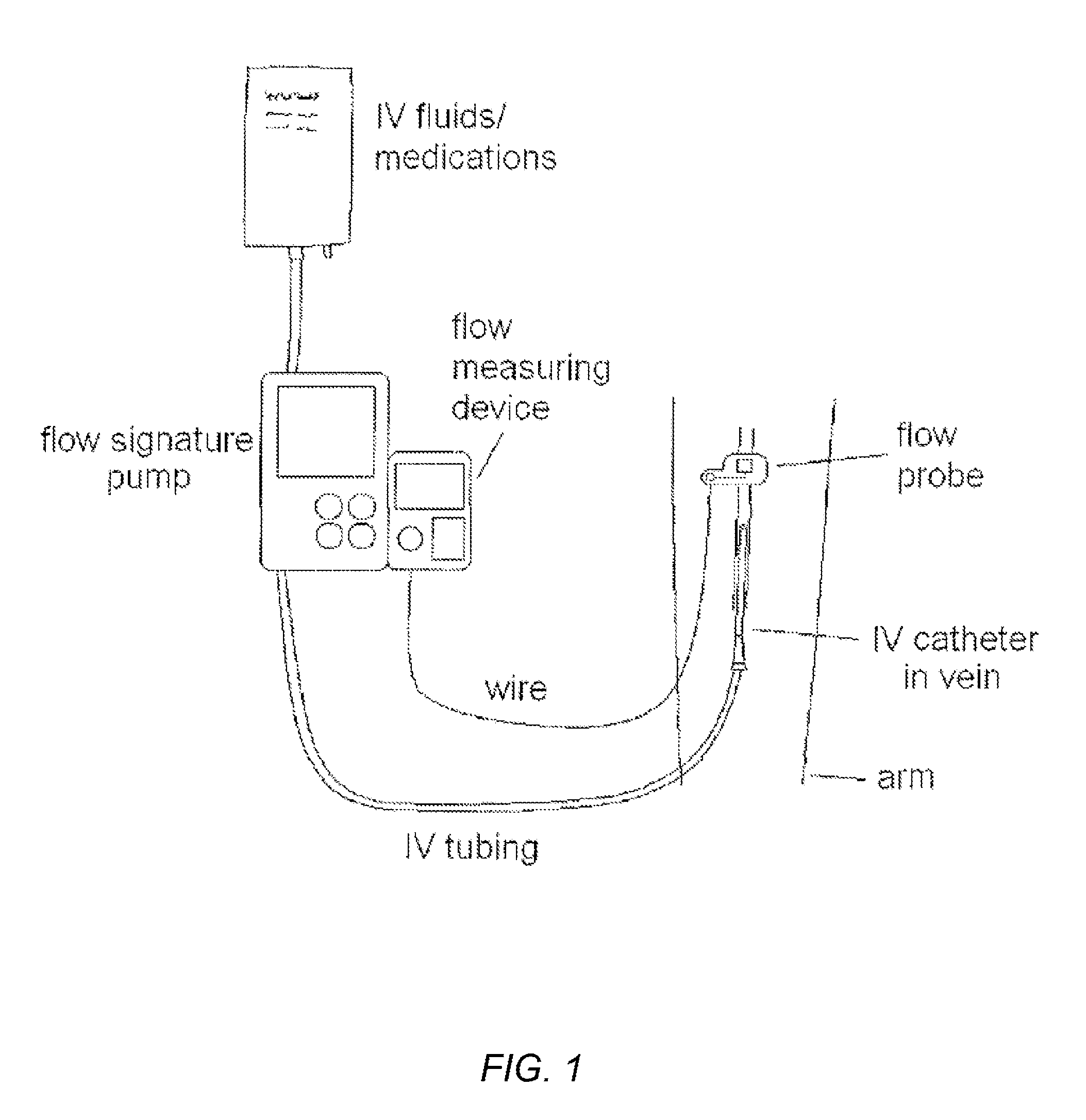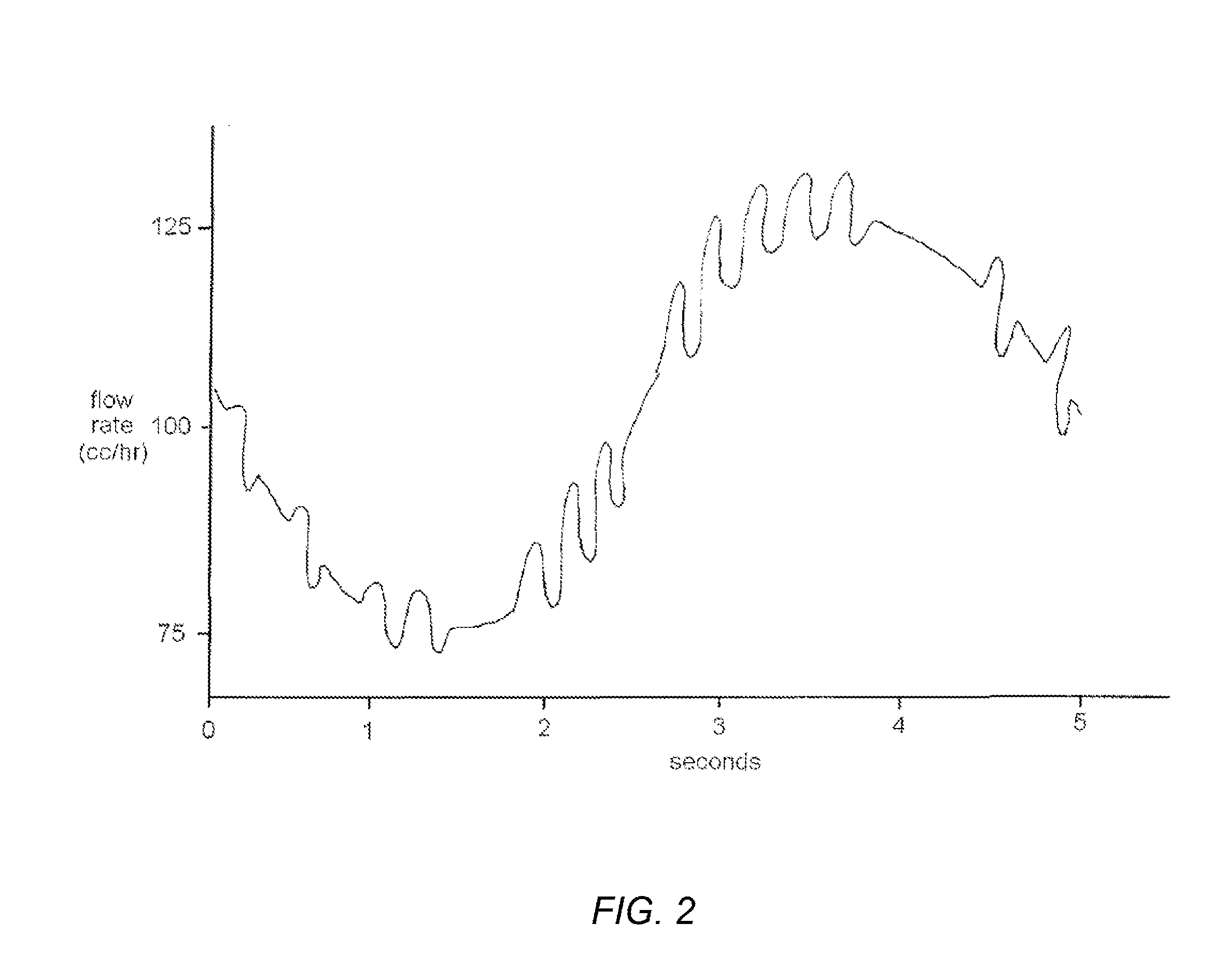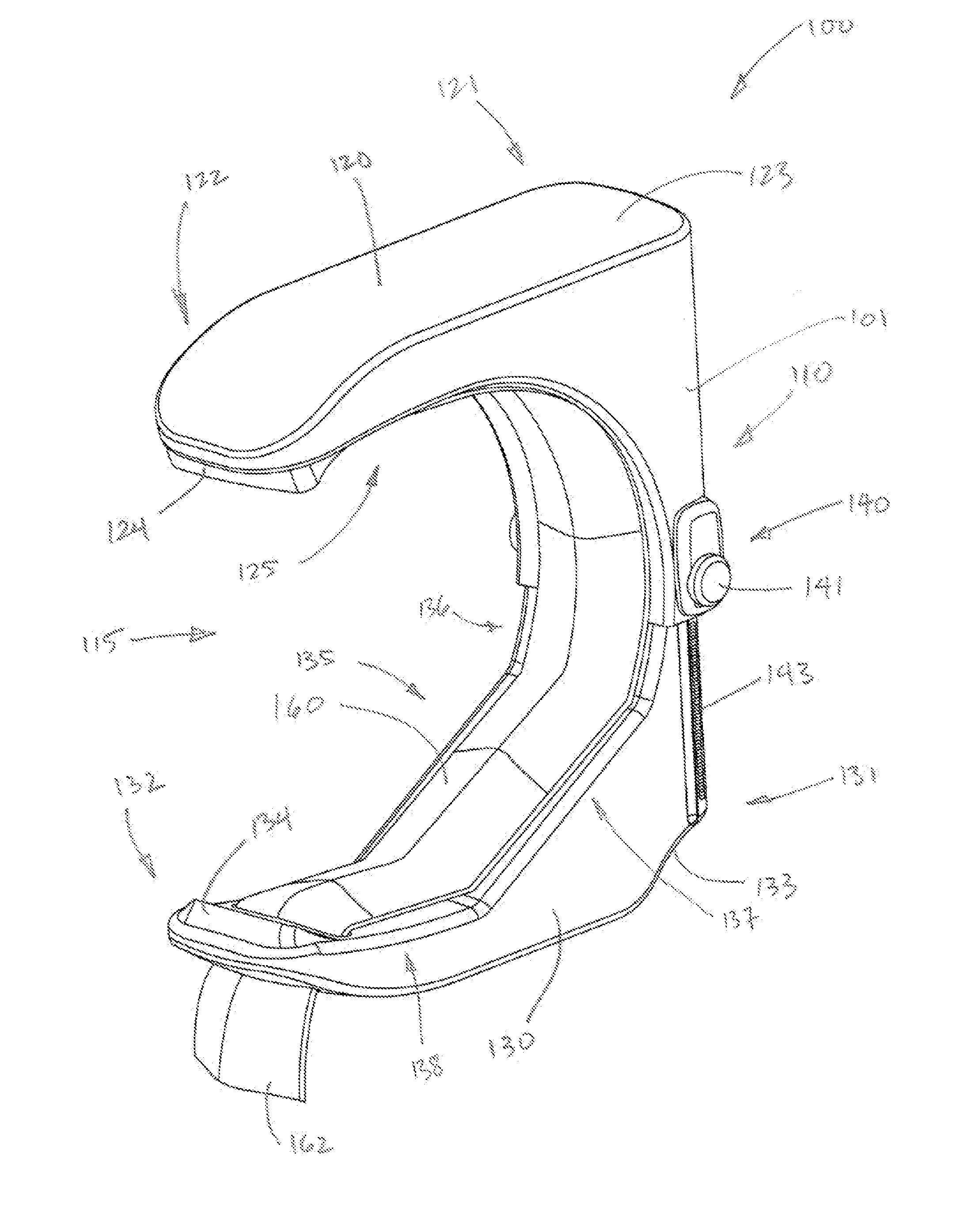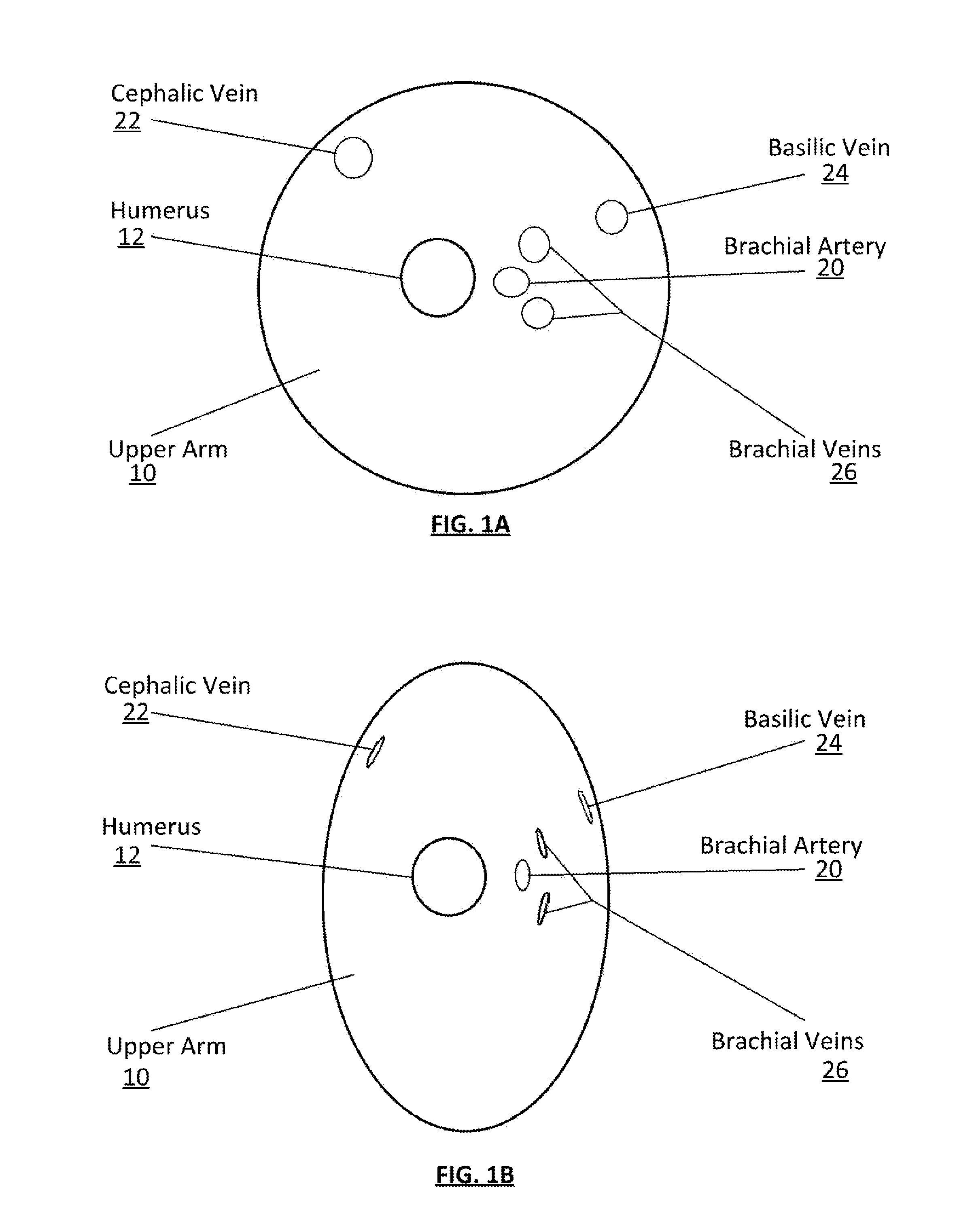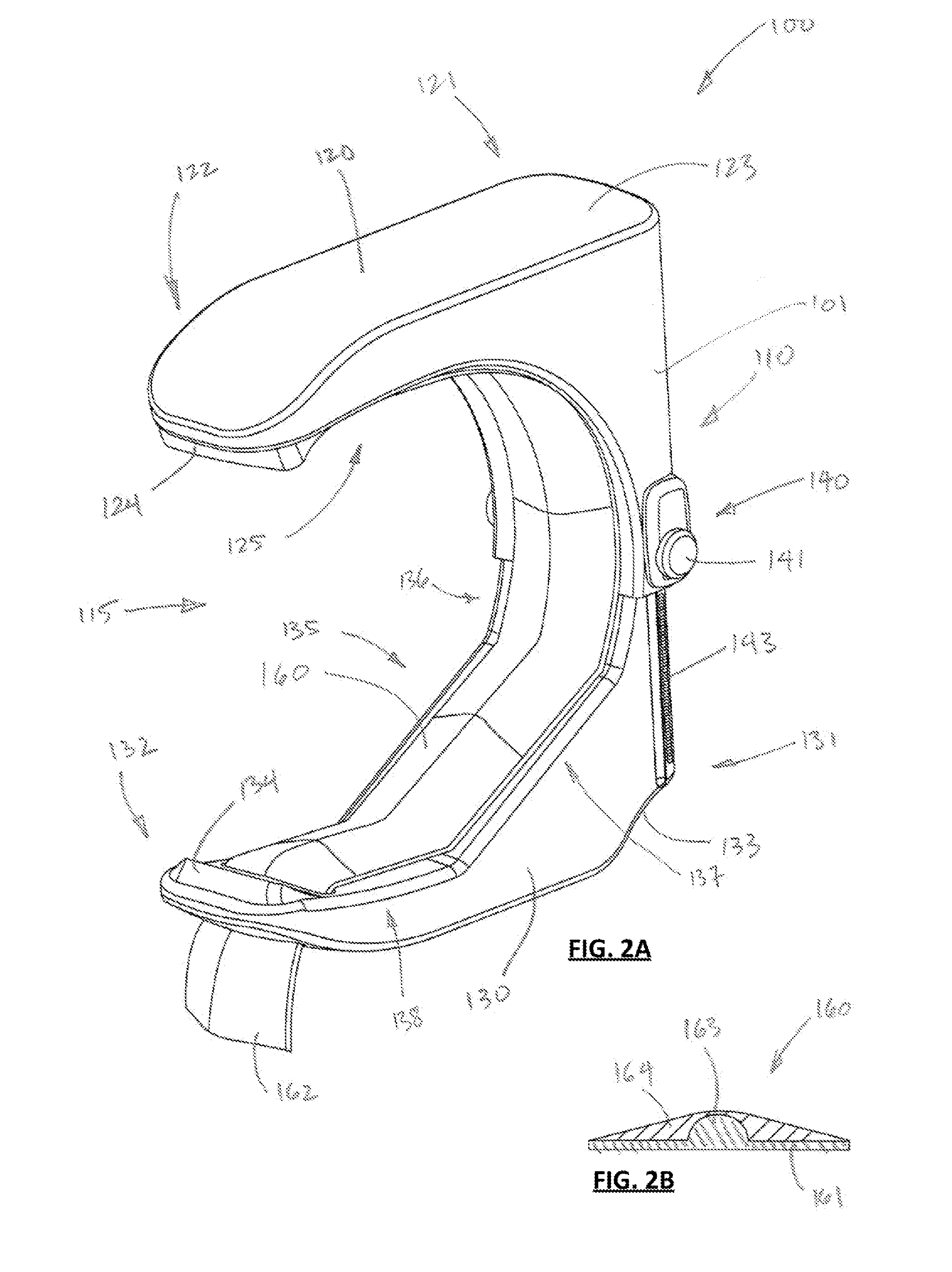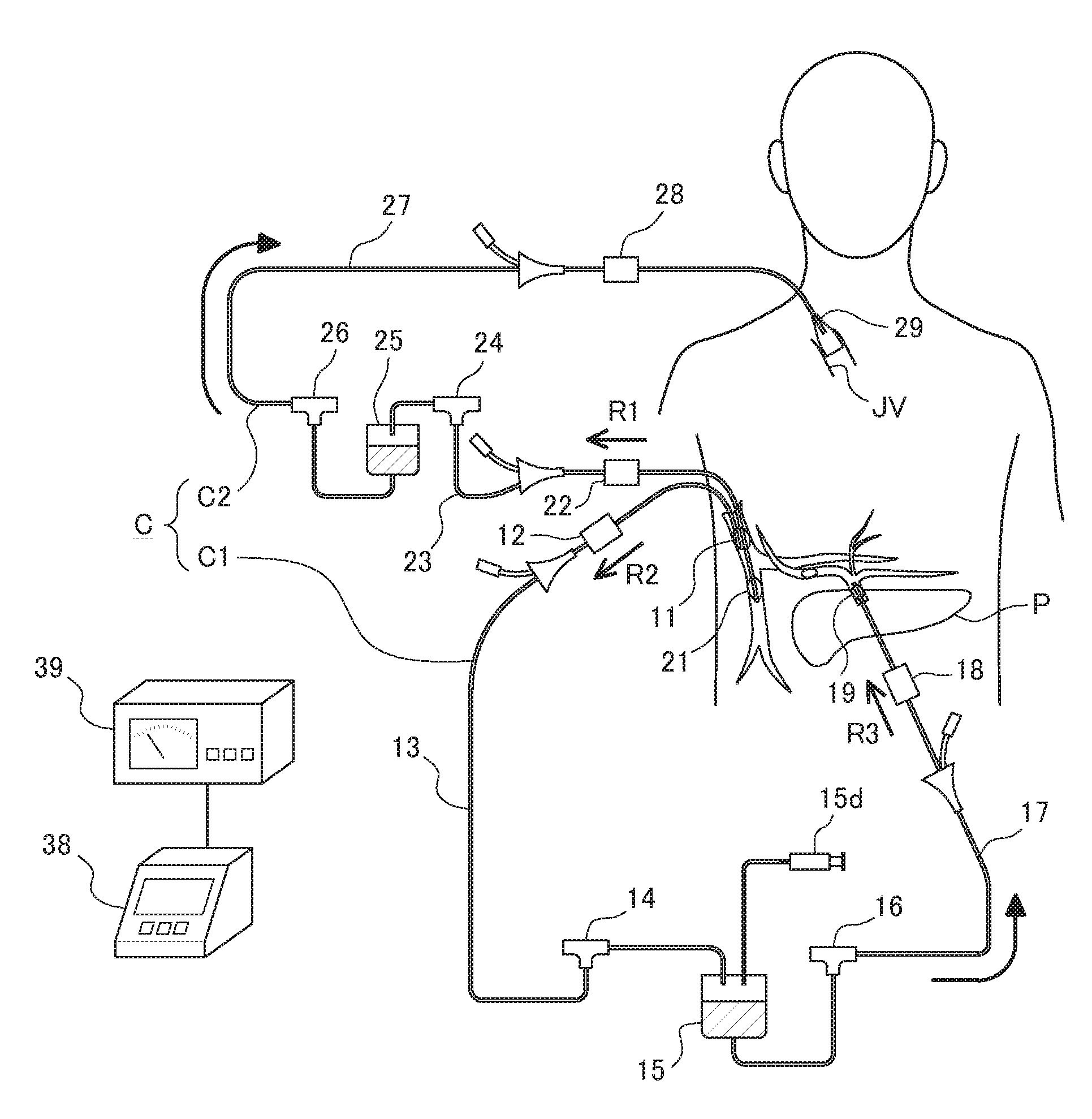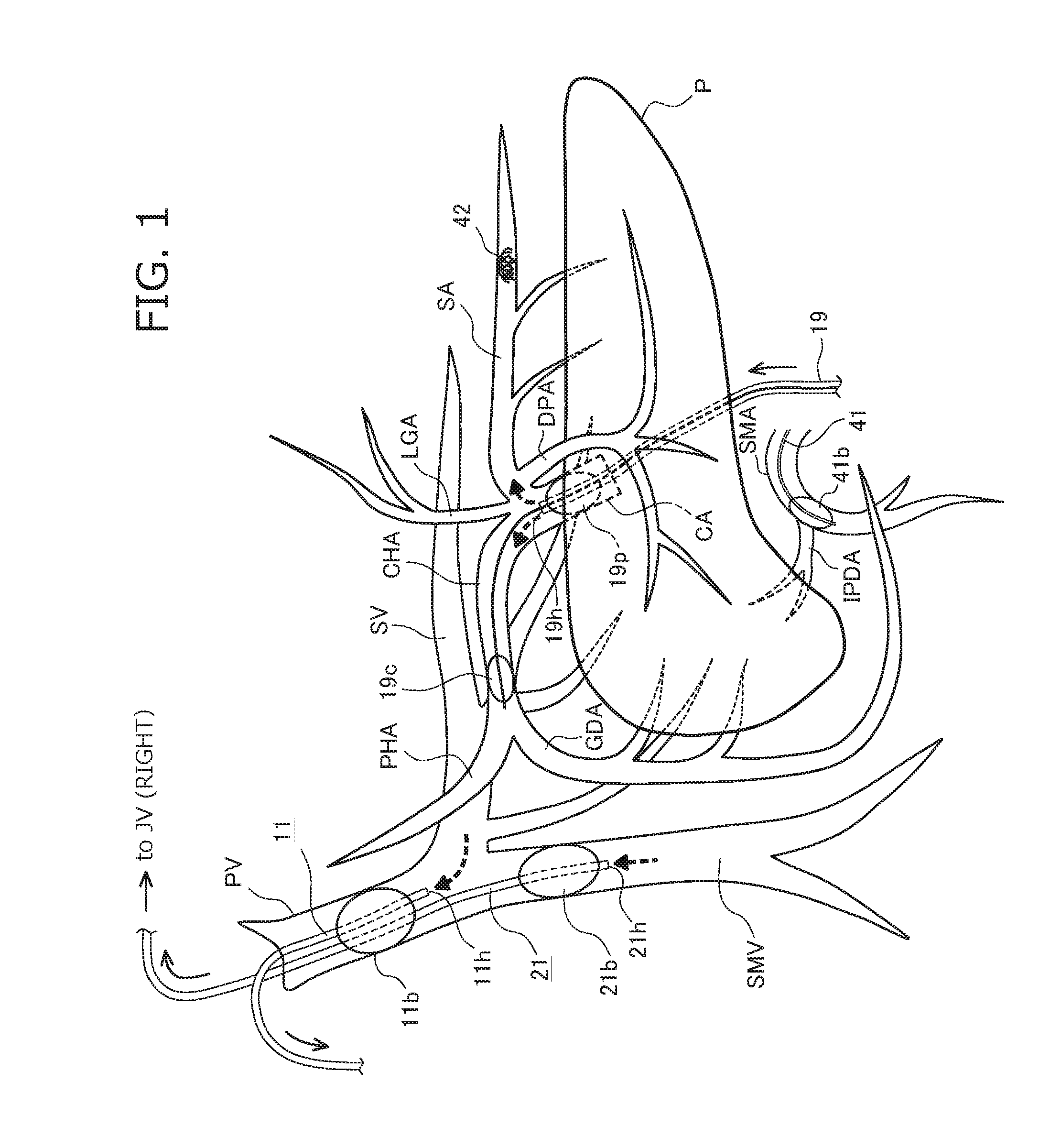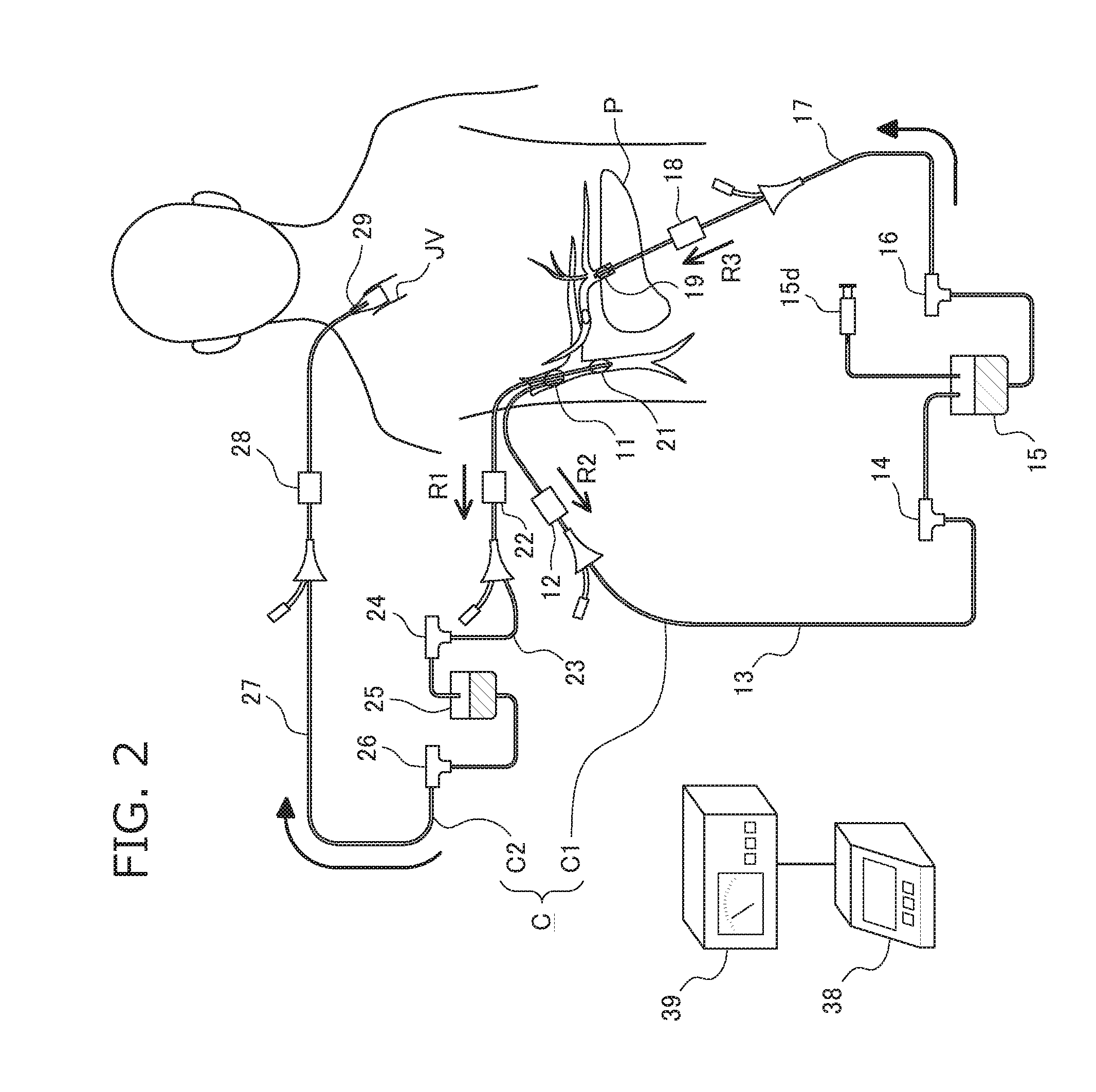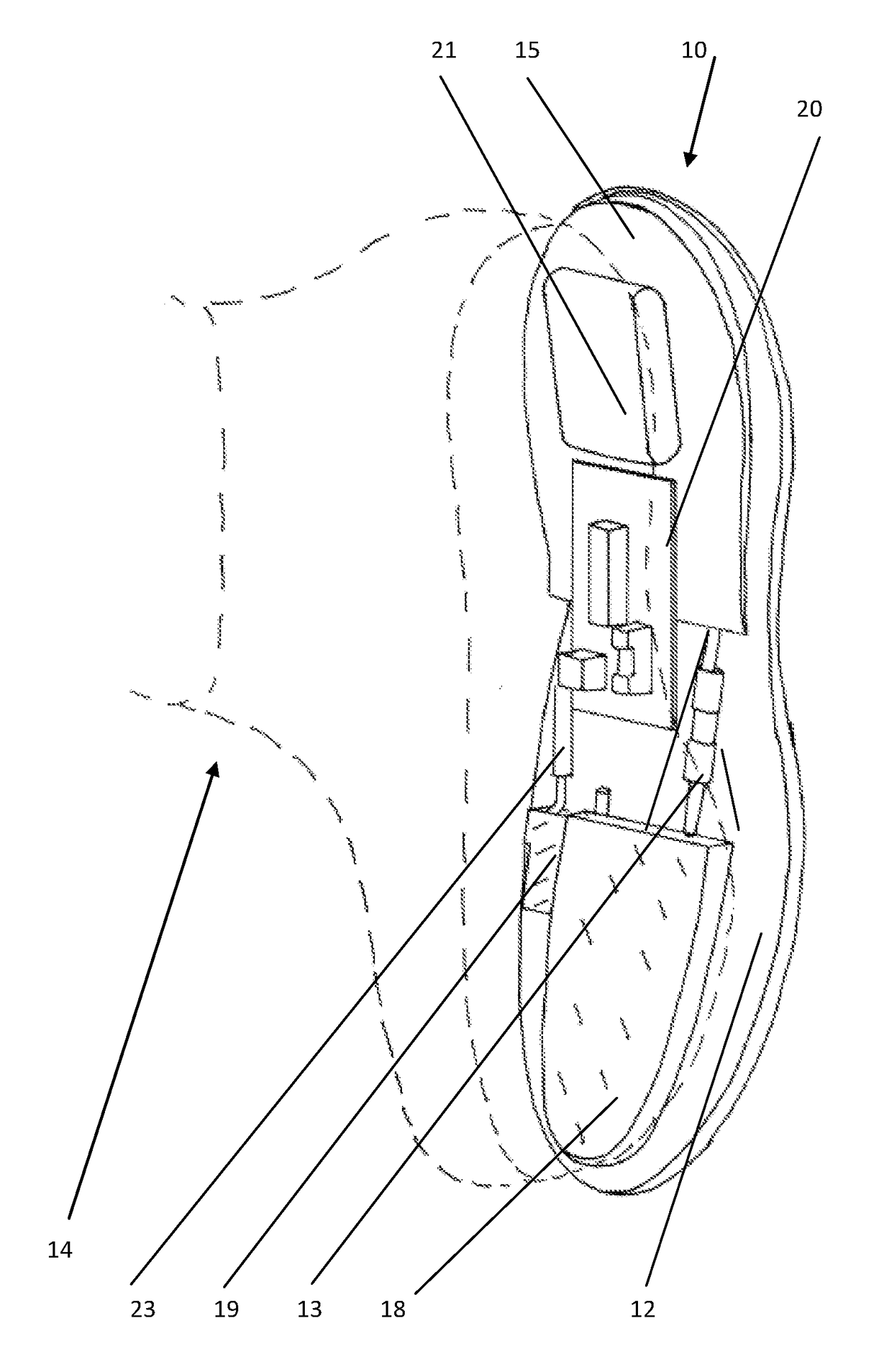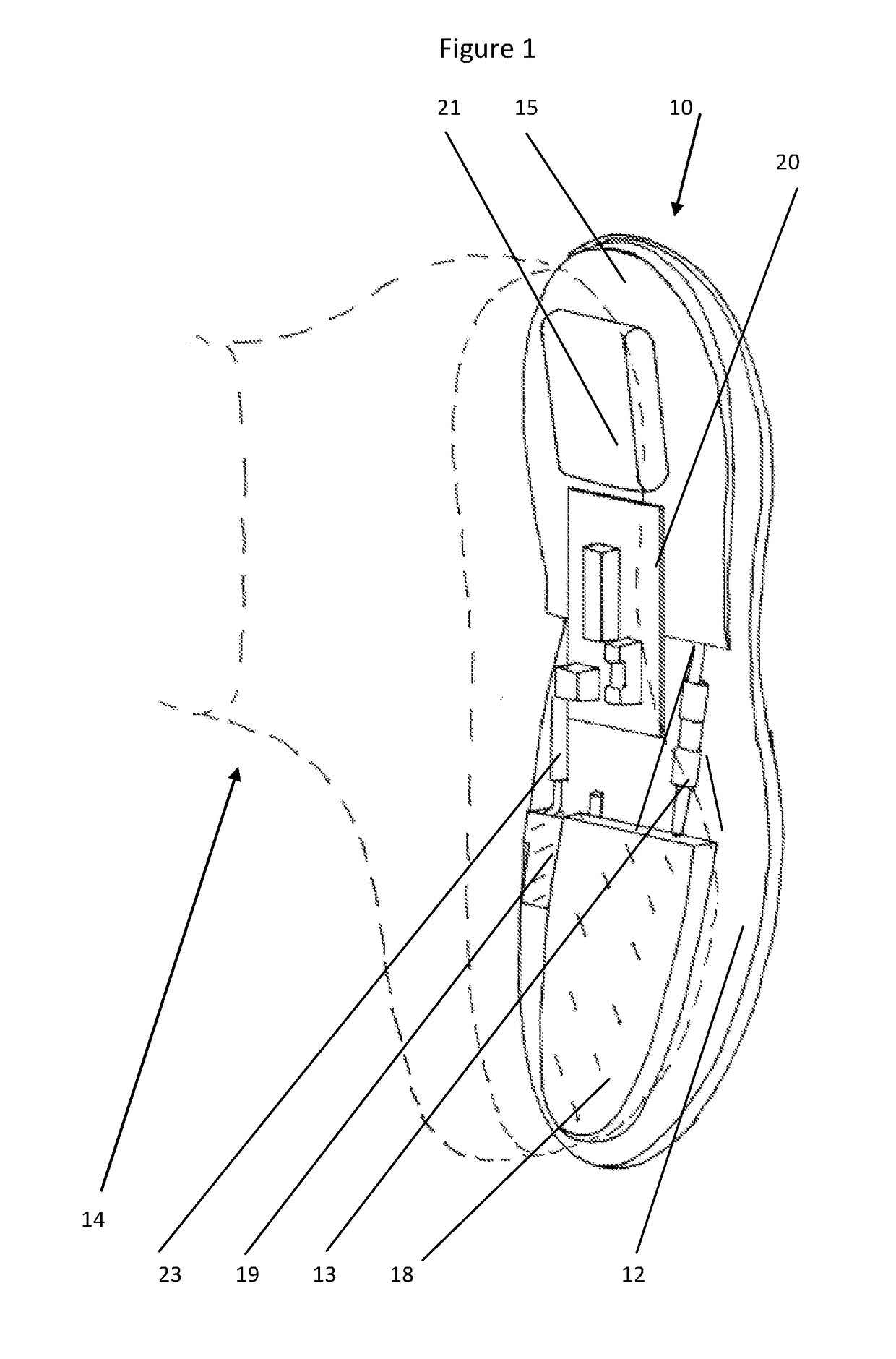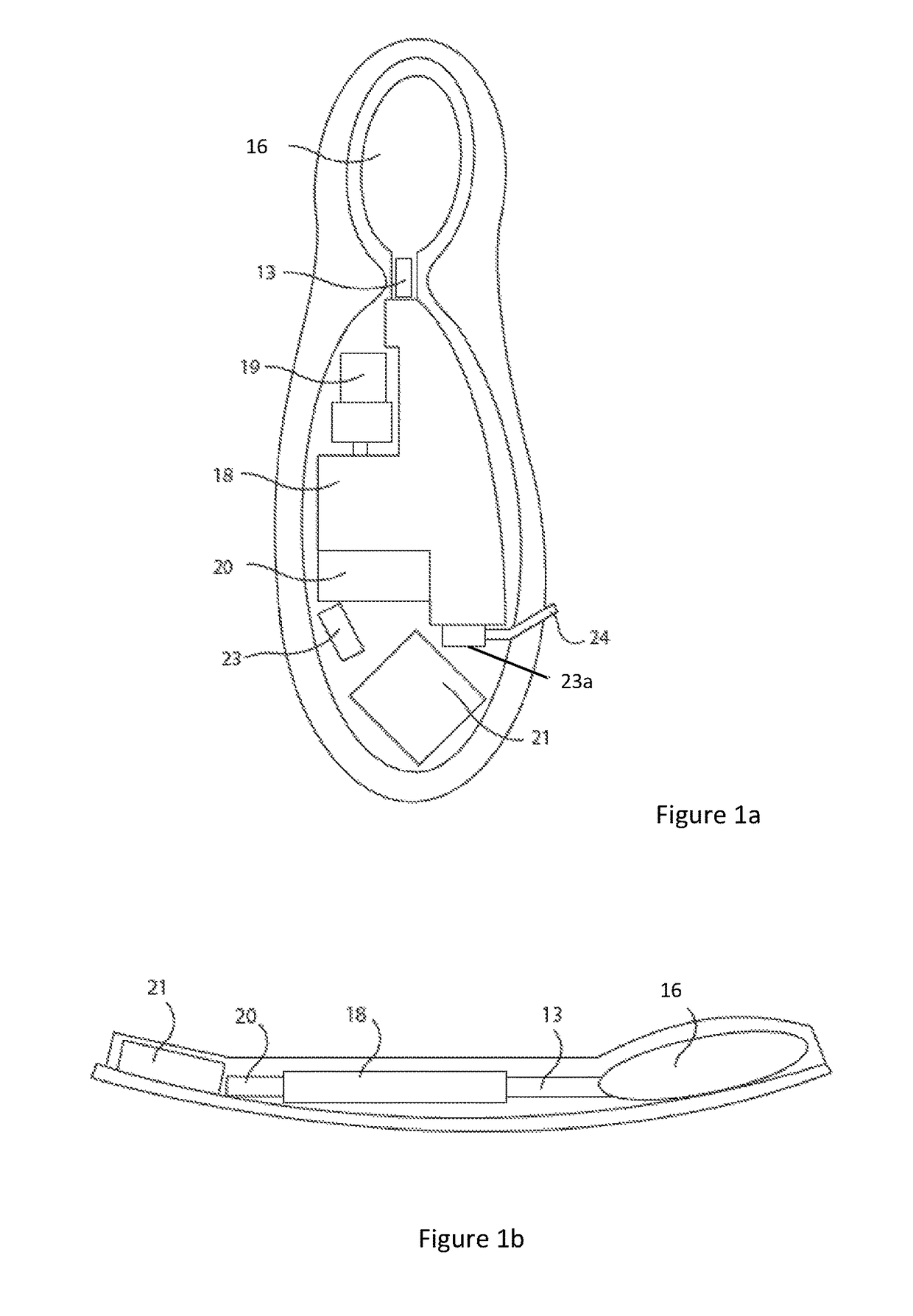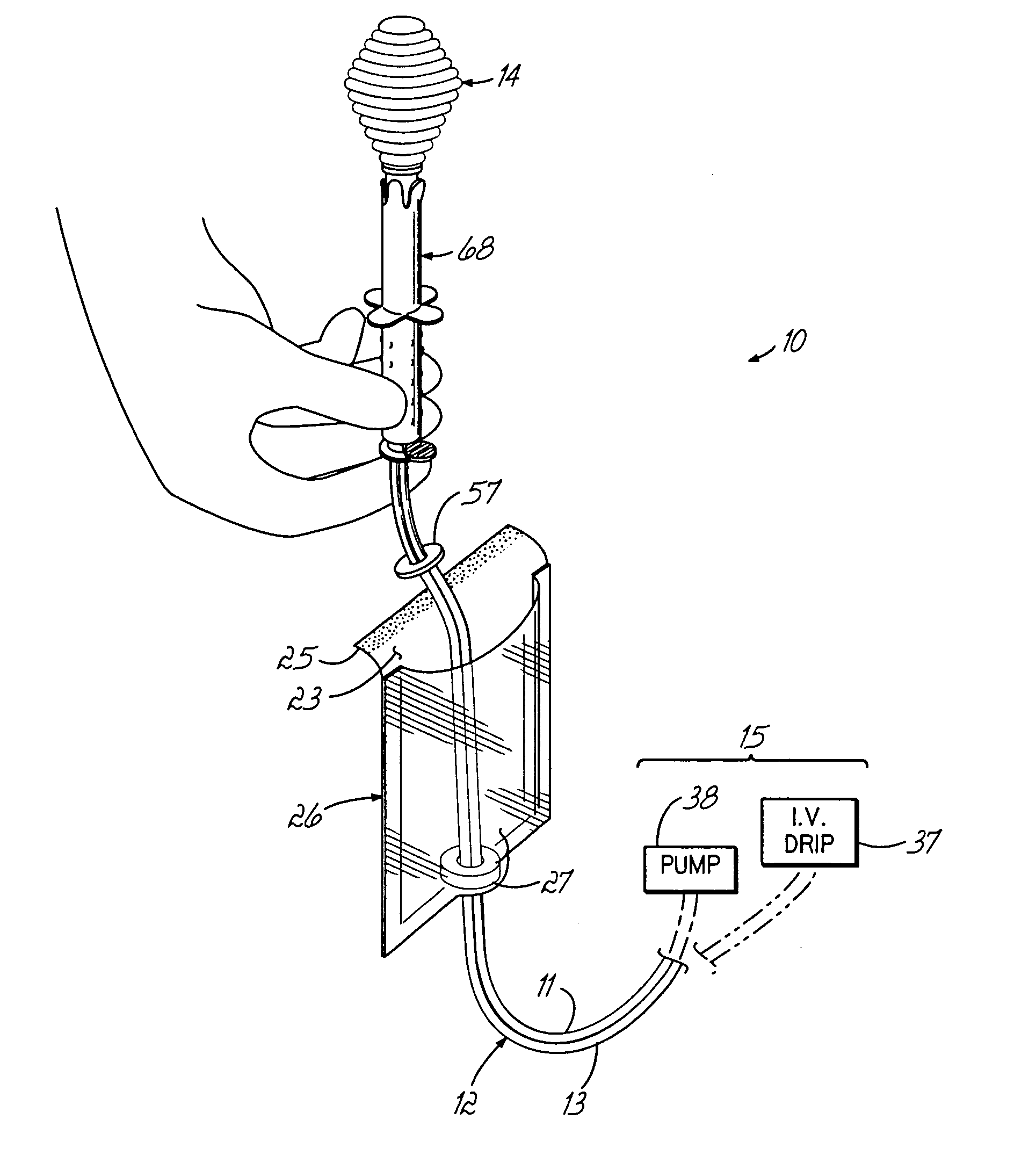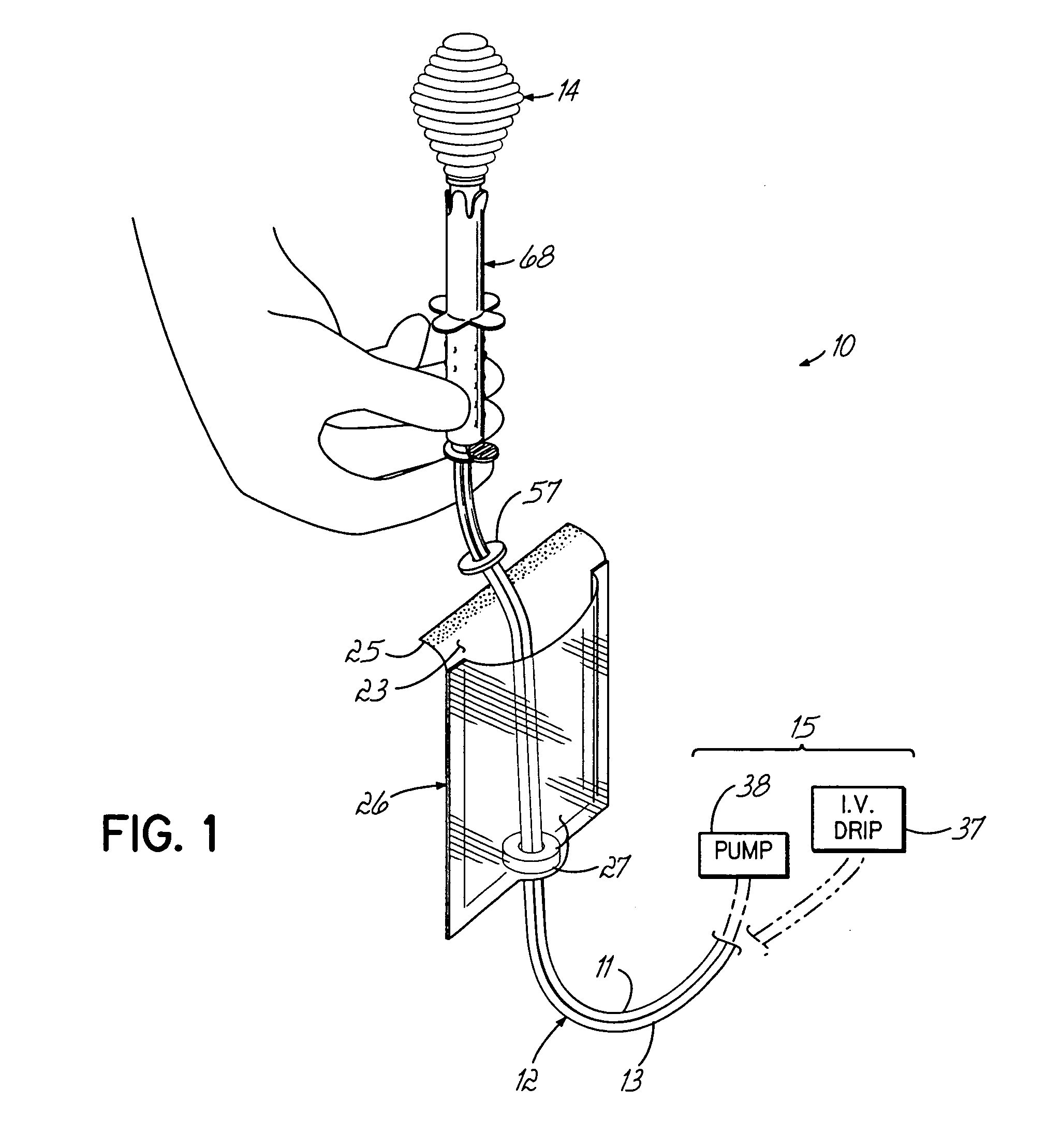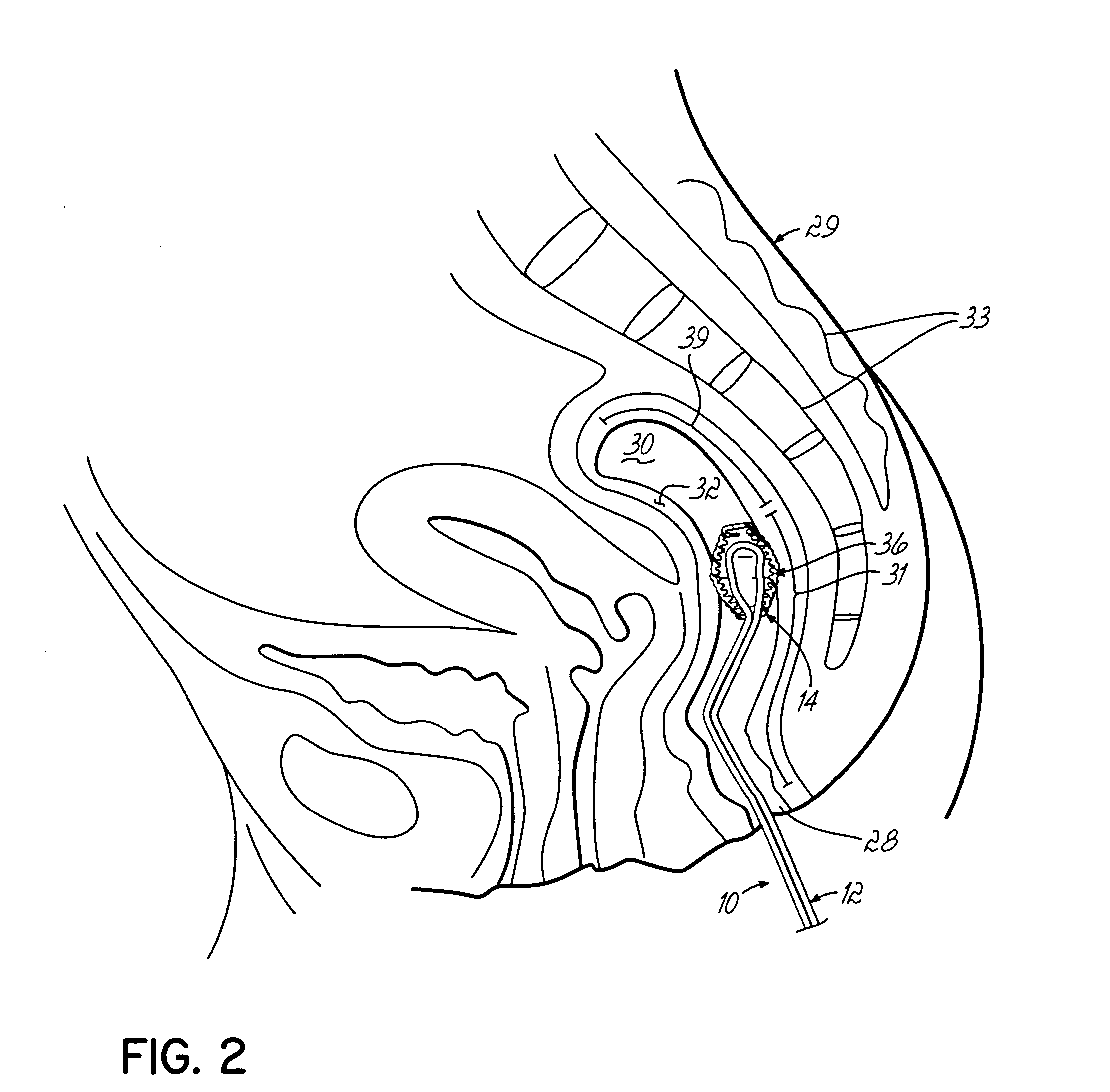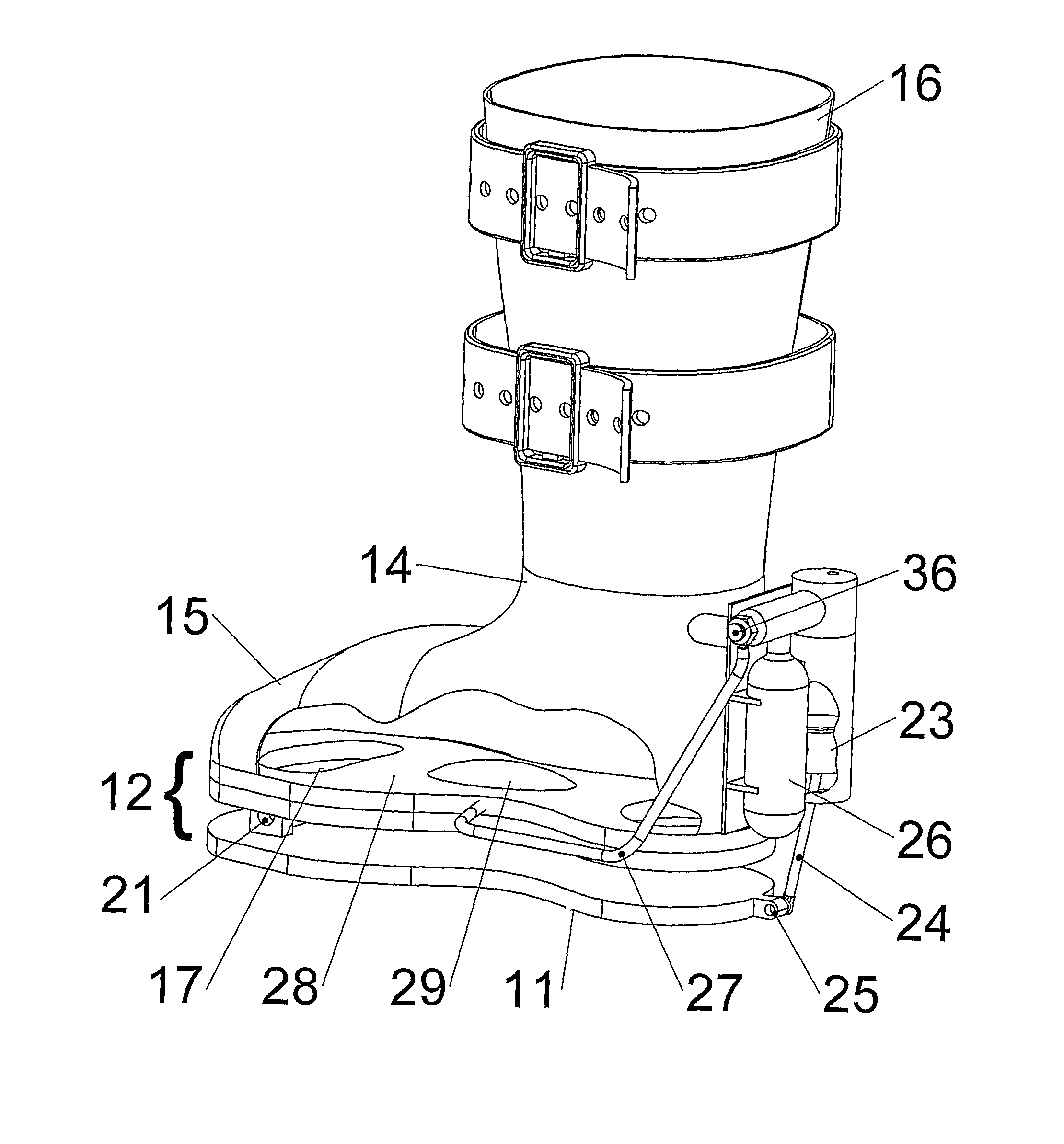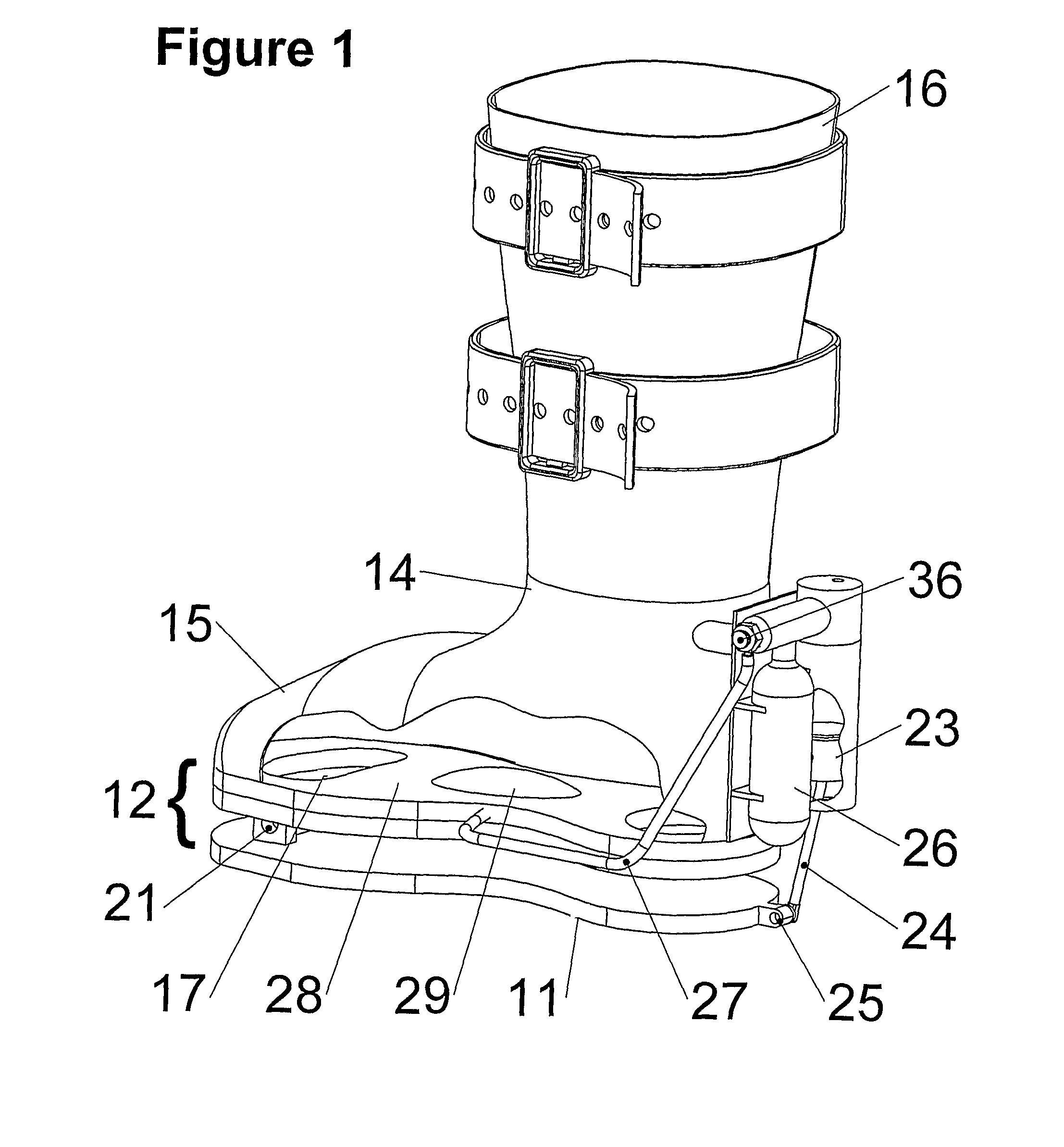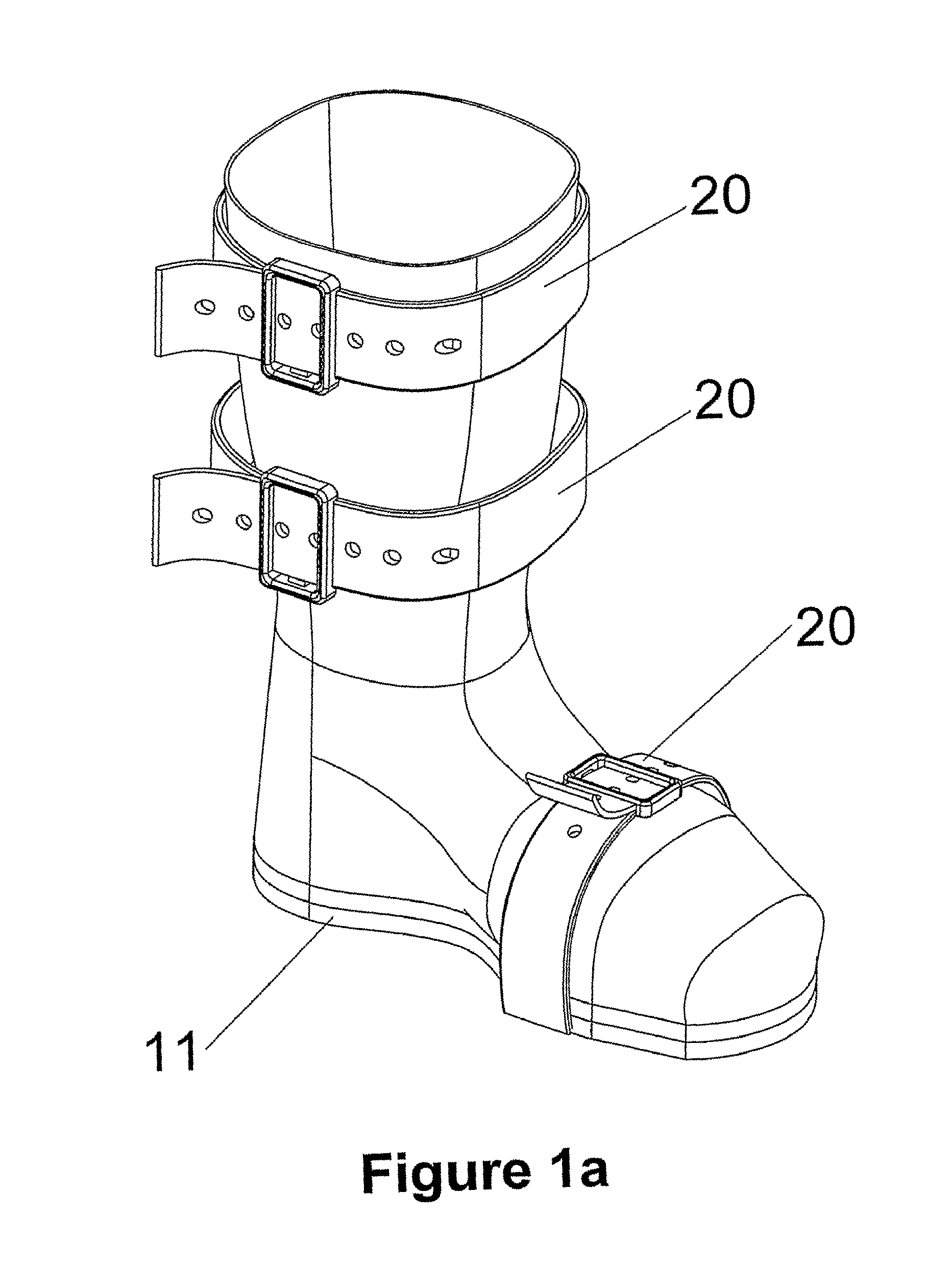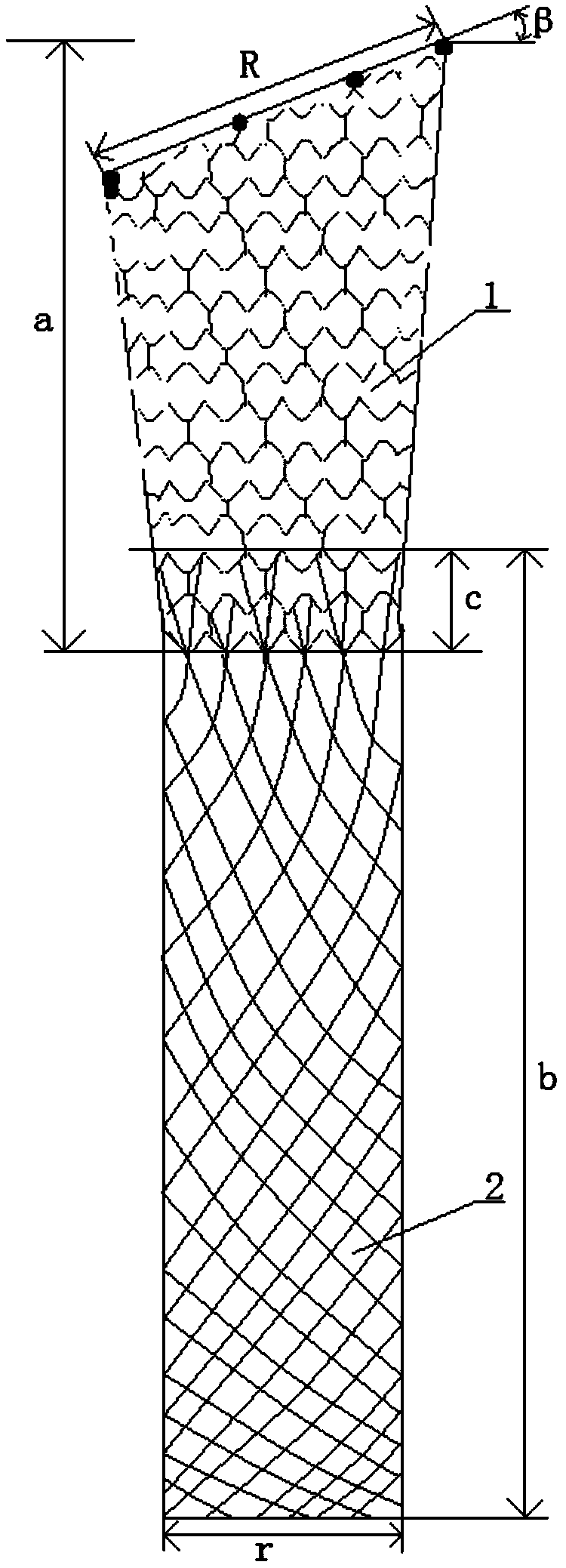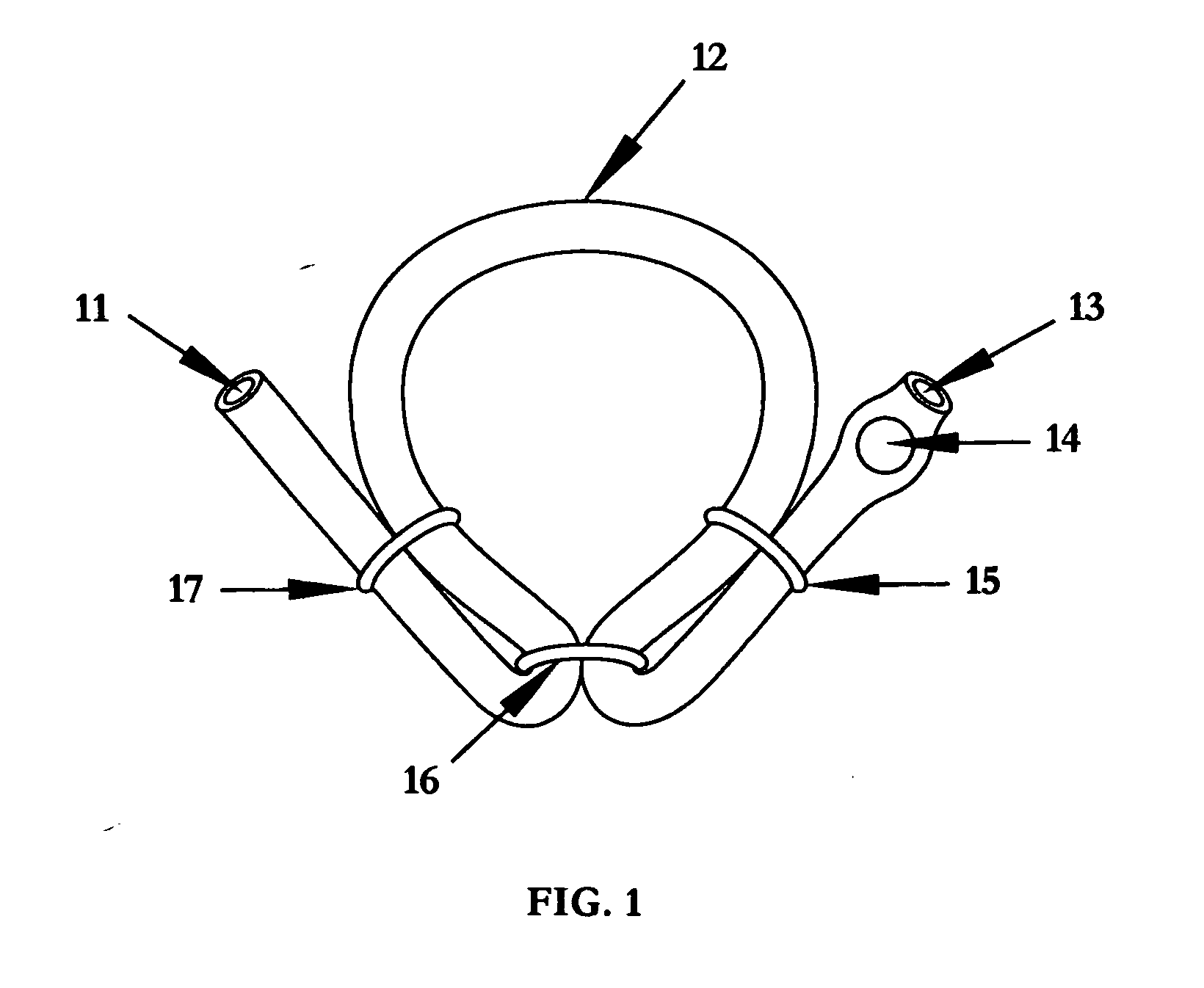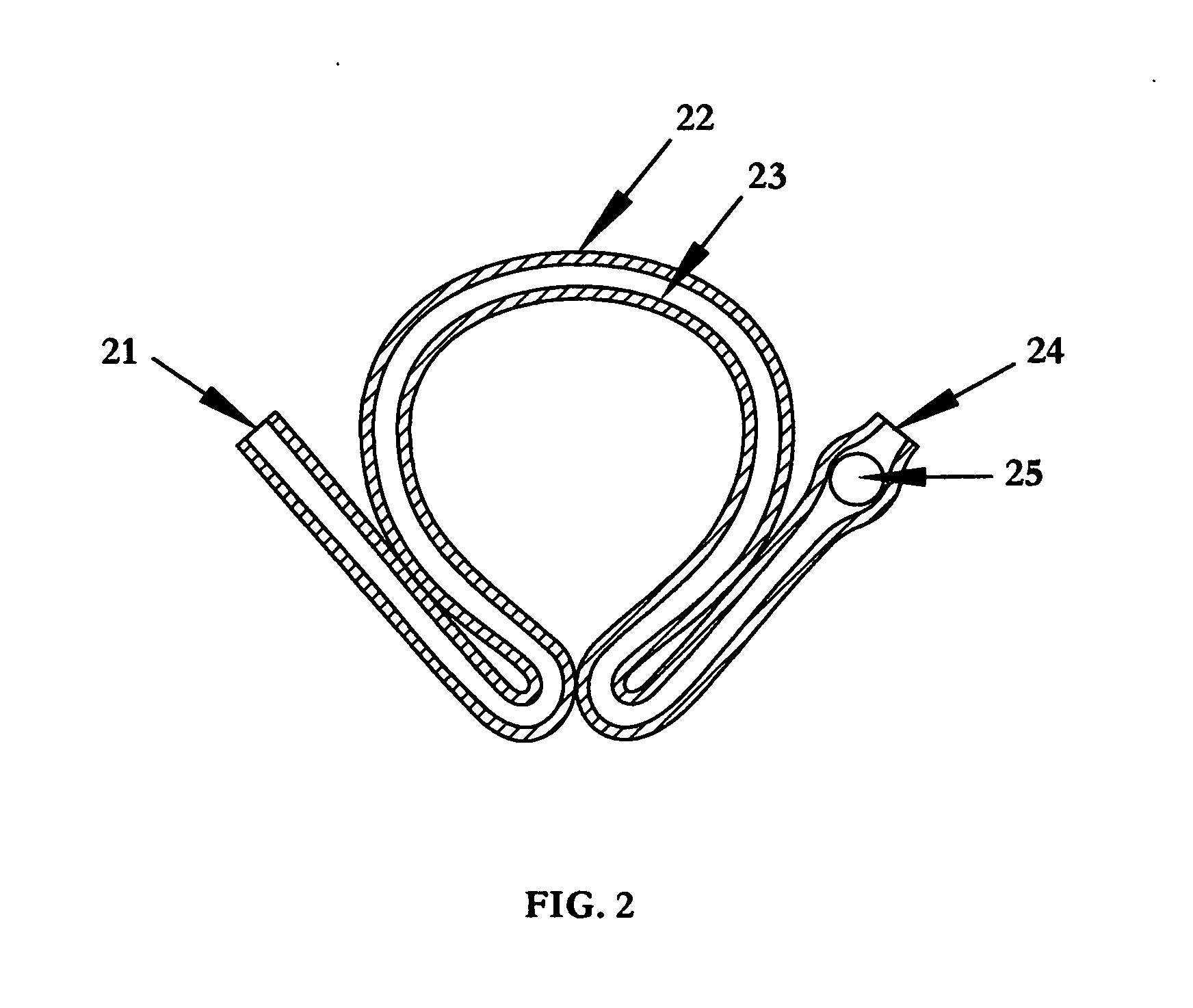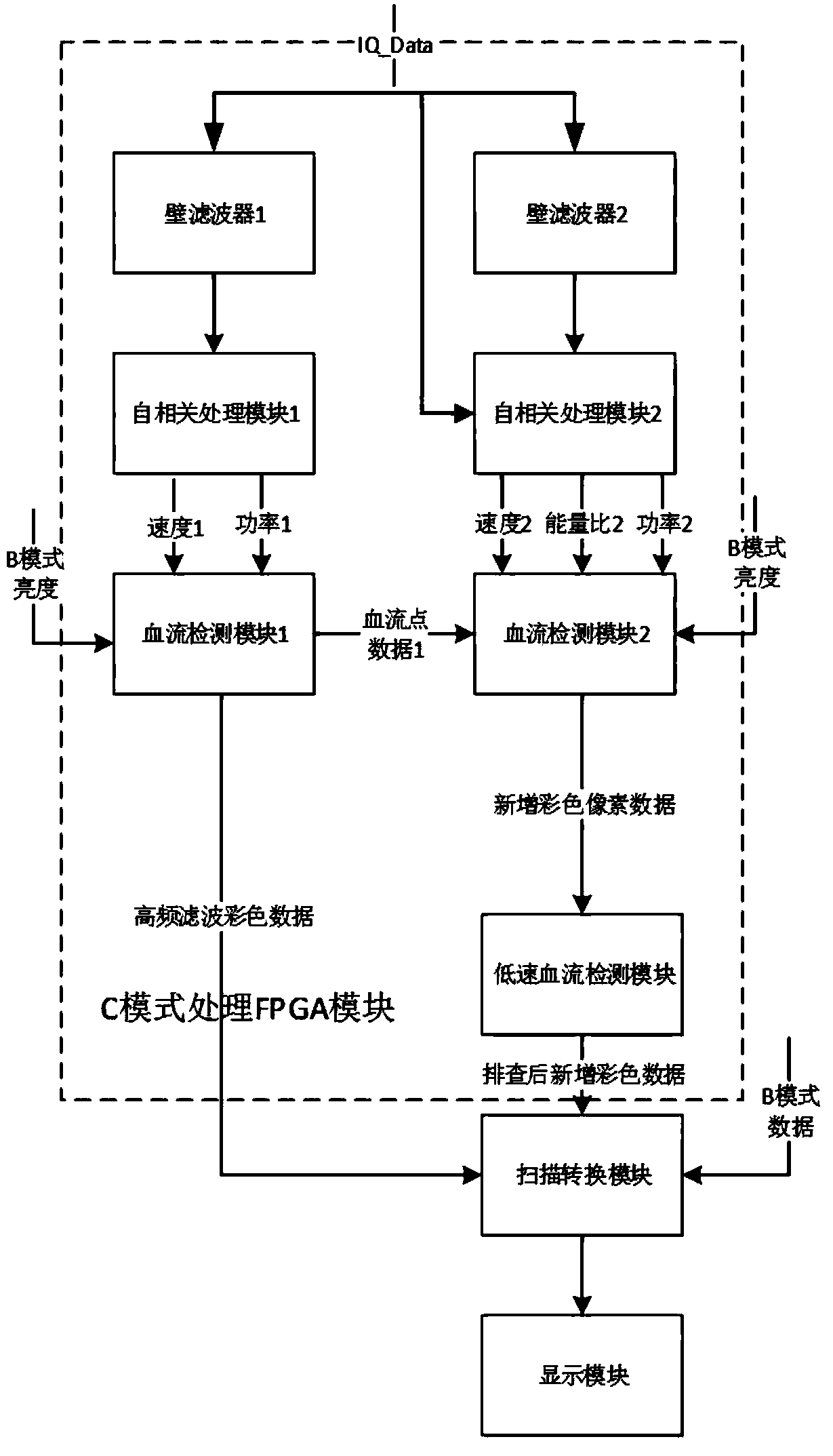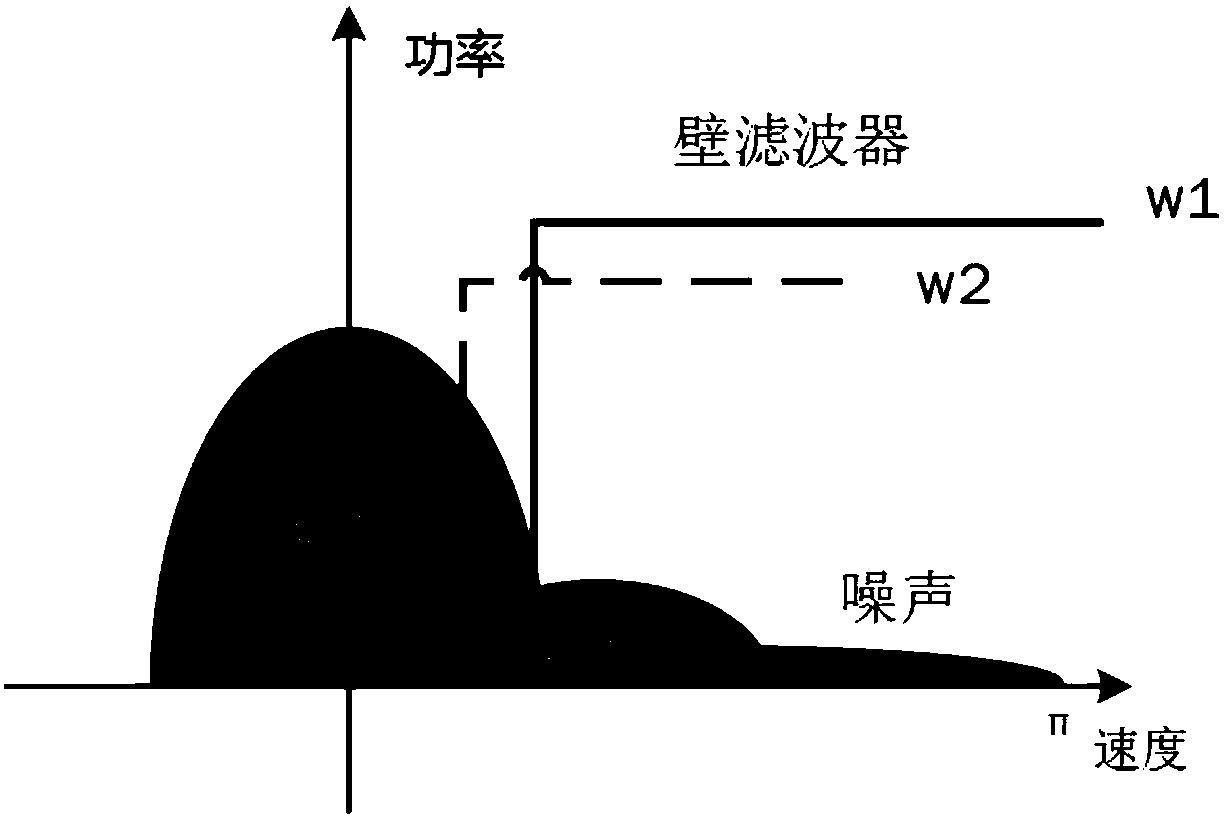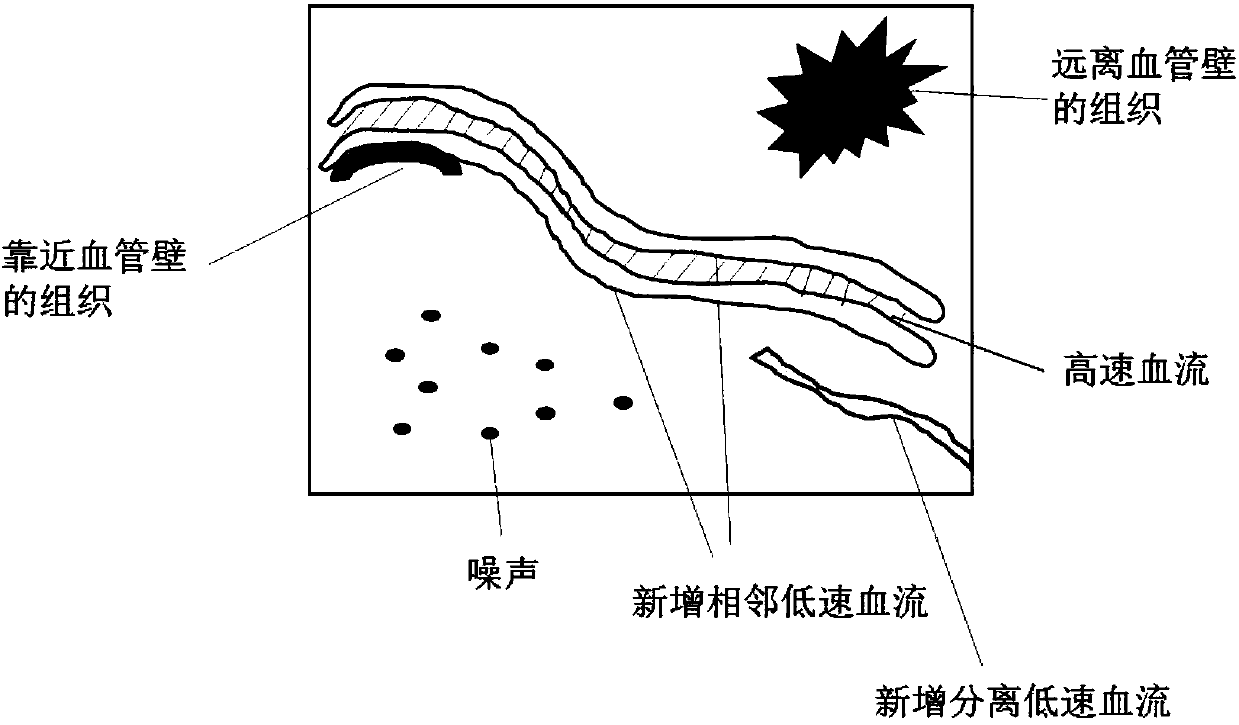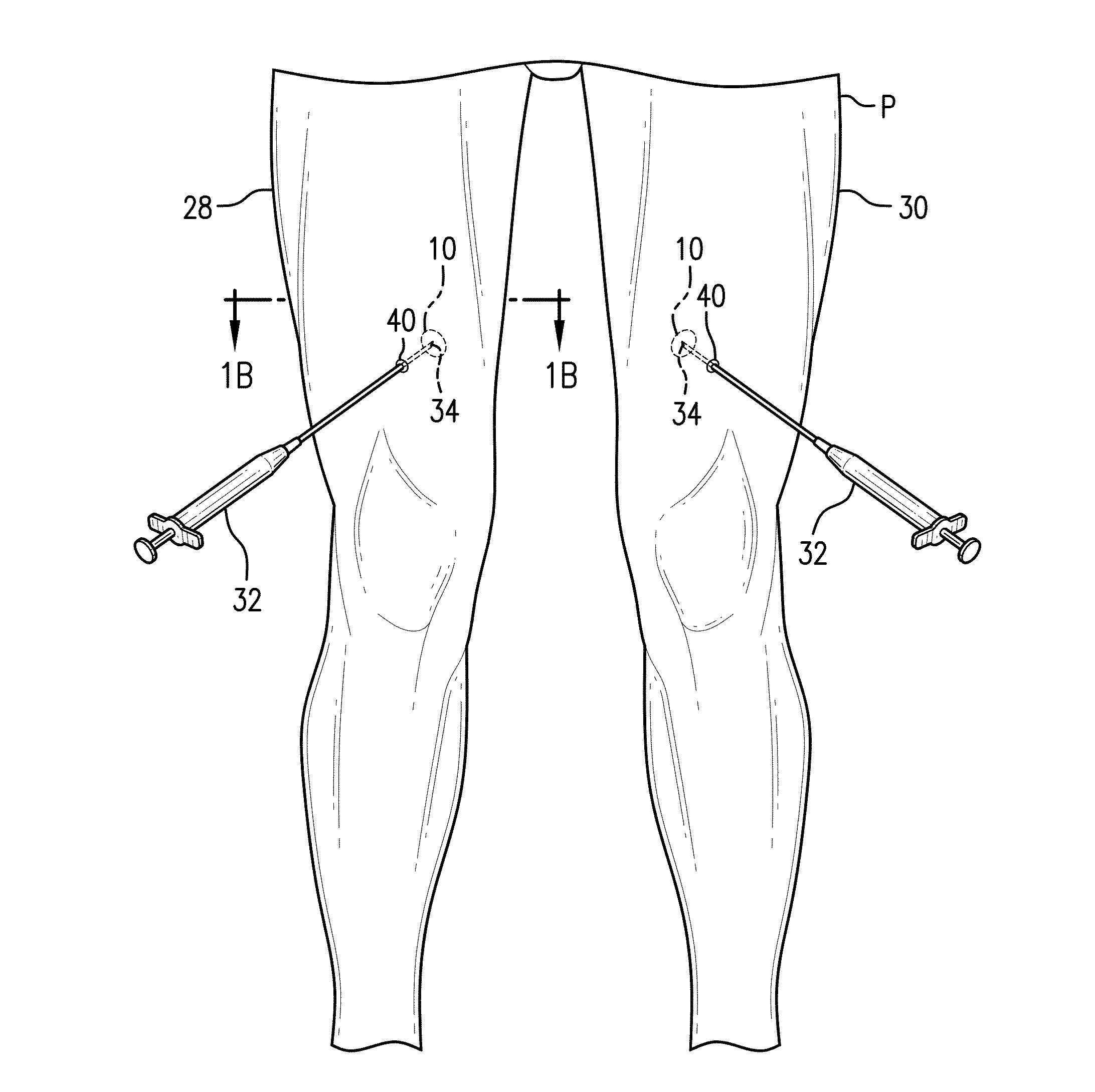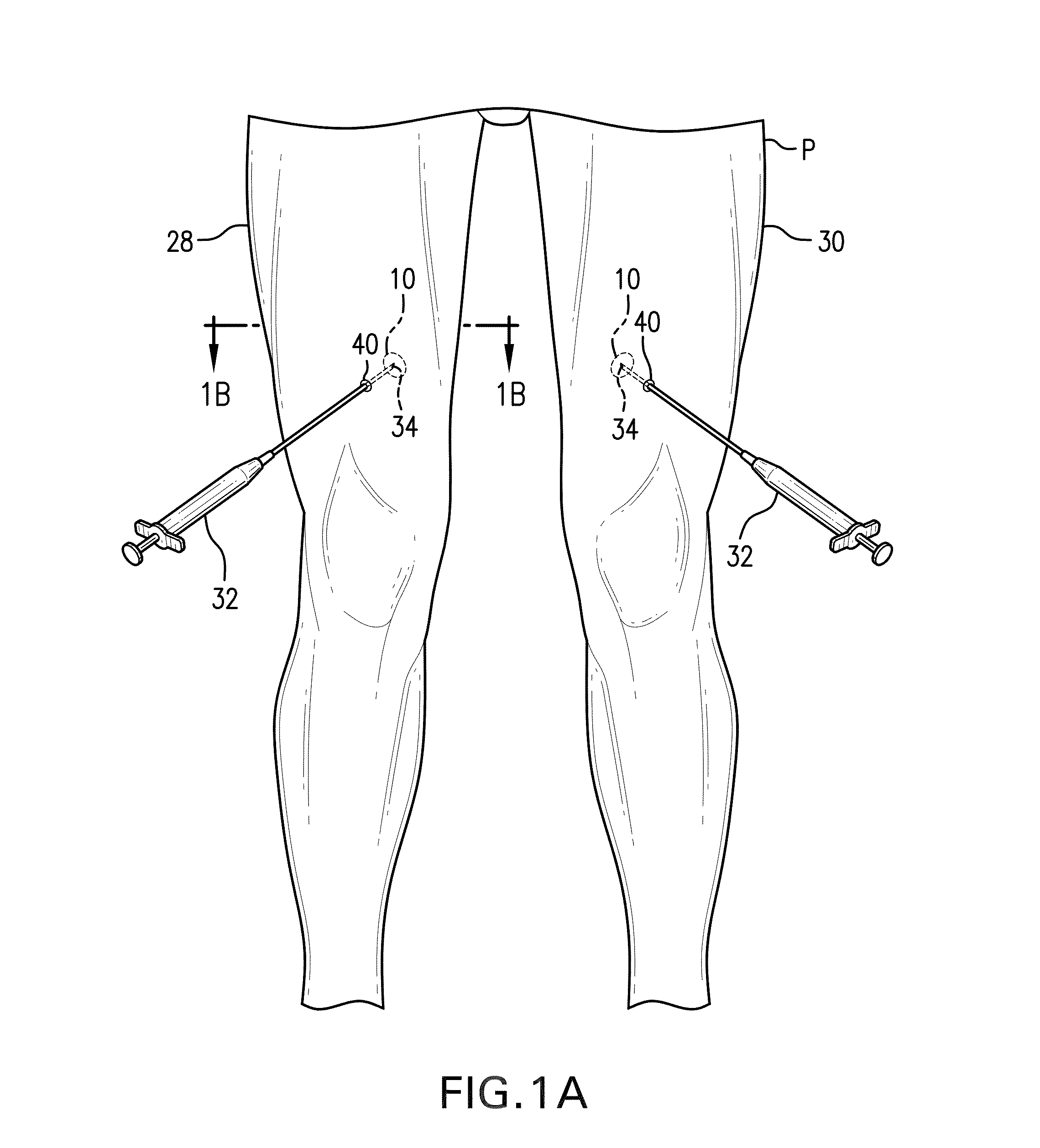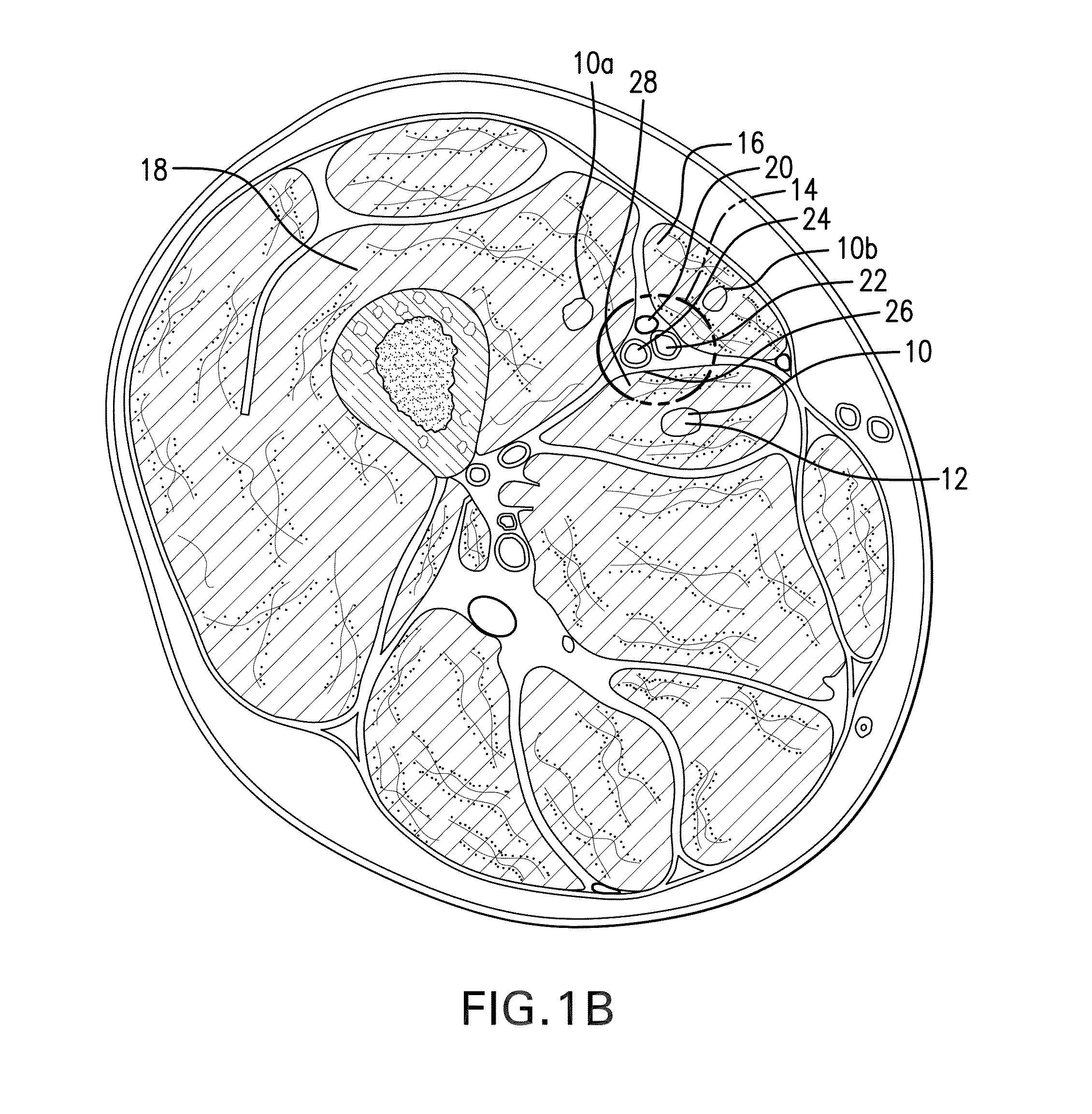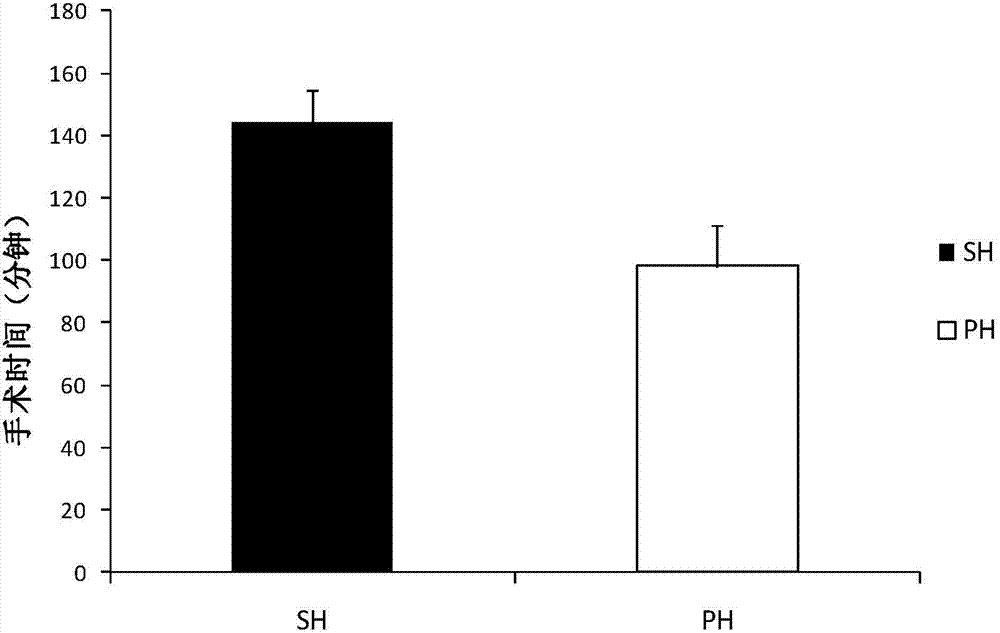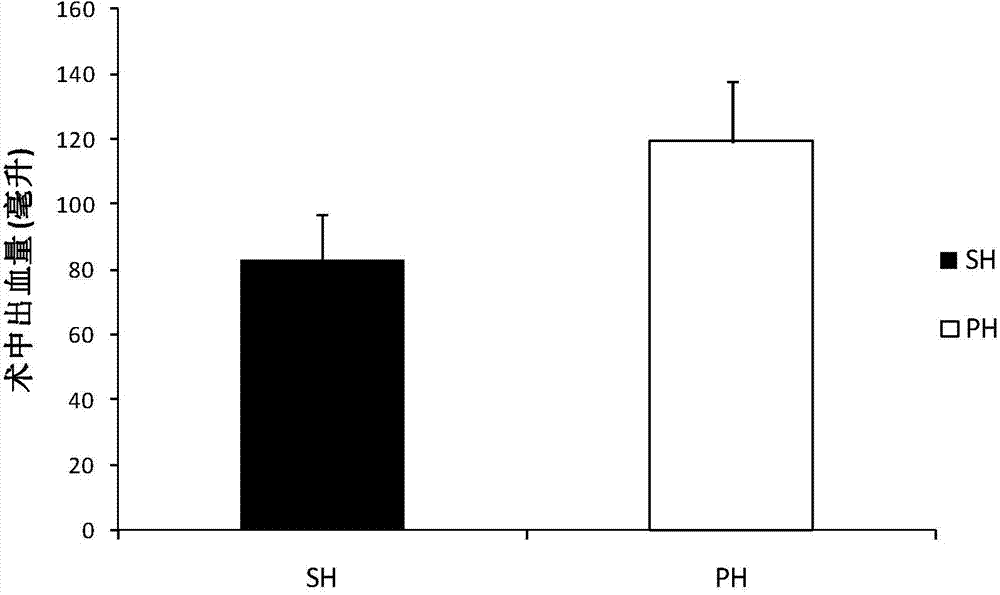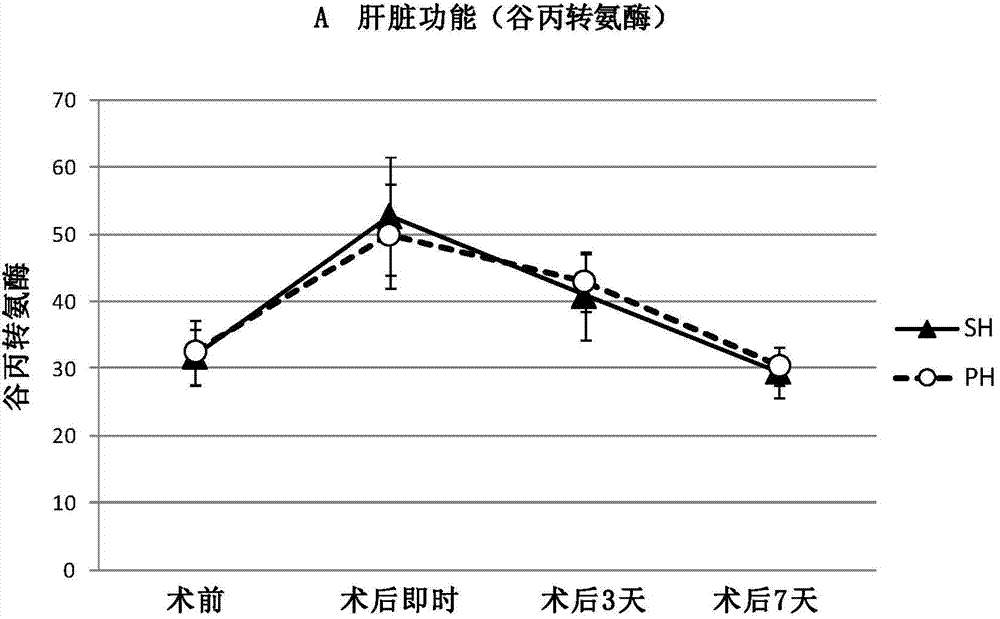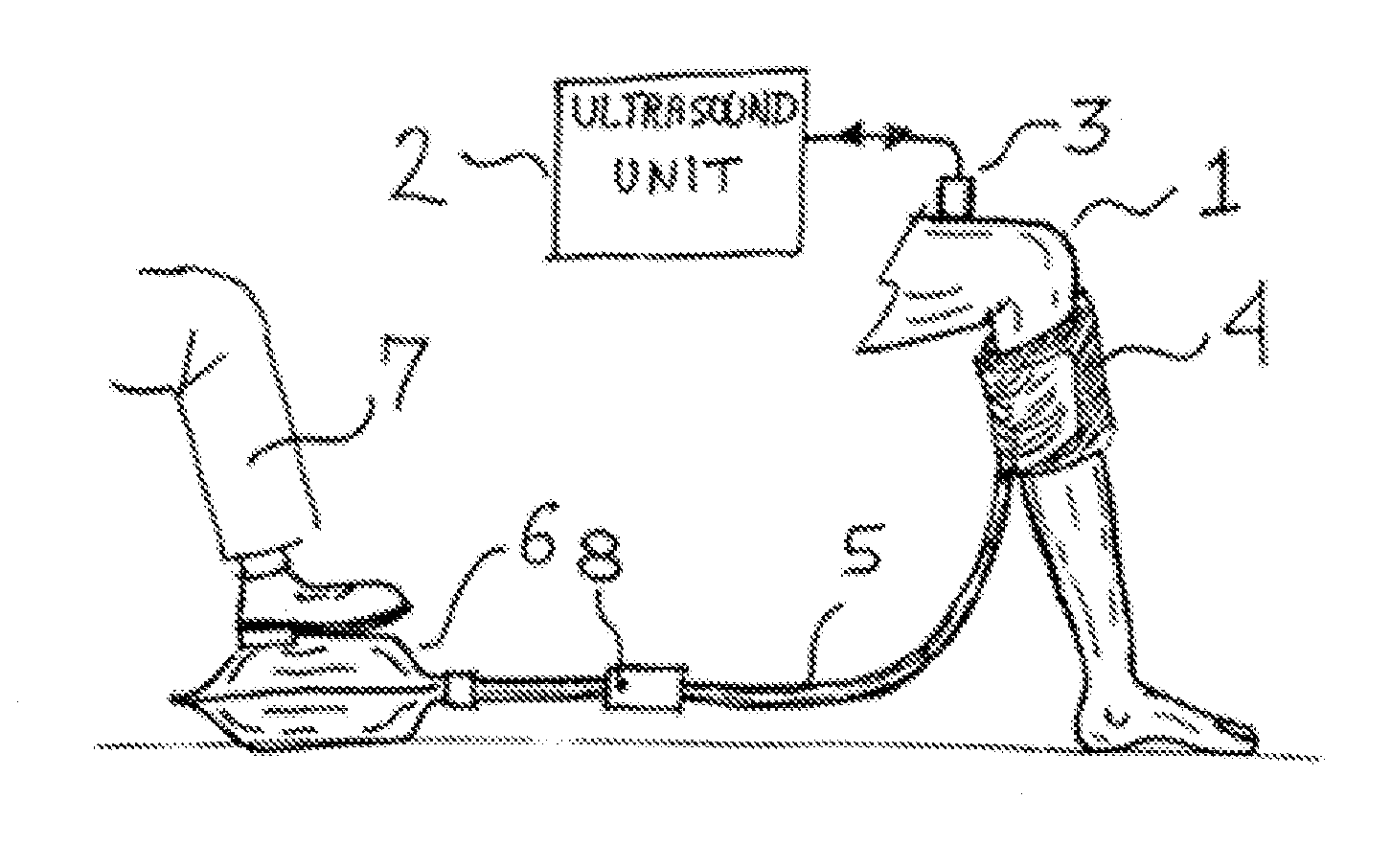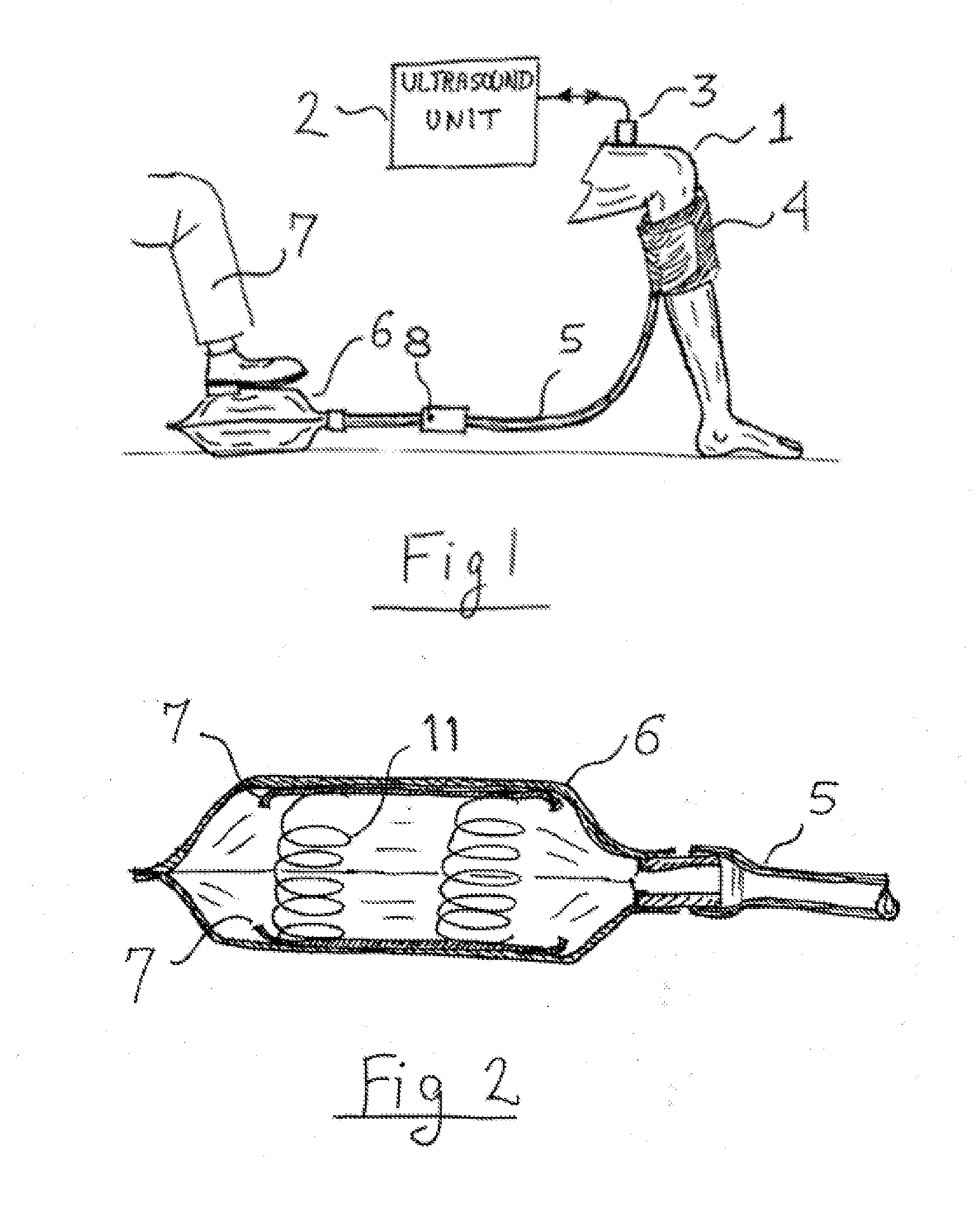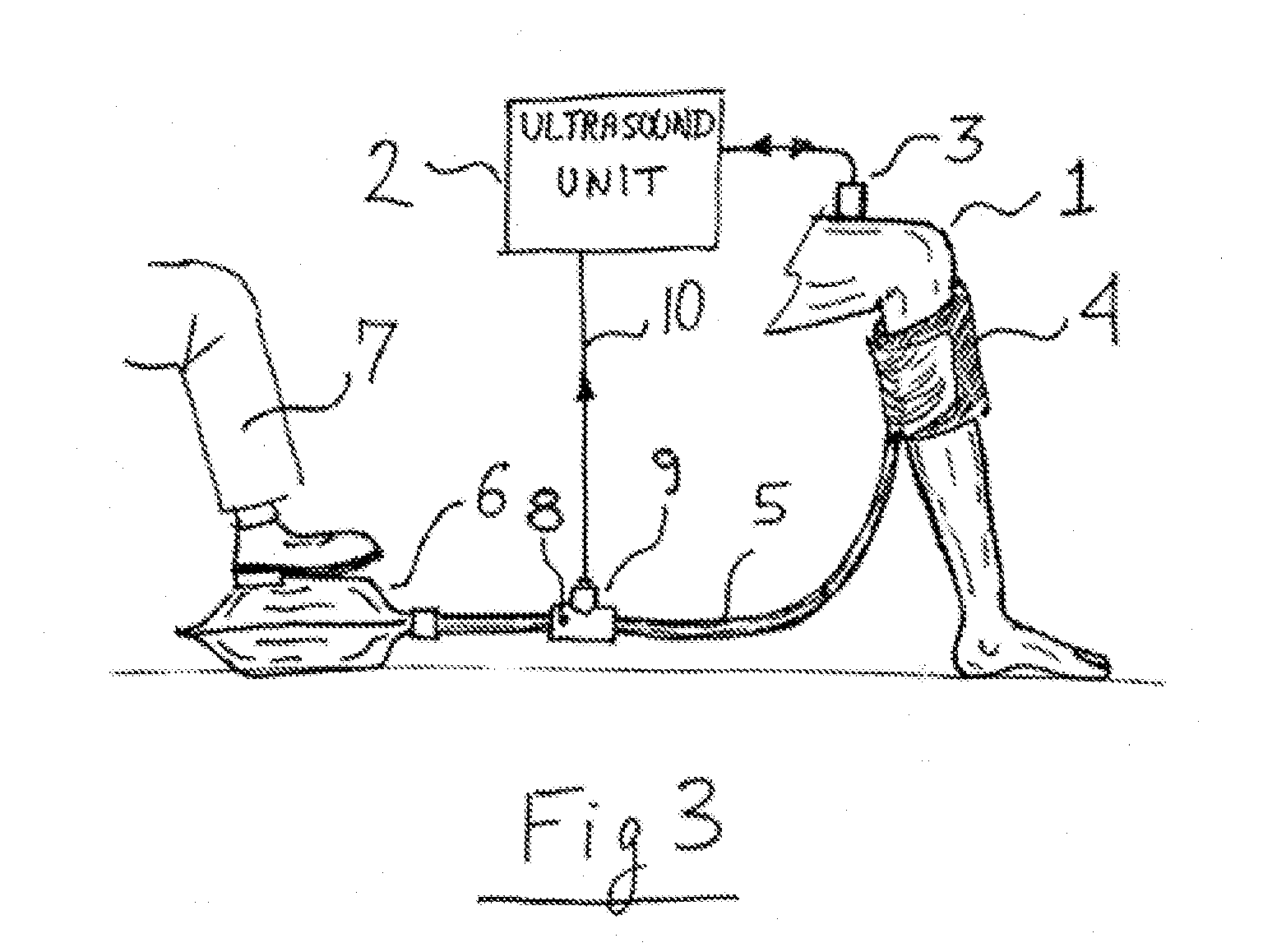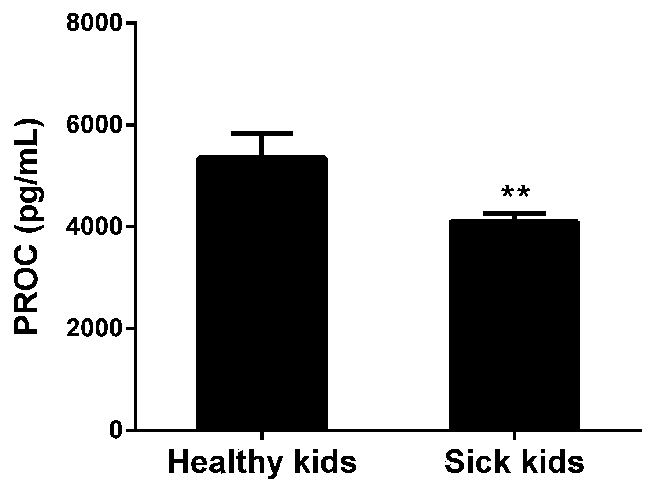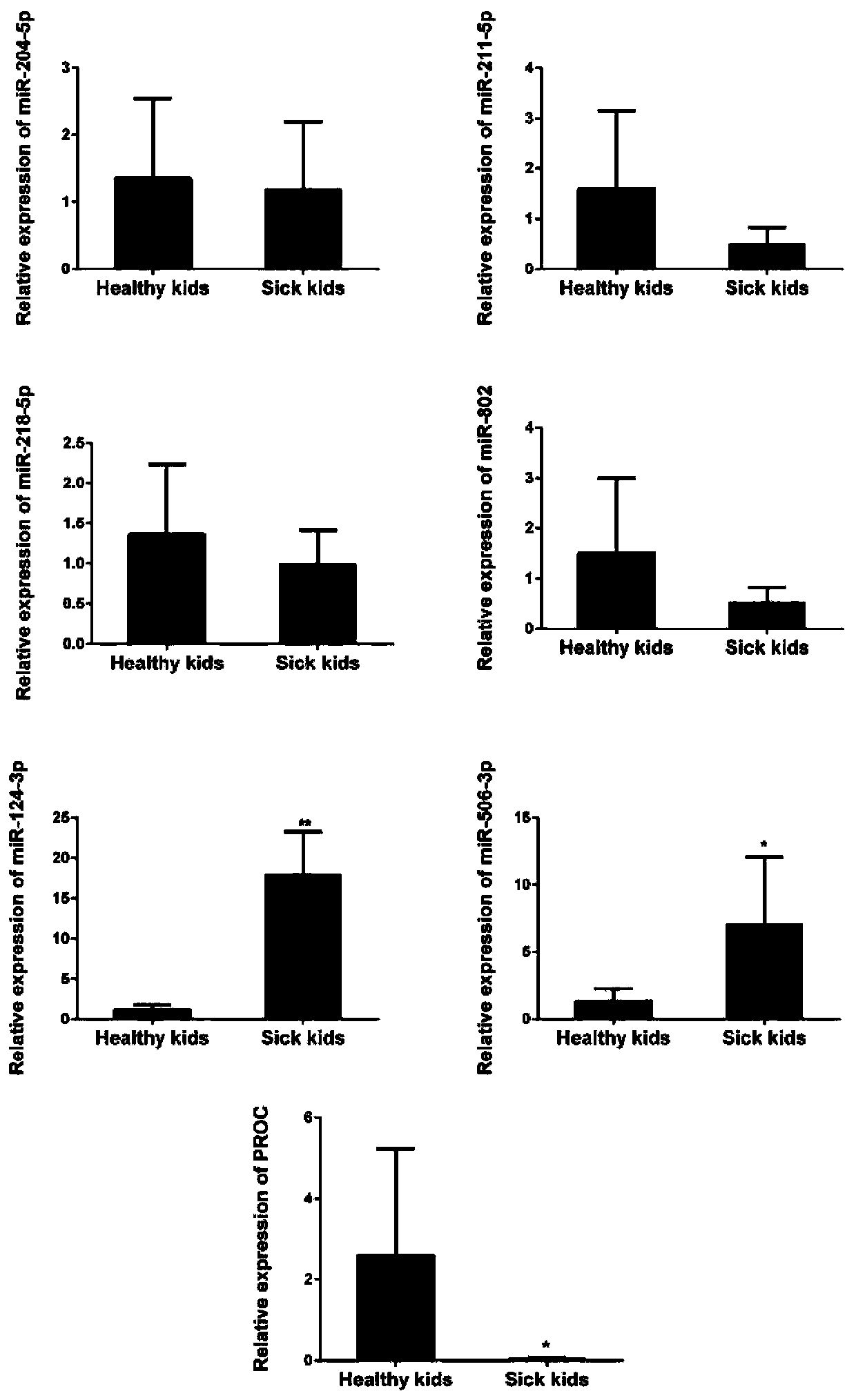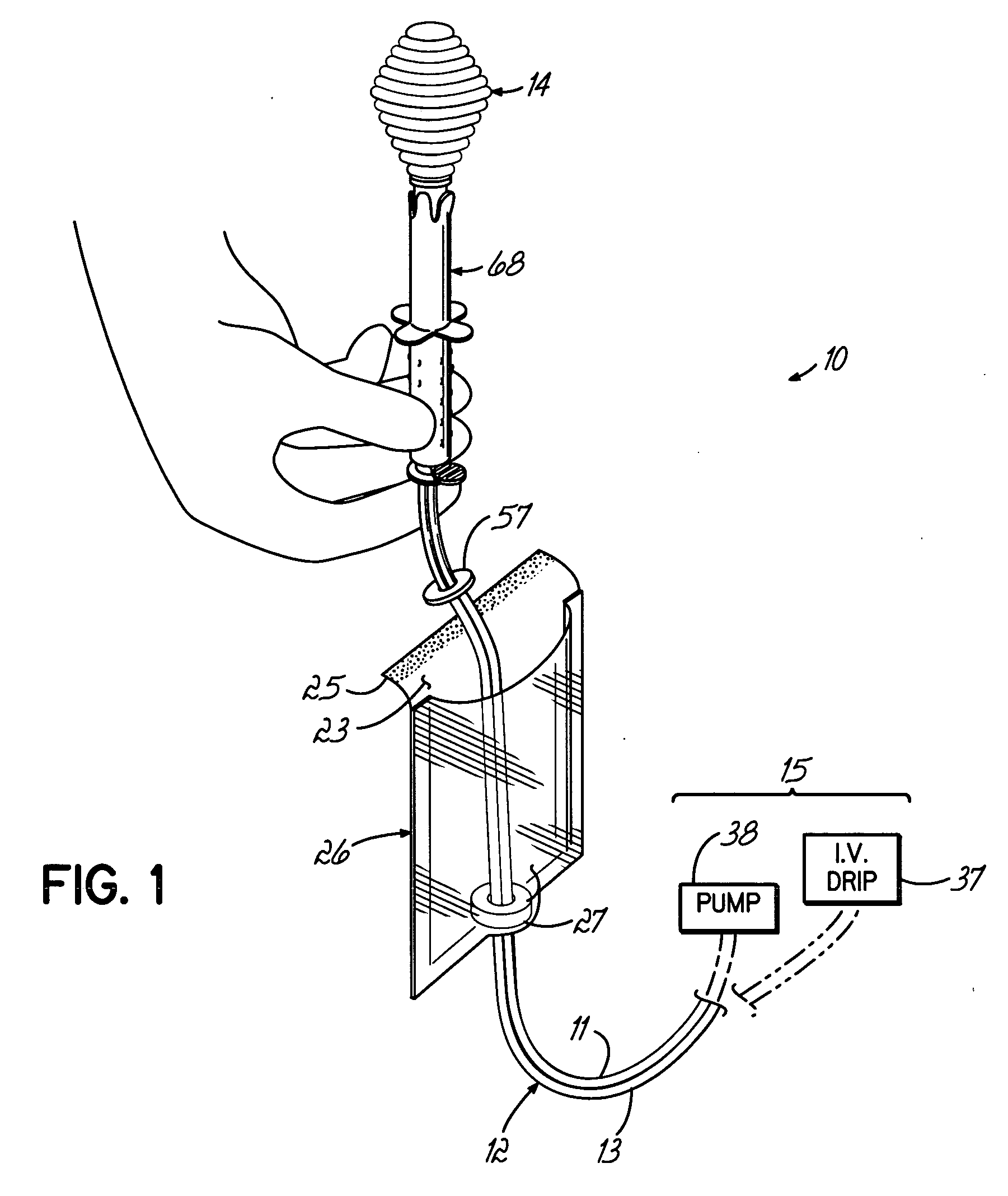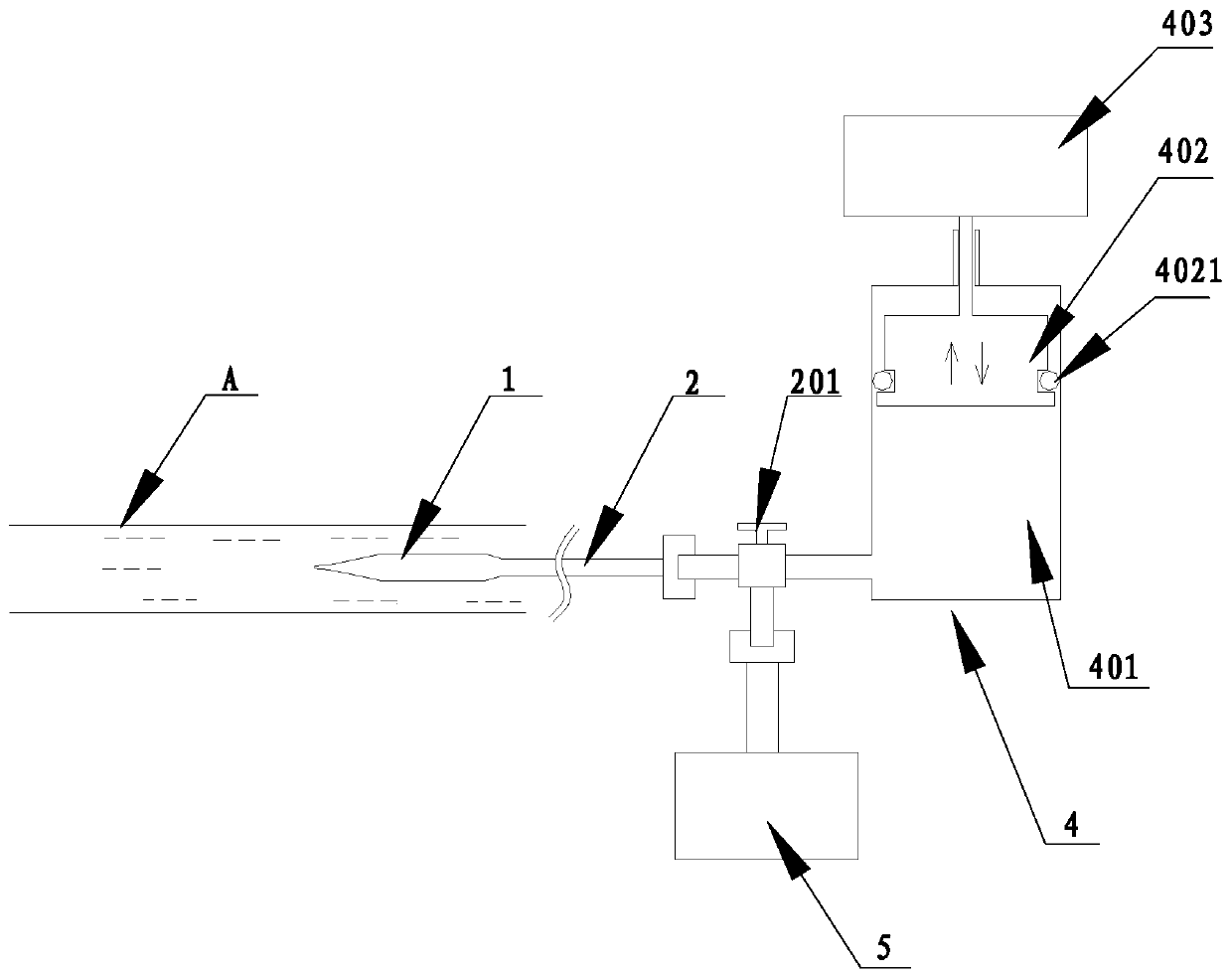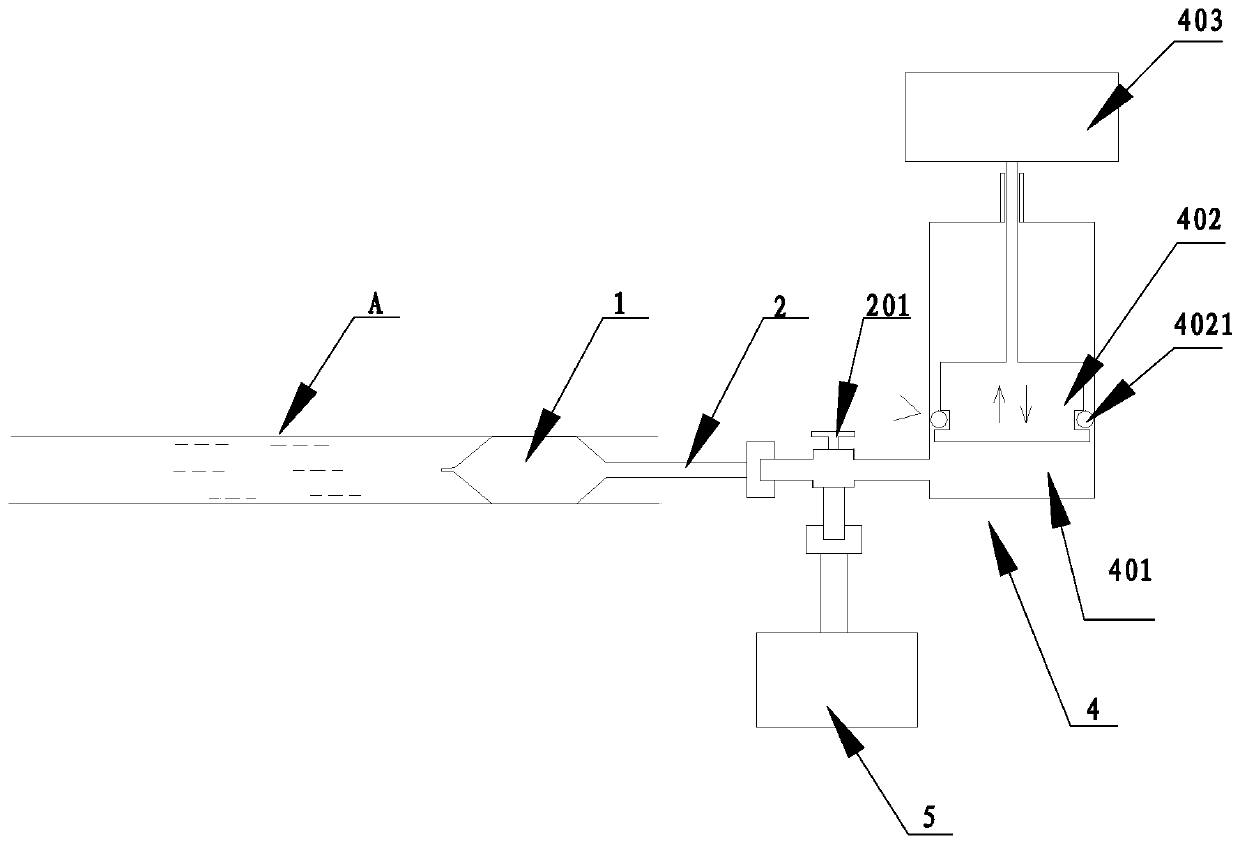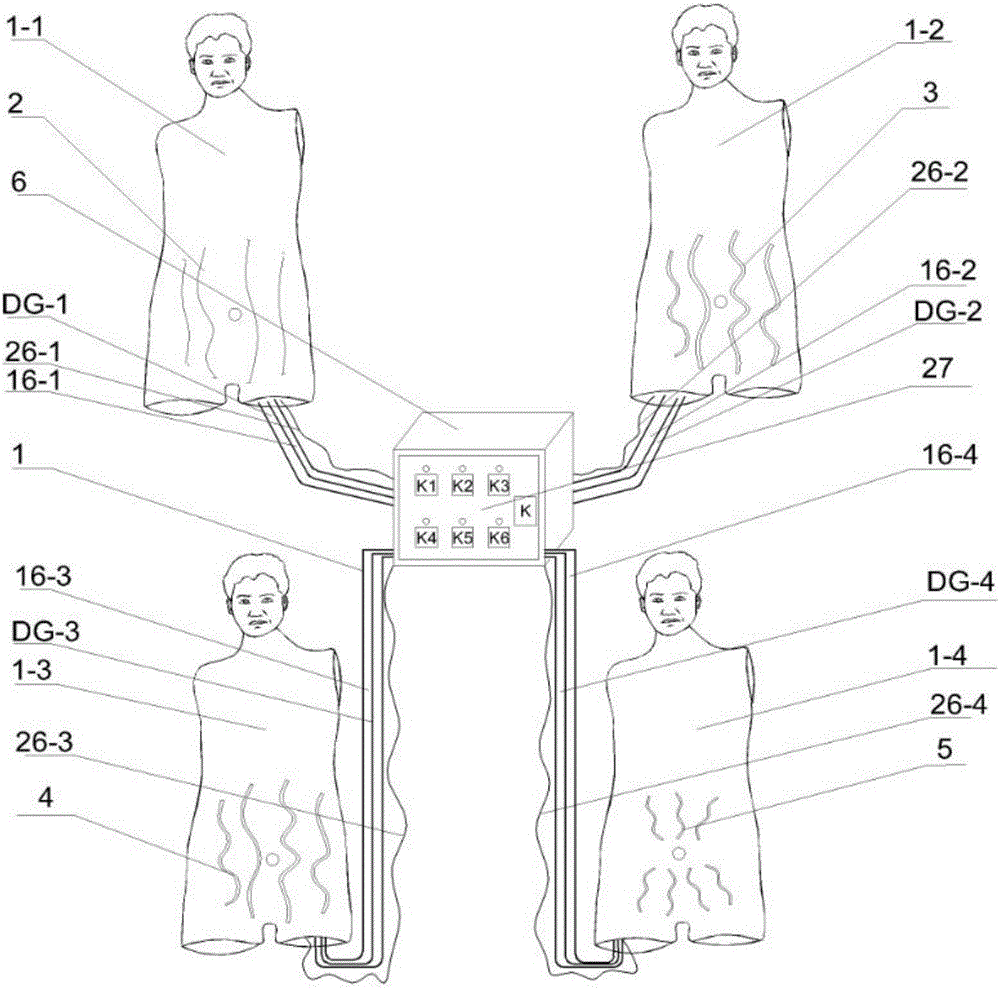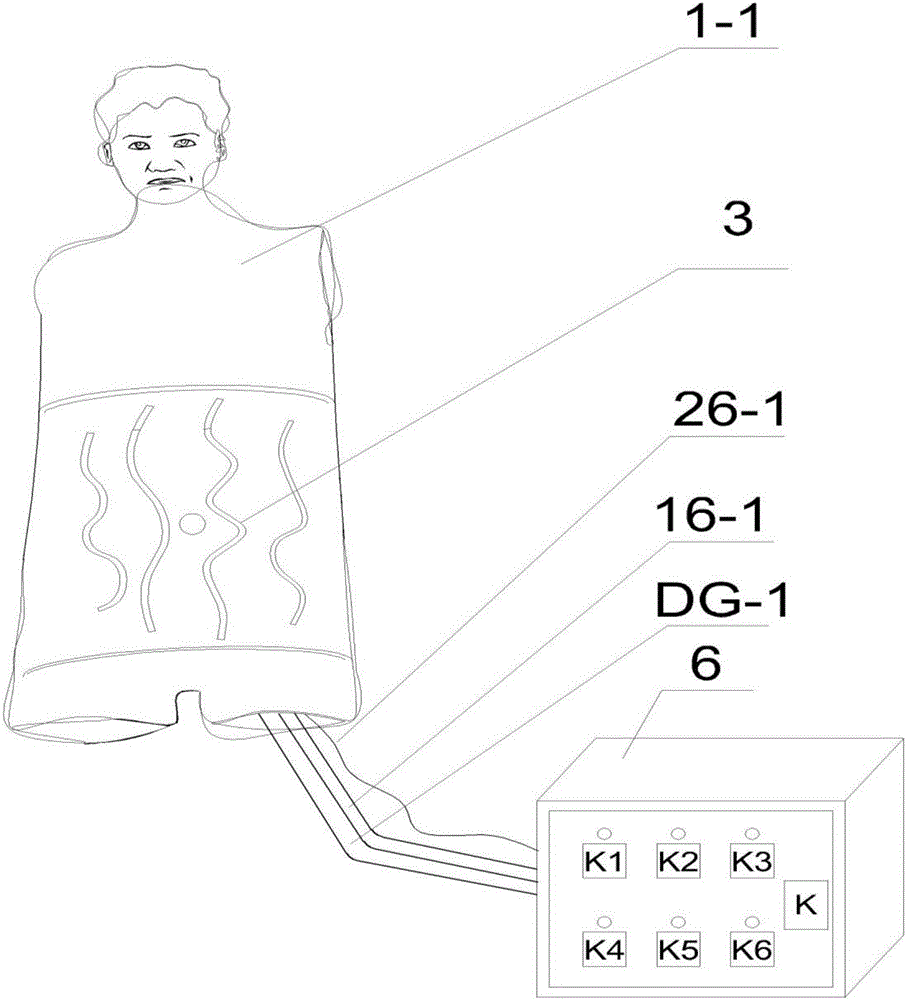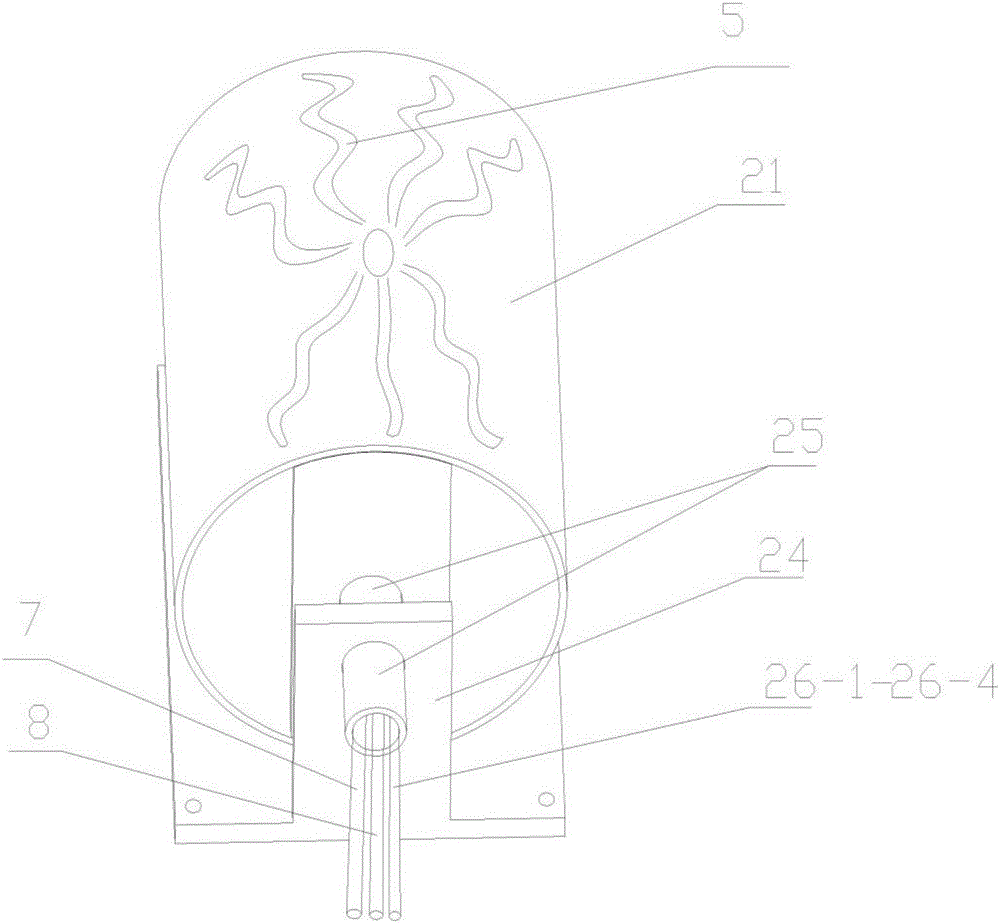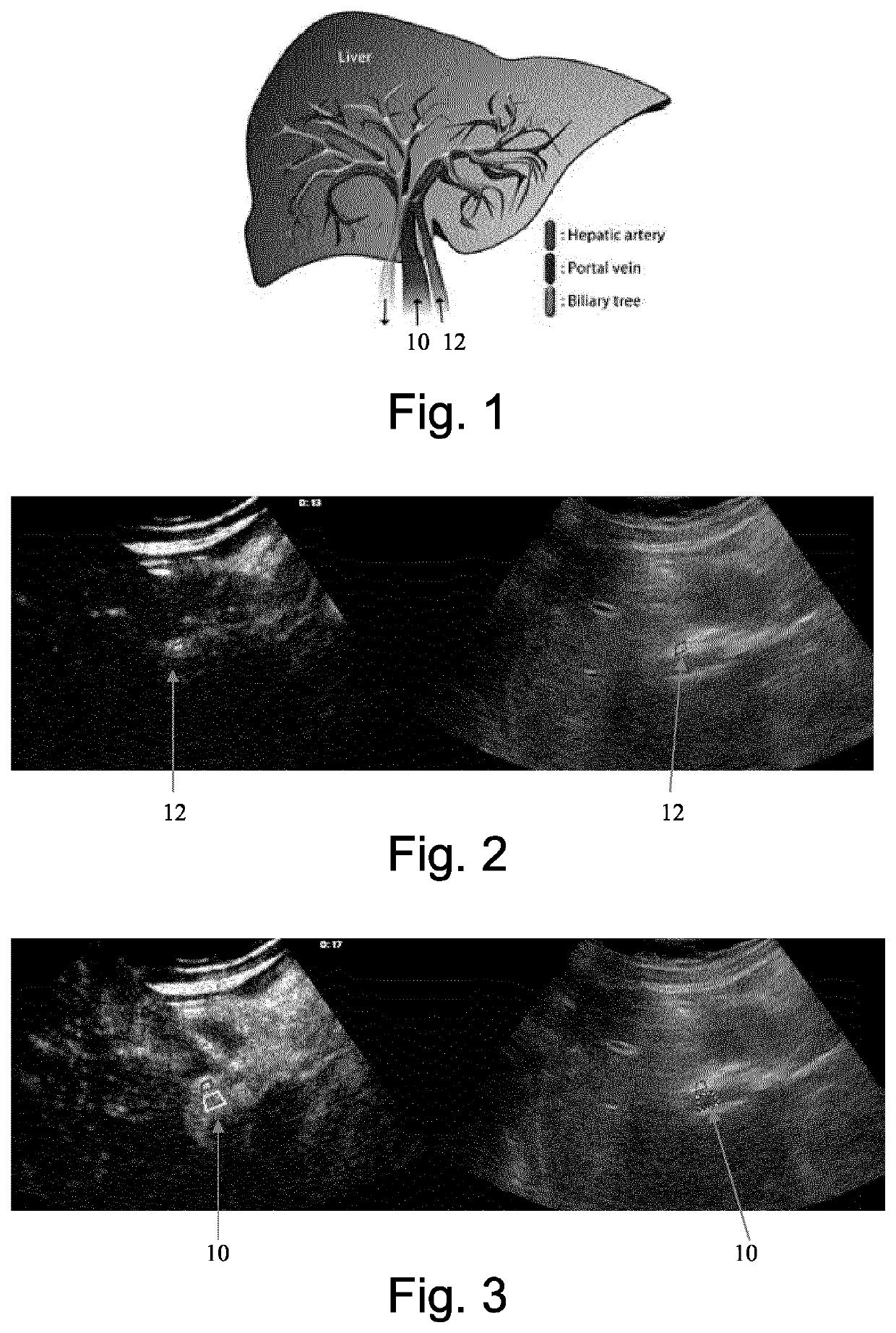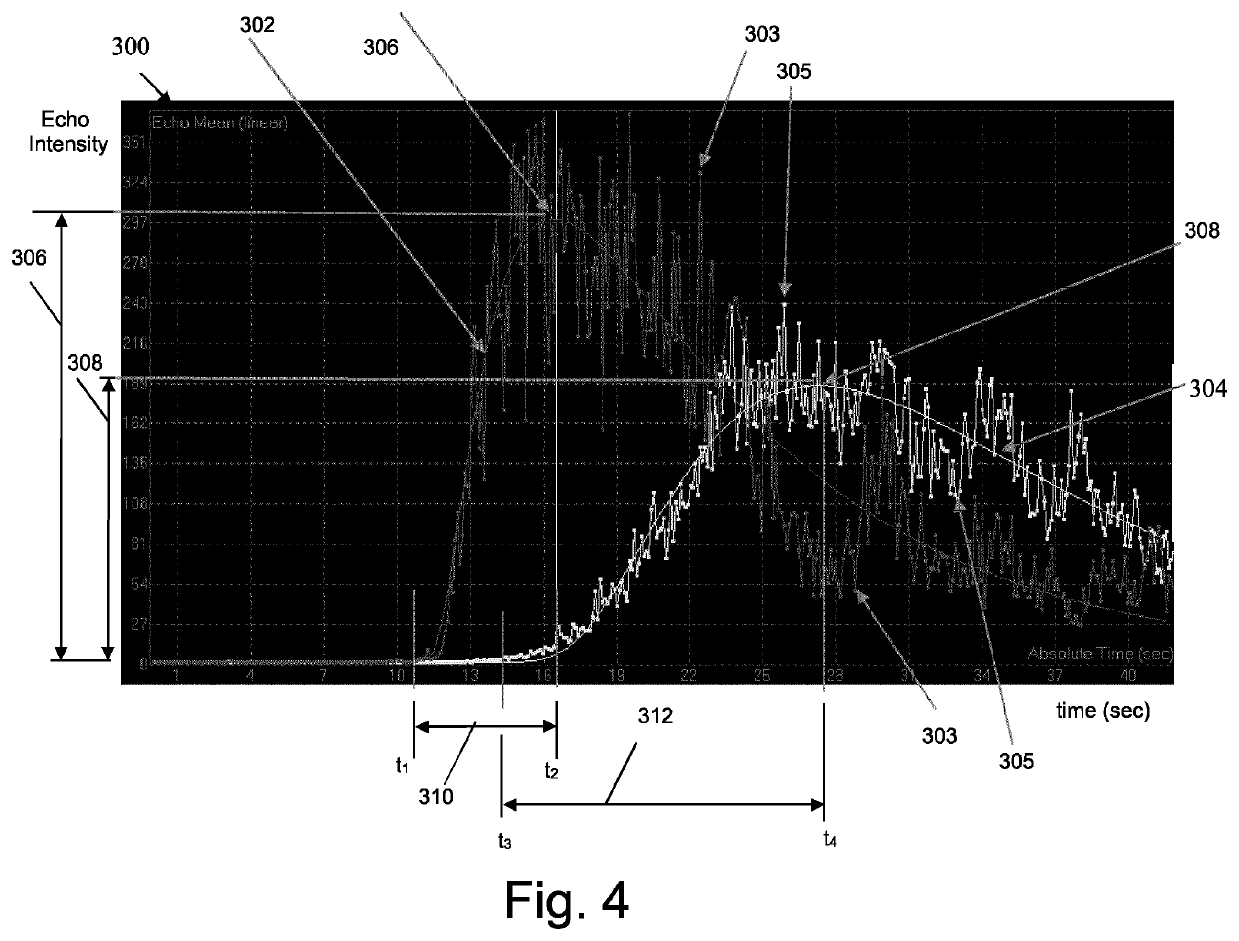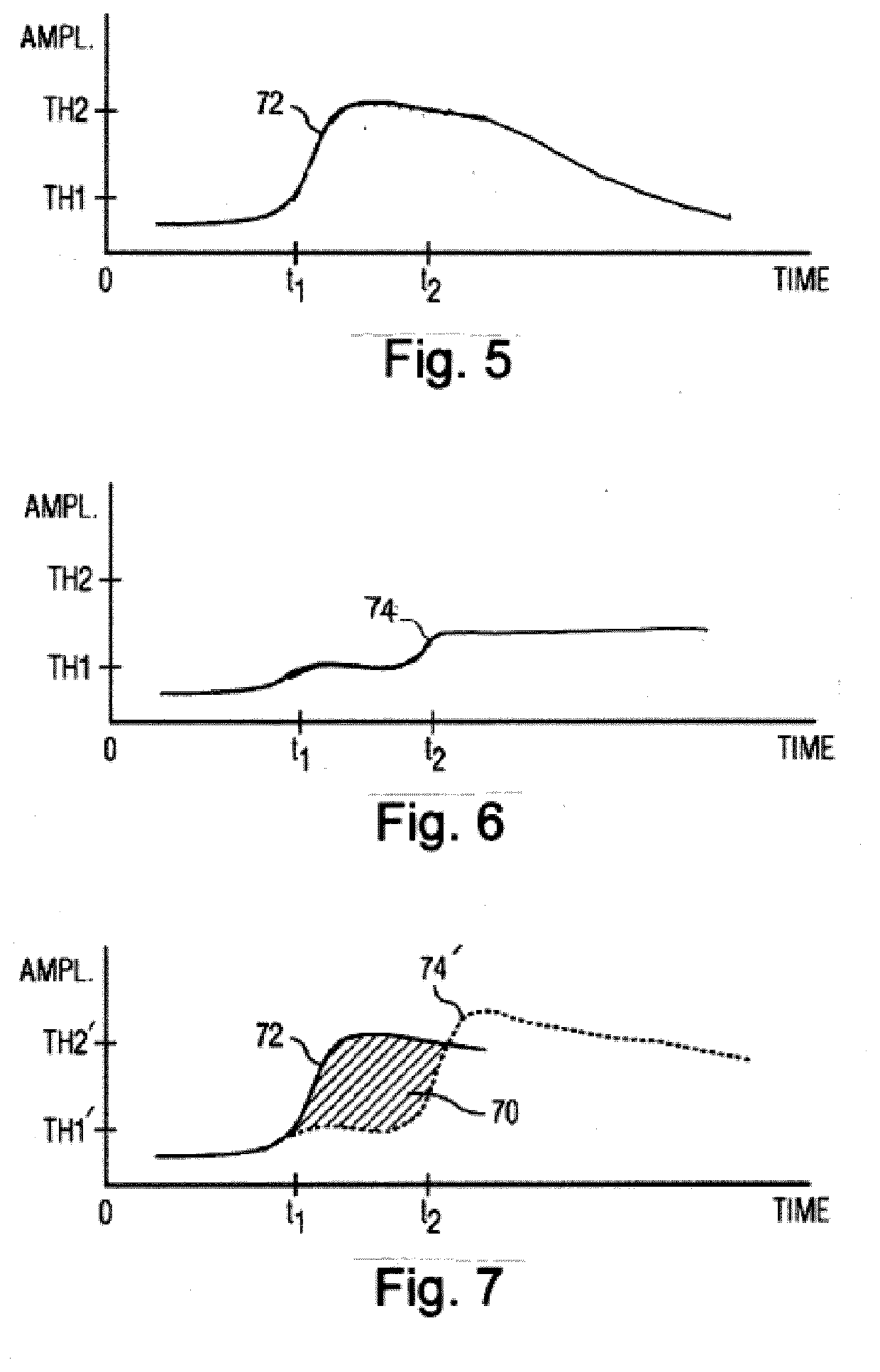Patents
Literature
Hiro is an intelligent assistant for R&D personnel, combined with Patent DNA, to facilitate innovative research.
50 results about "Venous flow" patented technology
Efficacy Topic
Property
Owner
Technical Advancement
Application Domain
Technology Topic
Technology Field Word
Patent Country/Region
Patent Type
Patent Status
Application Year
Inventor
Venous insufficiency is most often caused by either blood clots or varicose veins. In healthy veins, there is a continuous flow of blood from the limbs back toward the heart. Valves within the veins of the legs help prevent the backflow of blood.
Method and apparatus for assisting vascular flow through external compression synchronized with venous phasic flow
An automatic portable ambulant miniaturized system for applying pneumatic pressure to a body limb including a portable ambulant hand-held fluid source unit, a conduit for delivering fluid generated by the unit, and a pressure sleeve coupled to the conduit and adapted to envelop a body limb. The pressure sleeve contains individually inflatable cells, each cell being subdivided into longitudinally extending confluent intra-cell compartments along the axis of the body limb. The intra-cell compartments are inflated and deflated essentially simultaneously by the portable fluid source unit. To increase the pick venous velocity generated by any kind of external compressive force on a limb with any kind of tempo-spatial regime, the venous phasic flow is monitored to determine so that the venous flow generated by the external compressive force can be synchronized with the in-phasic natural venous flow.
Owner:ZIMMER SURGICAL
Method of delivering a TNF antagonist to the brain of a human by perispinal administration without direct intrathecal injection
InactiveUS7214658B2Improve cognitive functionReduce deliveryAnimal cellsOrganic active ingredientsEtanerceptTnf antagonists
The present invention provides specific methods of using and administering etanercept to improve cognitive function in a human, for both the treatment and prevention of cognitive impairment, or, alternatively, to enhance cognitive function including Alzheimer's Disease, Idiopathic Dementia, and Traumatic Brain Injury. The methods of the present invention include the perispinal administration of etanercept. For the purposes of this patent “perispinal” is to be considered as referring to “perispinal extrathecal;” therefore direct intrathecal administration is excluded. Perispinal administration leads to enhanced delivery of etanercept to the brain in a therapeutically effective amount, via the vertebral venous system and / or the cerebrospinal fluid. Delivery of etanercept to the brain utilizing the methods of the present invention includes the use of the vertebral venous system to deliver etanercept to the brain via retrograde venous flow. Physical maneuvers are used to enhance delivery of etanercept to the brain via this route.
Owner:TACT IP
Method and apparatus for assisting vascular flow through external compression synchronized with venous phasic flow
An automatic portable ambulant miniaturized system for applying pneumatic pressure to a body limb including a portable ambulant hand-held fluid source unit, a conduit for delivering fluid generated by the unit, and a pressure sleeve coupled to the conduit and adapted to envelop a body limb. The pressure sleeve contains individually inflatable cells, each cell being subdivided into longitudinally extending confluent intra-cell compartments along the axis of the body limb. The intra-cell compartments are inflated and deflated essentially simultaneously by the portable fluid source unit. To increase the peak venous velocity generated by any kind of external compressive force on a limb with any kind of tempo-spatial regime, the venous phasic flow is monitored to determine so that the venous flow generated by the external compressive force can be synchronized with the in-phasic natural venous flow.
Owner:ZIMMER SURGICAL
Implantable valve and method
Implantable valve for treating venous insufficiency having a self-expanding frame encased in polymer having a distal section for blood in-flow, a bulbous center section and a proximal section for blood out-flow. Polymeric leaflets have proximal ends forming a valve outlet which opens and closes in response to venous blood flow and distal portions integral with the inner polymer surface of the distal end of said bulbous section. The leaflets define a predominantly biomimetic sinus region with the bulbous section. Opening of the valve induces flushing of blood from the sinus region for smooth non-traumatic blood flow through said valve.
Owner:VENARUM MEDICAL LLC
Apparatus, methods and articles for four dimensional (4D) flow magnetic resonance imaging
ActiveUS20160338613A1Low costShorten the lengthImage enhancementMedical imagingAnatomical structuresData set
An MRI image processing and analysis system may identify instances of structure in MRI flow data, e.g., coherency, derive contours and / or clinical markers based on the identified structures. The system may be remotely located from one or more MRI acquisition systems, and perform: perform error detection and / or correction on MRI data sets (e.g., phase error correction, phase aliasing, signal unwrapping, and / or on other artifacts); segmentation; visualization of flow (e.g., velocity, arterial versus venous flow, shunts) superimposed on anatomical structure, quantification; verification; and / or generation of patient specific 4-D flow protocols. An asynchronous command and imaging pipeline allows remote image processing and analysis in a timely and secure manner even with complicated or large 4-D flow MRI data sets.
Owner:ARTERYS INC
Intermittent pneumatic compression device with non-invasive blood pressure monitoring
A limb compression system for increasing the flow of venous blood in a patient comprises an inflatable cuff, a pump, a controller, and a pressure transducer. The system collects a signal from the pressure transducer indicative of the pressure in the cuff and uses the signal to determine the blood pressure of the patient. A method for providing patient cardiovascular support and monitoring of patient blood pressure is also herein disclosed.
Owner:GENERAL ELECTRIC CO
Blood leak monitoring method and apparatus
InactiveUS20070010779A1Minimize in dialysis efficiencyRelieve stressMedical devicesSuction devicesVeinMedicine
A method for monitoring for leaks or disconnections in an extracorporeal blood circuit, comprising the steps of operating a blood pump to circulate blood through an extracorporeal blood circuit; opening a shunt connection between the arterial and venous blood flow portions; sensing the presence of air from any leaks or disconnections within the venous blood flow portion, and taking corrective action if the presence of air is noted. The shunt connection is typically periodically but only briefly opened, to check for leaks in the typically positive pressure portion of the venous set.
Owner:DSU MEDICAL
Hybrid arteriovenous shunt
ActiveUS20140100508A1Minimize infectionAvoid problemsDialysis systemsMedical devicesSurgical departmentSurgical procedures
An apparatus for positioning a graft and catheter operable for subcutaneous access to the vascular system of a patient. A surgically created, hybrid arteriovenous shunt is provided which comprises a flexible graft and a venous outflow catheter connected to the graft via surgical anastomosis over a cuff. The graft is connected to an arterial source and then to a single lumen venous outflow catheter which deposits dialyzed blood directly into the heart at the right atrium. Methods of surgical placement and performing hemodialysis using embodiments of the apparatus are provided.
Owner:KHAN NAZIR A
Methods of perispinal extrathecal administration of large molecules for diagnostic use in mammals
InactiveUS20090130019A1Improving Imaging EfficiencyImprove efficiencyIn-vivo radioactive preparationsDrug compositionsMammalImaging agent
This application concerns novel methods which enable or improve the ability of molecules, particularly large molecules, to cross the blood-brain barrier, the blood-eye barrier, and / or the blood-nerve barrier and therefore be of improved diagnostic and / or therapeutic use in humans and other mammals. These methods involve perispinal administration of imaging agents without direct intrathecal injection. Perispinal administration is defined as administration of the molecule into the anatomic area within 10 cm of the spine. Perispinal administration results in absorption of the imaging agent into the vertebral venous system. The vertebral venous system is capable of transporting molecules into the brain, the eye, the retina, the auditory apparatus, the cranial nerves, the head, the spine, the spinal cord, the vertebral bodies, the dorsal root ganglia, and the nerve roots via retrograde venous flow, thereby bypassing the blood-brain barrier and similar barriers and delivering the molecules to the brain, the eye, the retina, the auditory apparatus, the cranial nerves, the head, the spine (including the vertebral bodies), the spinal cord, the dorsal root ganglia, or the nerve roots. This method may be utilized for a wide variety of diagnostic agents, including, but not limited to biologics, monoclonal antibodies, fusion proteins, monoclonal antibody fragments, antibodies to tumor antigens, hormones, cytokines, anti-cytokines, interleukins, anti-interleukins, interferons, colony-stimulating factors, cancer chemotherapeutic agents, growth factors, anti-virals and antibiotics, including those which are radiolabeled, iodinated, or otherwise altered to facilitate diagnostic imaging. Included in these novel methods are perispinal delivery of amyloid imaging agents, and other ligands radiolabeled with [11C] or [18F] to faciliate PET imaging of the brain.
Owner:TACT IP
Device and a method for determining blood recirculation in a vascular access
InactiveUS7001353B2Overcome limitationsSemi-permeable membranesSolvent extractionUltrafiltrationBlood vessel
A method is described for determining recirculation of blood in a vascular access of a patient undergoing dialysis treatment using a dialysis machine with an arterial line for withdrawing blood from the patient's body, a dialysis filter, and a venous line for returning blood to the patient's body. The method induces a disturbance in the blood flowing in the venous line. The disturbance is of a magnitude capable of bringing the system into a transient state and determining blood recirculation in the vascular access during the transient state as a function of the magnitude of the disturbance induced in the arterial line. In particular, the disturbance relates to the variation of the hemoglobin concentration in the blood flowing in the venous line. The variation is caused by controlling a change in the ultrafiltration flow in the dialysis filter.
Owner:BAXTER HEALTHCARE SA
Apparatus, methods and articles for four dimensional (4D) flow magnetic resonance imaging using coherency identification for magnetic resonance imaging flow data
ActiveUS10117597B2Low costThe process is fast and accurateImage enhancementMedical imagingAnatomical structuresData set
Owner:ARTERYS INC
System of intravenous fluid/medication delivery that employs signature flow amplitudes or frequencies to facilitate the detection of intravenous infiltration
Occlusion of a vein during IV fluid treatment, in some embodiments, may be detecting by delivering predetermined flow patterns (e.g., flow frequencies and / or amplitudes) of fluid to the subject and monitoring the flow of the fluid downstream vein. A deviation of the flow pattern downstream from the vein from the predetermined flow pattern may be used to determine if an occlusion has occurred. A system for monitoring fluid delivery to a subject includes, in some embodiments, a pump system capable of delivering flow with predetermined flow rates and one or more flow detectors capable of detecting downstream peripheral venous flow.
Owner:BOARD OF RGT THE UNIV OF TEXAS SYST
Clamping Device for Reducing Venous Blood Flow
Some embodiments relate to a device for reducing venous blood flow in a human limb. The device of some embodiments comprises: a first rigid part having a first non-linear inner profile; a second rigid part having a second inner profile generally facing the first inner profile; and a coupling portion that couples the first and second parts together while allowing relative movement of the first and second parts between a clamped position and an unclamped position. The first and second inner profiles are arranged to press against veins in the limb when the device is in the clamped position and thereby reduce venous blood flow in the limb.
Owner:TOURNICARE PTY LTD
Pancreas perfusion device, method for controlling same, and method for pancreas perfusion
ActiveUS20160235950A1Lessen the burden on the bodyImprove the quality of lifeBalloon catheterOther blood circulation devicesVenous bloodWhole body
Provided are a pancreas perfusion apparatus capable of administering a drug only to the pancreas and strictly suppressing a leakage of the drug outside the pancreas and a method for controlling the same. The apparatus includes: a first vein occlusion section occluding a vein through which a venous blood from the pancreas flows; a second vein occlusion section occluding a vein into which a venous blood from collateral pathways outside the pancreas flows; an artery occlusion section occluding sites where an artery that nourishes the pancreas is connected to arteries that nourish other tissues; a drug administration section recovering a liquid upstream of the first vein occlusion section and supplying the recovered liquid to the artery; a systemic circulation section recovering a liquid upstream of the second vein occlusion section and feeding the recovered liquid into a systemic circulation; and a control device controlling the systemic circulation pump.
Owner:KOSEI ADVANCE +1
Footwear
ActiveUS9642414B2Increase arterial blood flowEliminate riskSolesPlaster of paris bandagesCompression deviceEngineering
The present invention relates to footwear and in particular, but not necessarily restricted thereto, relates to footwear for those with diabetes and, in particular, with ulcers of the sole. The present invention seeks to address some of the problems encountered by prior art limb compression devices and methods. In particular the present invention seeks to provide a boot which can stimulate blood flow. A further object to the invention is to provide a boot with a sole which is adaptable to conform with various shapes and conditions of human feet. The present invention also seeks to provide a new type of footwear that has a therapeutic benefit for diabetic patients with circulatory problems in their foot, and also enables the technique of “off loading” the foot to assist in the healing of any wounds present. The present invention relates to a method for aiding arterial and venous flow from the limb of an ambulatory patient comprising the step of applying pressure to one or more areas of the soft tissue of an underside portion of the foot.
Owner:COMPEDICA HLDG LTD
System and method using the rectal mucosal membrane for inducing hypothermia and warming
InactiveUS20060009824A1Increase pressureEfficient and effectiveMedical devicesSurgical instruments for heatingPlexusMembrane configuration
A system and method for cooling and warming the central nervous system of a patient comprises a delivery tube with one of the ends couplable to a supply of fluid. A head structure is coupled to the other end of the delivery tube and cooling or warming fluid is directed through the tube to the head structure. The head structure is configured to be placed within the rectal cavity of a patient such that either a contact surface on the head structure or the fluid itself directly contacts a portion of the rectal mucosal membrane. A means for reversing the vertebral venous flow of blood through Batson's plexus supplies cooled or warmed blood directly to the vertebral structures. Unique methods of utilizing the system to selectively cool and warm the central nervous system structures of a patient are set forth herein.
Owner:SERENE MEDICAL
Footwear
ActiveUS8388562B2Avoid damageInduce venous drainage of the footSolesChiropractic devicesVeinCompression device
The present invention relates to footwear and in particular, but not necessarily restricted thereto, relates to footwear for those with diabetes and, in particular, with ulcers of the sole. The present invention seeks to address some of the problems encountered by prior art limb compression devices and methods. In particular the present invention seeks to provide a boot which can stimulate blood flow. A further object to the invention is to provide a boot with a sole which is adaptable to conform with various shapes and conditions of human feet. The present invention also seeks to provide a new type of footwear that has a therapeutic benefit for diabetic patients with circulatory problems in their foot, and also enables the technique of “off loading” the foot to assist in the healing of any wounds present. The present invention relates to a method for aiding arterial and venous flow from the limb of an ambulatory patient comprising the step of applying pressure to one or more areas of the soft tissue of an underside portion of the foot.
Owner:COMPEDICA HLDG LTD
Terlipressin acetate nasal cavity spray and preparation method thereof
ActiveCN102440957AEasy to administerEvenly received drugPeptide/protein ingredientsAerosol deliveryNasal cavityPortal vein flow
The invention relates to a terlipressin acetate nasal cavity spray and a preparation method thereof. The spray is composed by terlipressin acetate, absorption enhancer, osmotic pressure regulator, preservative and pH regulator. The preparation method of the spray mainly comprises raw material preparing, dissolving, bottle washing, filling, packing and the like. The spray has the main functions of contracting smooth muscles of visceral vessels and reducing blood flow volume of the viscera, accordingly, the portal vein blood flow and portal vein pressure are reduced, and meanwhile, the spray can be used for the smooth muscles of the esophagus and the uterus. The spray is convenient to dose, has high bioavailability, and is beneficial to patients to accept.
Owner:深圳市健翔生物制药有限公司
Flexible iliac vein stent capable of being positioned accurately
PendingCN108175548APrecise positioningDoes not affect blood flowStentsCommon iliac veinLaser engraving
The invention belongs to the technical field of medical instruments, and particularly relates to a flexible iliac vein stent capable of being positioned accurately. The stent comprises a stent front section and a stent rear section. The stent front section and the stent rear section are made of metal materials, and the stent front section is a laser engraving tapered mesh tube structure, the length of the stent front section is a=4 cm, the surface where a front opening is formed of the stent front section is a sloped surface, the angle of inclination is 20 degrees <=gamma <=30degrees, the stent rear section is a woven mesh tube structure, the length of the stent rear section is 4 cm <=b <=20 cm, the rear end of the stent front section overlaps with the front end of the stent rear section,the overlapping length size is c=1 cm, and overlapping portions of the stent front section and the stent rear section are welded together. The stent can not only be accurately positioned and placed inthe opening of a common iliac vein without influence on the blood flow of a contralateral iliac vein, but also have good flexibility to reduce the occurrence of thrombus, and a long-term unobstructedstate of the stent is maintained.
Owner:THE SECOND AFFILIATED HOSPITAL OF CHONGQING MEDICAL UNIV
Adjustable tourniquet for venous flow control
InactiveUS20120101329A1Easy constructionEasy to adjustPenis support devicesNon-surgical orthopedic devicesSuperficial veinPenis
A disposable penile erection device that has a positive locking mechanism on the superficial veins around the base of a human penile organ. The device is a tubular structure adapted to the penis to be secured in loop configuration about the base of the penis to provide two (2) adjustable and lockable radial constriction force about the base of the penis. Methods for using the device are also provided.
Owner:ELY N DELA CRUZ
Method and device for detecting low-speed blood flow Doppler signals through wall filters
PendingCN107898476AImprove low-velocity blood flowAccurate Blood Flow ImageBlood flow measurement devicesInfrasonic diagnosticsLow speedScan conversion
The invention discloses a method and device for detecting low-velocity blood flow Doppler signals through wall filters. The device includes two wall filters, two autocorrelation processing modules, two blood flow detection modules, and a low-speed blood flow detection module. detection module and scan conversion module. The two-wall filters adopt different filtering stages, and the two-wall filters perform wall filtering on the detection signal of the Doppler ultrasound equipment. The method and device of the present invention can automatically adjust the number of wall filter series according to the newly added effective blood flow point ratio, which improves the accuracy of detection of low-speed blood flow, such as venous blood flow, and is inexperienced for Doppler ultrasound equipment operators. It is especially meaningful when it can help operators obtain accurate blood flow images and effectively avoid misdiagnosis.
Owner:苏州掌声医疗科技有限公司
Method for Treating and Confirming Diagnosis of Exertional Compartment Syndrome
ActiveUS20130022543A1Ultrasonic/sonic/infrasonic diagnosticsBacterial antigen ingredientsVeinNerve supply
Described is a method of treating chronic compartment syndrome in a muscle of a mammal, particularly exertional compartment syndrome. The method includes introducing an effective amount of a nerve-blocking toxin, such as human botulinum toxin into the muscle. In addition to treating chronic or exertional compartment syndrome, a method is included and described of confirming diagnosis of exertional compartment syndrome in a muscle of a mammal. In the method, venous compression and / or expansion in a mammal in an area of a muscle having a symptom associated with exertional compartment syndrome is evaluated by comparing venous flow at rest and after stress on the muscle. An anaesthetic is used to block a nerve supplying motor function to the muscle causing compression of a blood vessel. The mammal is evaluated after the block of the nerve to determine if the symptom associated with exertional compartment syndrome is alleviated
Owner:MCGINLEY JOSEPH C
Thermo-sensitive gel composition and application thereof
InactiveCN103566413AGuiding the direction of broken liverImprove securitySurgeryInternal fittingsSurgical operationSide effect
The invention relates to a thermo-sensitive gel composition. The composition comprises poloxamer segmented copolymer and indocyanine green. A thermo-sensitive gel water solution prepared from the thermo-sensitive gel can be prepared into an intravascular marked disrupting agent which has an excellent bio-compatibility and no toxic or side effect, can temporarily disrupt a target hepatic segment portal venous flow and realize accurate location of hepatic segment and blood vessels. The preparation can be used in clinical application of surgical operations, enables a resection part to be easily identified in an operation while performing disruption, realizes accurate location of the operation, and can greatly reduce the bleeding amount, so that a doctor can complete a resection operation more easily and more safely by means of the preparation, and the operation safety can be improved. The composition is arranged in a kit for preparing the thermo-sensitive gel water solution, can be stored and transported conveniently, and can be used for conveniently preparing the marked disrupting agent for surgical operations. The kit is easy to operate, low in cost and safe and convenient to use.
Owner:王鹏飞 +1
Cuff for Accentuating Venous Flow
A foot operated air pump rapidly inflates a pneumatic cuff wrapped around the leg of a patient. At the moment of inflation a pressure switch senses the increase in air pressure and sends a timing signal to an ultrasonic imaging system.
Owner:MACHAN LINDSAY S +1
Application of protein C in treating hepatic portal hypertension
ActiveCN110157706APrevent proliferationPromote apoptosisOrganic active ingredientsVector-based foreign material introductionMedicineProtein C inhibitor
The invention relates to application of protein C in treating hepatic portal hypertension, relates to the relevant research of the protein C and portal hypertension, and also relates to protein C inhibitors including miRNA. The protein C inhibitor (miRNA) can inhibit the proliferation of hepatocytes and promote the apoptosis of the hepatocytes, which can reduce hyperplasia tissue of hepatic sinusoids to make portal venous flow smooth and reduce the portal pressure, thereby opening up new research prospects for the treatment of the portal hypertension (especially portal vein cavernous transformation) and providing new ideas for the deep development of miRNA drugs and clinical treatment.
Owner:首都儿科研究所
System and method using the rectal mucosal membrane for inducing hypothermia and warming
InactiveUS20050021113A1Increase pressureEfficient and effectiveMedical devicesTherapeutic coolingPlexusMembrane configuration
A system and method for cooling and warming the central nervous system of a patient comprises a delivery tube with one of the ends couplable to a supply of fluid. A head structure is coupled to the other end of the delivery tube and cooling or warming fluid is directed through the tube to the head structure. The head structure is configured to be placed within the rectal cavity of a patient such that either a contact surface on the head structure or the fluid itself directly contacts a portion of the rectal mucosal membrane. A means for reversing the vertebral venous flow of blood through Batson's plexus supplies cooled or warmed blood directly to the vertebral structures. Unique methods of utilizing the system to selectively cool and warm the central nervous system structures of a patient are set forth herein.
Owner:XANODYNE PHARMACEUTICALS INC
Cardiac coronary venous vascular exclusion device
The invention provides a cardiac coronary venous vascular exclusion device, and relates to the field of medical devices. The exclusion device includes a first catheter and a first sacculus. A proximalconnection part of the first catheter is connected to a filling mechanism; the first sacculus has an accommodation space therein; the first sacculus is communicated with the distal end of the first catheter; and the filling mechanism makes the first sacculus to be in a filling state through the first catheter. The device is placed in the vein to push the blood in the vein back into the cardiac muscle, thus avoiding myocardial ischemia caused by the inability of continuously supplying blood to the cardiac muscle due to arterial microvascular obstruction. By pushing the blood back to the cardiac muscle from the vein, the myocardial blood supply is guaranteed, and myocardial damage caused by no reflow is avoided.
Owner:北京新尖科技有限公司
Clamping device for reducing venous blood flow
ActiveUS10039553B2Reduce flowEasily put on upper arm and removedDiagnosticsTourniquetsVeinVenous blood
Some embodiments relate to a device for reducing venous blood flow in a human limb. The device of some embodiments comprises: a first rigid part having a first non-linear inner profile; a second rigid part having a second inner profile generally facing the first inner profile; and a coupling portion that couples the first and second parts together while allowing relative movement of the first and second parts between a clamped position and an unclamped position. The first and second inner profiles are arranged to press against veins in the limb when the device is in the clamped position and thereby reduce venous blood flow in the limb.
Owner:TOURNICARE PTY LTD
Full automatic vena epigastrica blood flow direction inspection standardized patient
The invention relates to the medical education technical field, and specifically refers to a full automatic vena epigastrica blood flow direction inspection standardized patient comprising high simulation human body models, a controller, a solenoid valve, a one way valve, a miniature blood circulating pump, and a blood storage bottle; the features are that belly walls of four high simulation human body models are respectively provided with a normal elder people belly wall vein, a belly wall vein with a blocked vein upper cavity, a belly wall vein with a blocked vein lower cavity, and a belly wall vein with a blocked portal vein; the embodiment 2 is that four vena epigastrica of different physical signs and internal structures are assembled in a model drum with equal belly distention diameter; a single chip can control to set different physical signs, so operation is simple and automation level is high; selection buttons of the controller can be controlled so as to automatically set physical signs, and automatic voice prompt can be realized; the full automatic vena epigastrica blood flow direction inspection standardized patient is simple in operation, vivid in simulation effect, suitable for medical students and medical personnel to carry out vena epigastrica blood flow direction inspection skill training and examination, thus obviously improving teaching effect.
Owner:营口市贵东医疗器械制造有限公司
System and method for characterizing liver perfusion of contrast agent flow
InactiveUS20190365344A1Effective treatmentBlood flow measurement devicesOrgan movement/changes detectionPortal veinTime intensity
An ultrasonic diagnostic imaging system and method acquire a sequence of image data as a bolus of contrast agent washes into and out of the liver. The image data of contrast intensity is used to compute time-intensity curves of contrast flow in the hepatic artery, the portal vein, and at one or more regions of interest in the liver. The time-intensity curve of contrast flow in the hepatic artery is scaled to the time-intensity curve of contrast flow in a region of interest to produce time-intensity curve data representing the flow of blood at the region of interest due to arterial flow. The time-intensity curve data representing the flow of blood at the region of interest due to arterial flow is subtracted from the time-intensity curve of contrast flow in the region of interest to produce time-intensity curve data representing the flow of blood at the region of interest due to venous flow.
Owner:KONINKLJIJKE PHILIPS NV
Features
- R&D
- Intellectual Property
- Life Sciences
- Materials
- Tech Scout
Why Patsnap Eureka
- Unparalleled Data Quality
- Higher Quality Content
- 60% Fewer Hallucinations
Social media
Patsnap Eureka Blog
Learn More Browse by: Latest US Patents, China's latest patents, Technical Efficacy Thesaurus, Application Domain, Technology Topic, Popular Technical Reports.
© 2025 PatSnap. All rights reserved.Legal|Privacy policy|Modern Slavery Act Transparency Statement|Sitemap|About US| Contact US: help@patsnap.com
